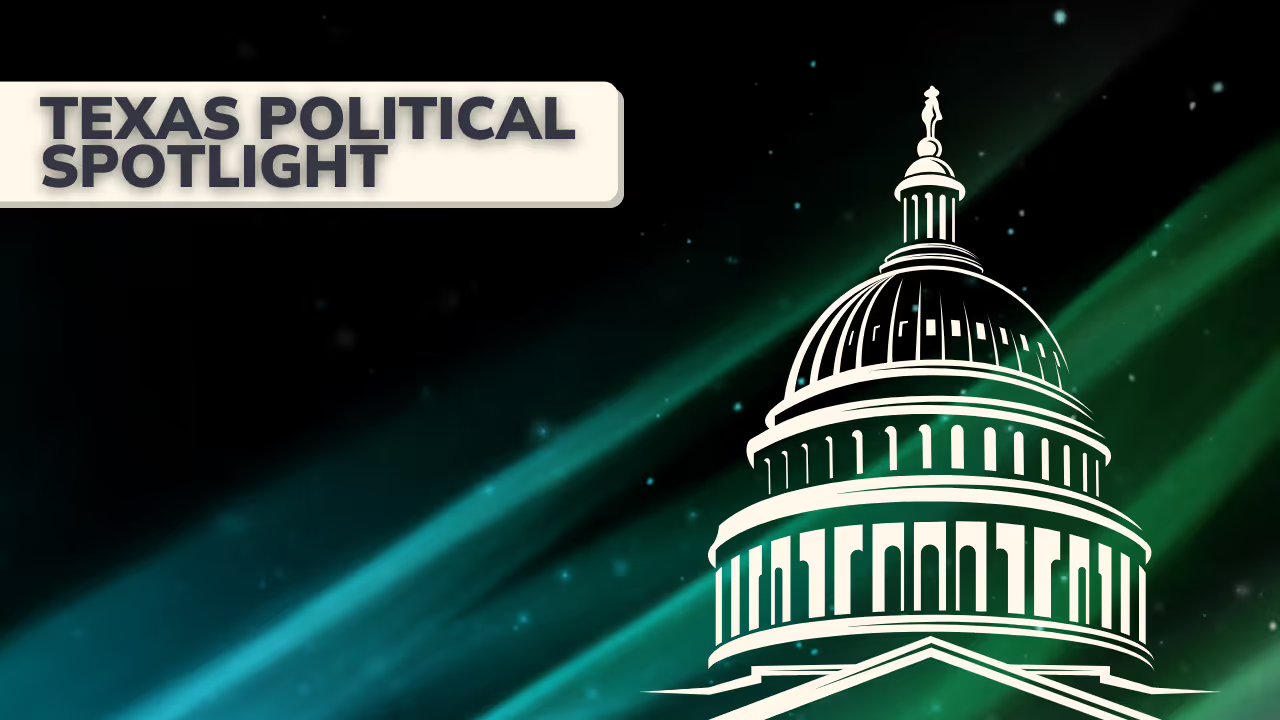
Texas Political Spotlight
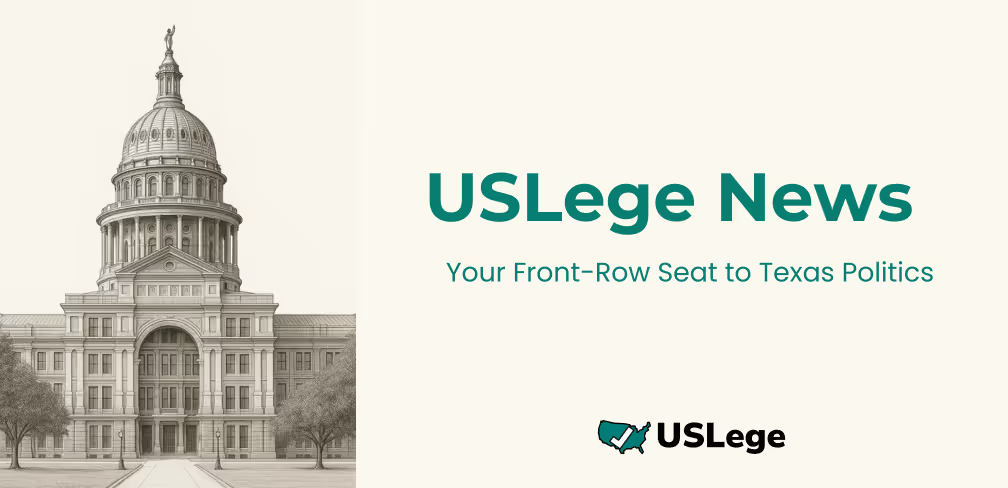
Welcome back friends,
Texas Sen. José Menéndez is defending a 2023 law that lets cities like San Antonio reinvest state tourism and hotel tax revenue into major projects, including a proposed $1.3 billion Spurs arena, saying it keeps the city competitive with others that have used similar funding to spur growth. Democratic U.S. Senate candidate James Talarico, speaking in Fort Worth recently, cast himself as an independent voice challenging both parties and billionaires’ influence, as his tight primary race with Colin Allred gains national attention. Meanwhile, Attorney General Ken Paxton has sued Indiana resident Malcolm Tanner, accusing him of trying to take over Loving County by luring out-of-state residents with false promises of free homes in unsafe desert conditions.
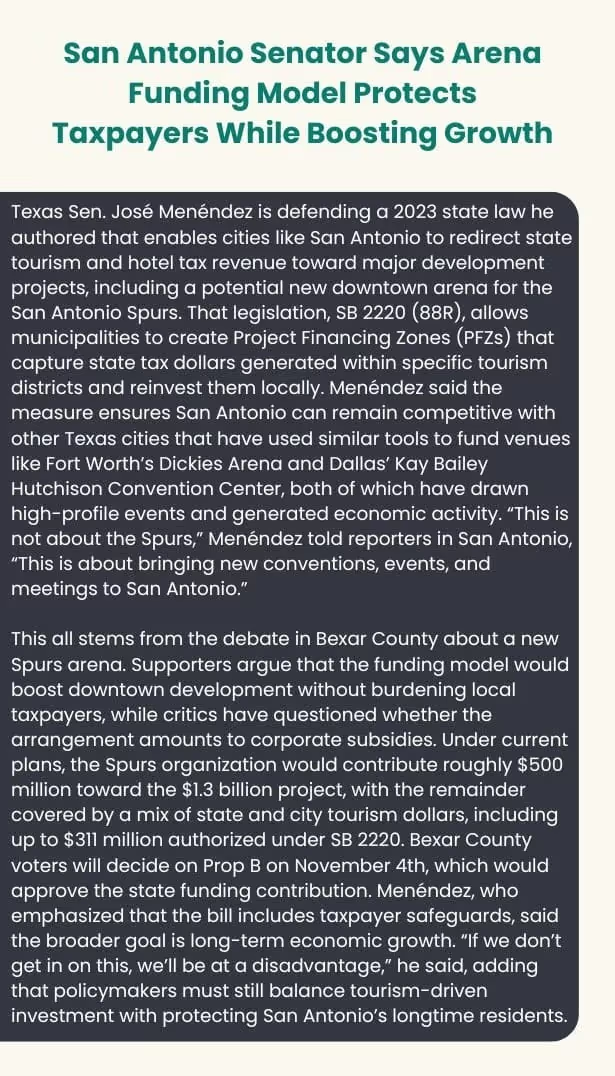
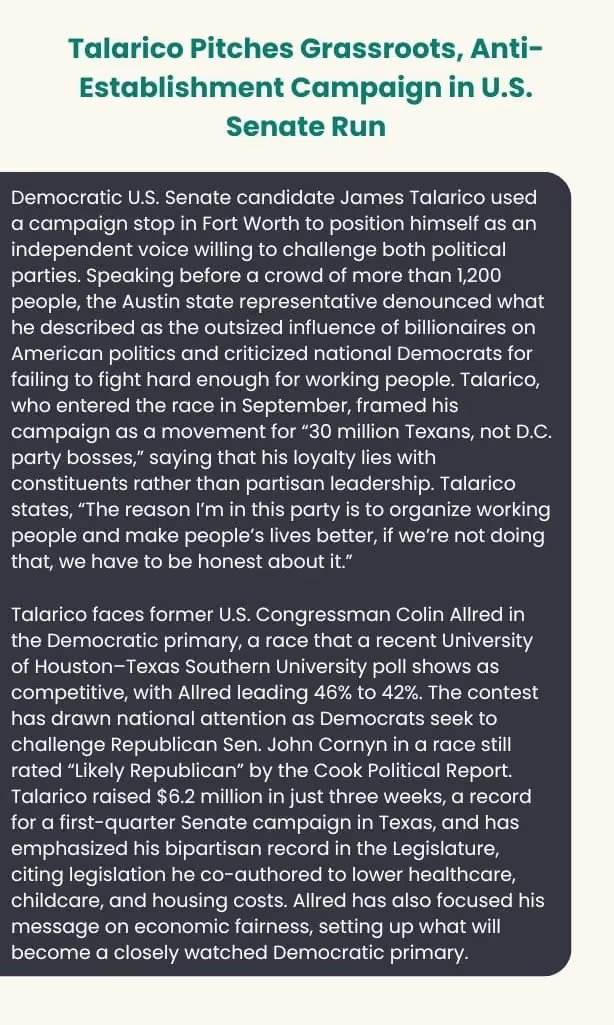
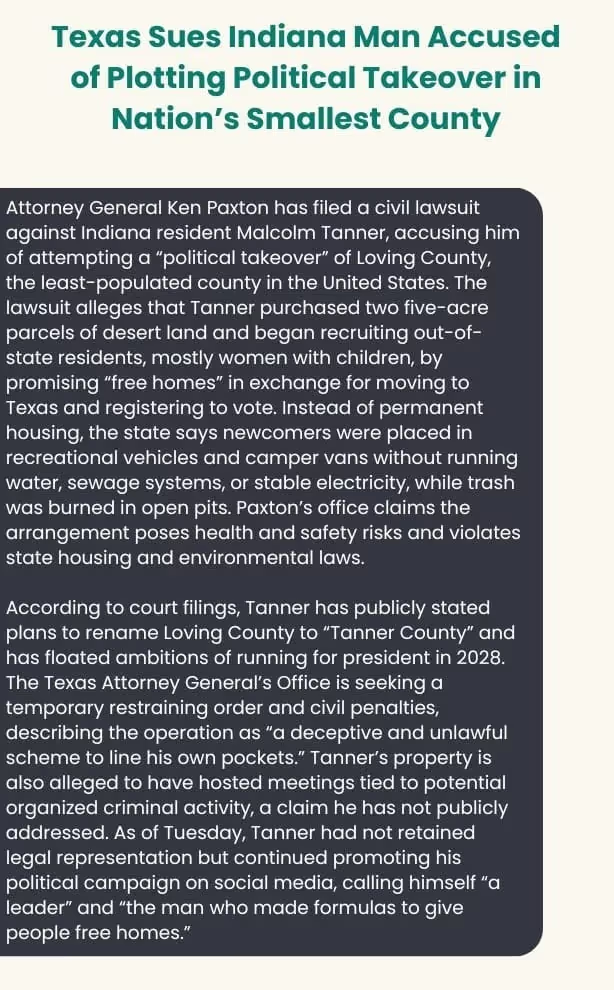
We hope you enjoyed today’s read!
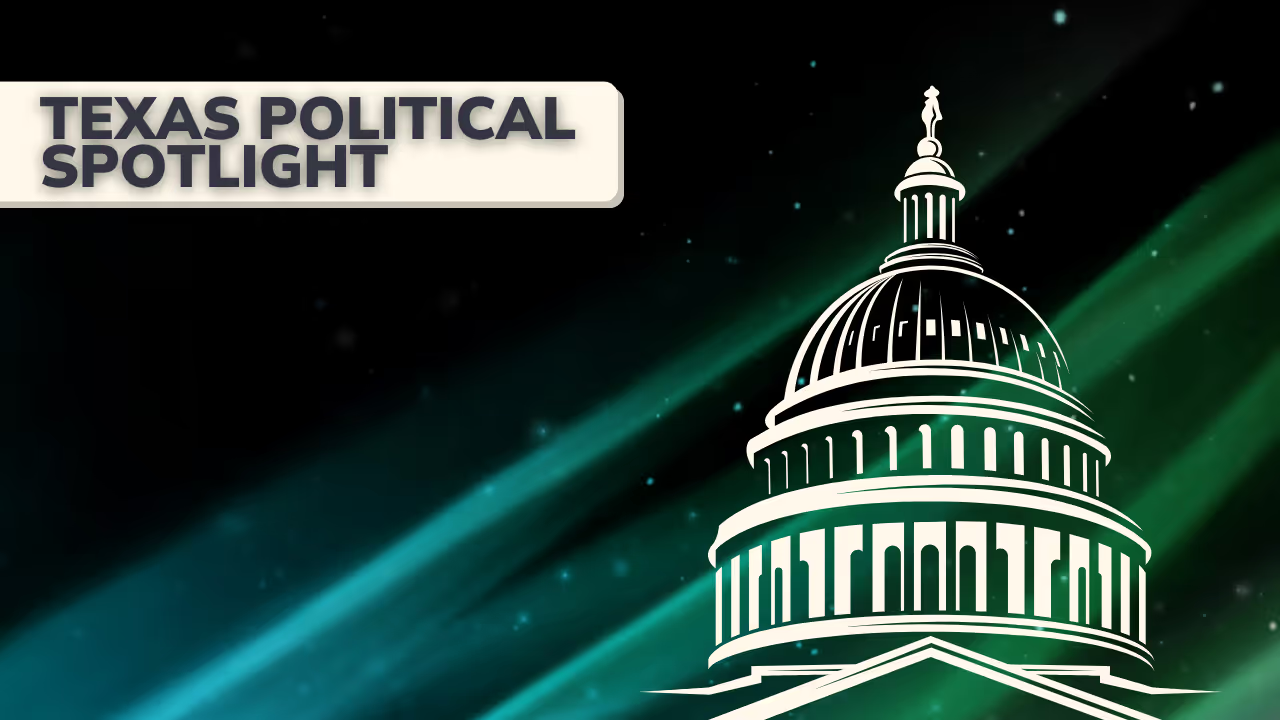
Texas Political Spotlight
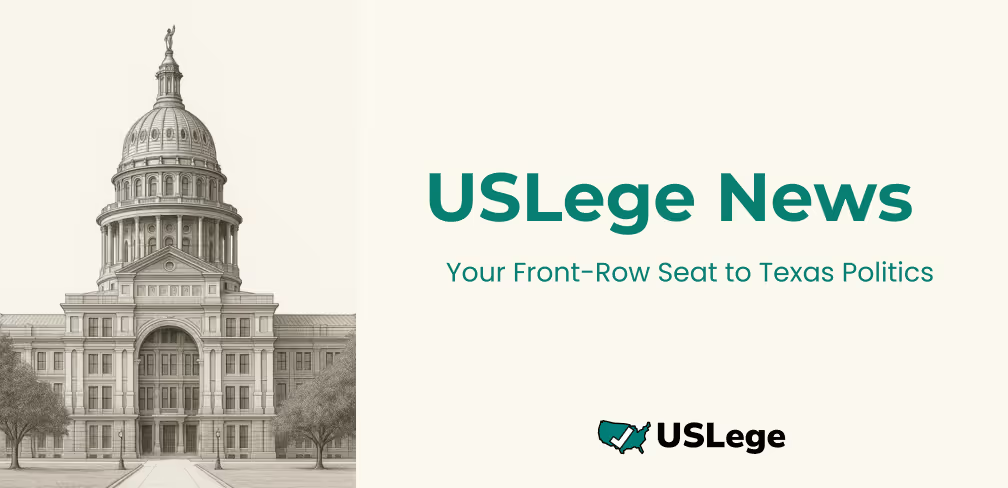
Welcome back, friends
Austin-based energy startup Base Power announced it has raised $1 billion in new funding to expand its residential battery leasing business, positioning itself at the center of Texas’ fast-growing clean energy sector as demand surges nationwide. Meanwhile, Gov. Greg Abbott has authorized hundreds of Texas National Guard soldiers have been deployed to Illinois to assist federal immigration authorities in Chicago. And in education, Texas selected Odyssey, a national tech firm, to design and administer its new $1 billion school voucher program, the Texas Education Freedom Accounts.

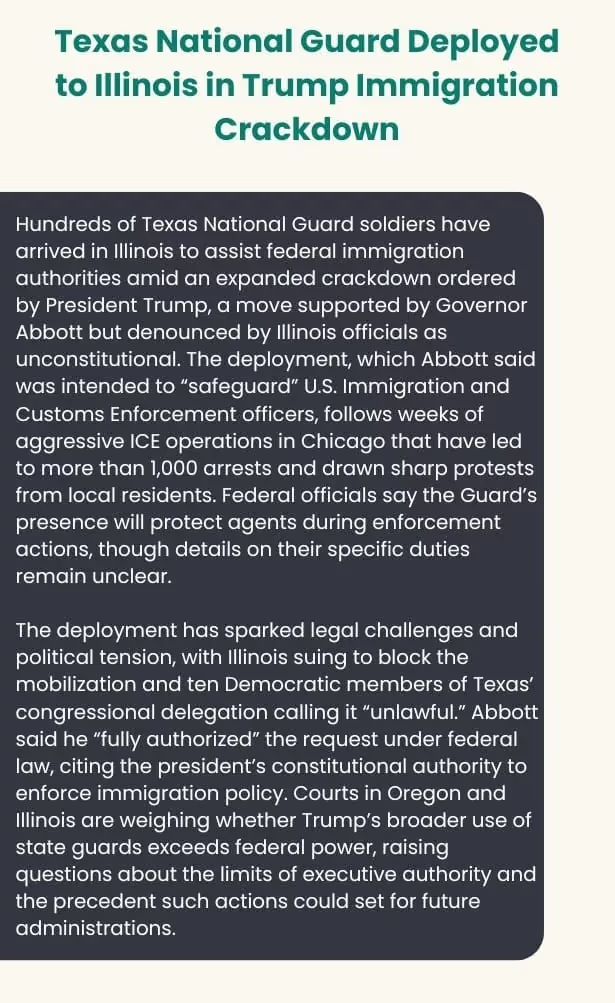
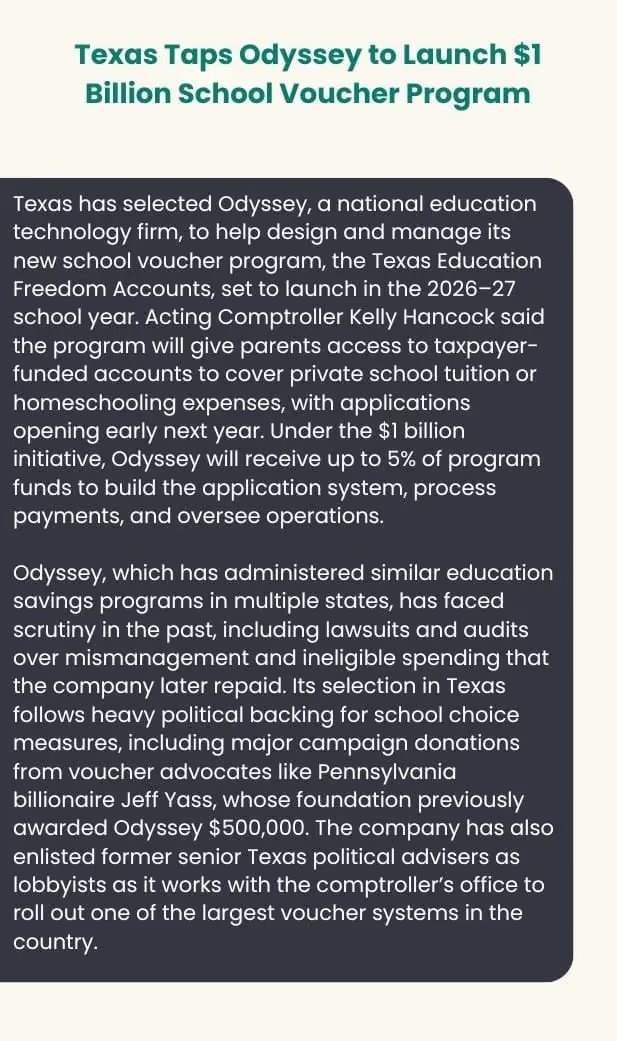
We hope you enjoyed today’s read!

Texas Political Spotlight

Welcome back, friends
A three-judge federal panel in El Paso will open hearings Oct. 1 to decide whether Texas’ new congressional maps unlawfully dilute minority voting power. At the same time, the Texas Department of Public Safety announced it will stop issuing or renewing commercial driver’s licenses for DACA recipients, refugees, and asylum holders under a new federal directive. Lastly, Governor Abbott unveiled a $562 million low-interest loan from the Texas Energy Fund to NRG Energy, the largest awarded so far, to expand natural gas generation at Baytown’s Cedar Bayou station and help meet the state’s growing power demands.
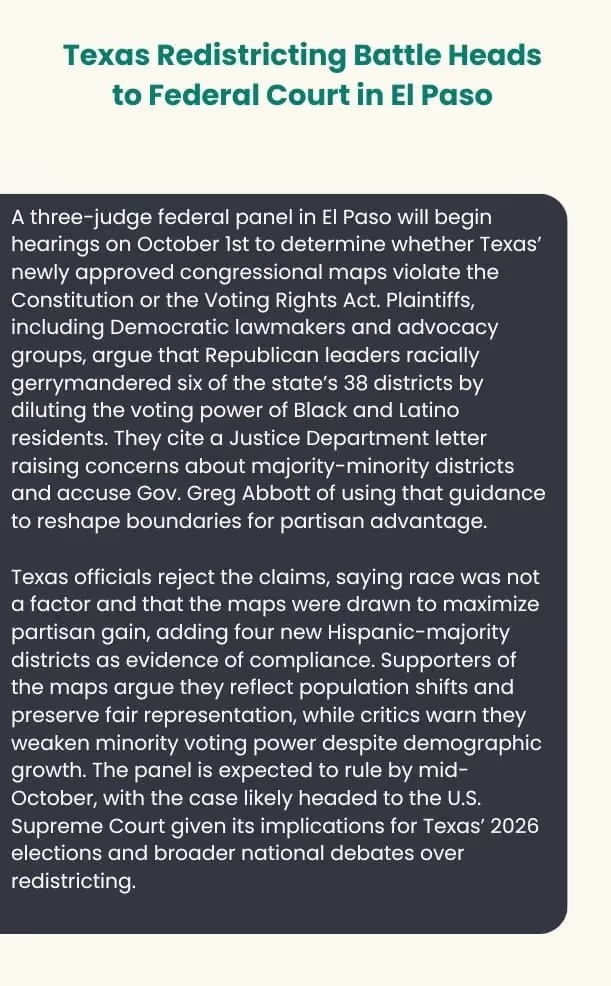
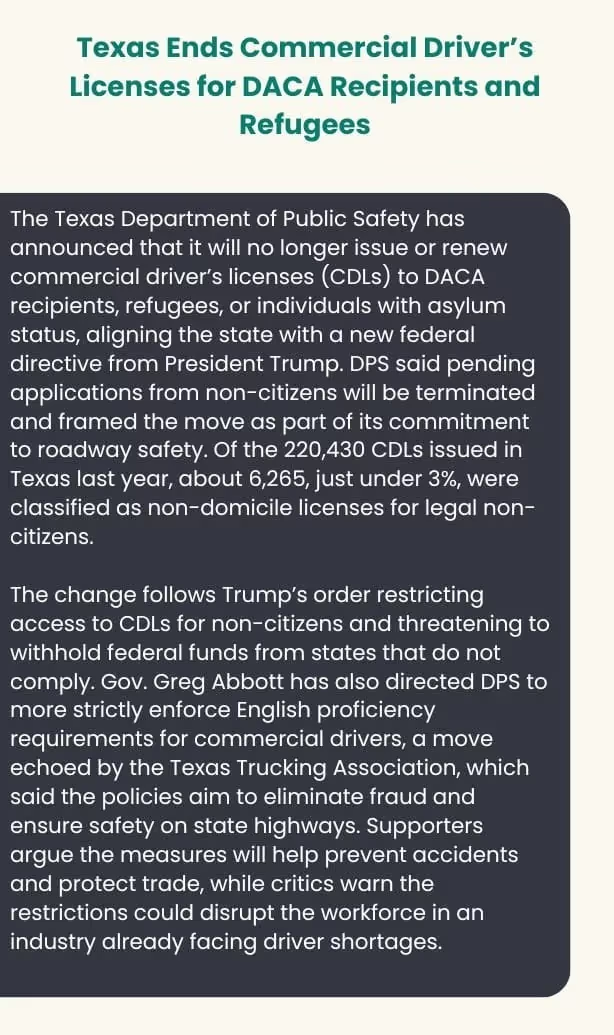
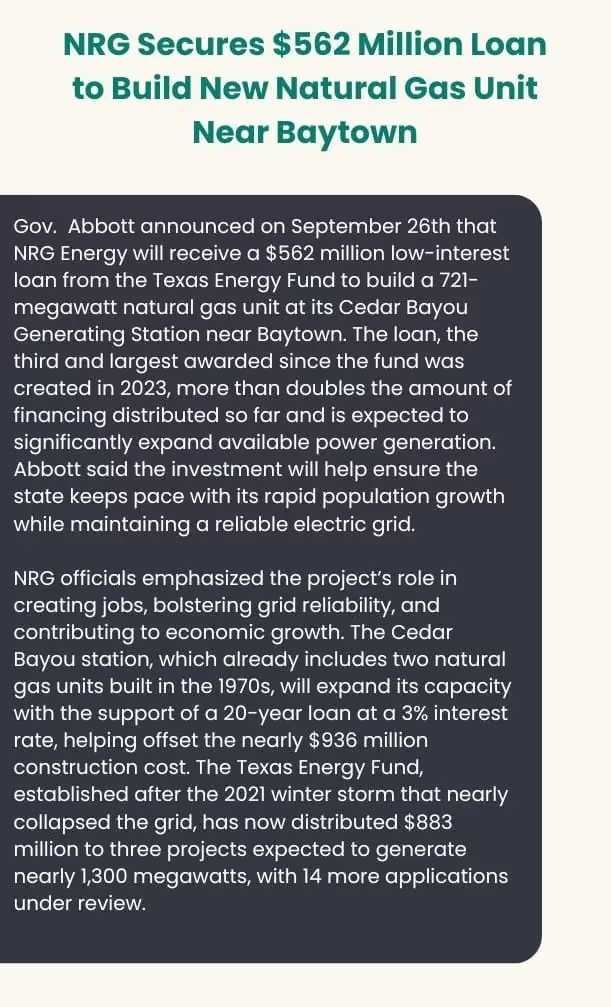
We hope you enjoyed today’s read!
Stay connected with TXLege News on X and LinkedIn!

Texas Political Spotlight

Welcome back, friends
Huston-Tillotson University will receive a record-breaking $150 million donation from the Moody Foundation, the largest gift ever to a single HBCU, to expand student housing, upgrade campus facilities, and increase scholarships as the Austin institution celebrates its 150th anniversary. Gov. Greg Abbott also signed HB 25, making Texas the fifth state to allow over-the-counter sales of ivermectin. On the same note, Abbott also signed HB 8 to replace the STAAR exam with three shorter assessments starting in 2027, a change aimed at reducing stress, providing faster feedback, and giving teachers more tools to support student learning.
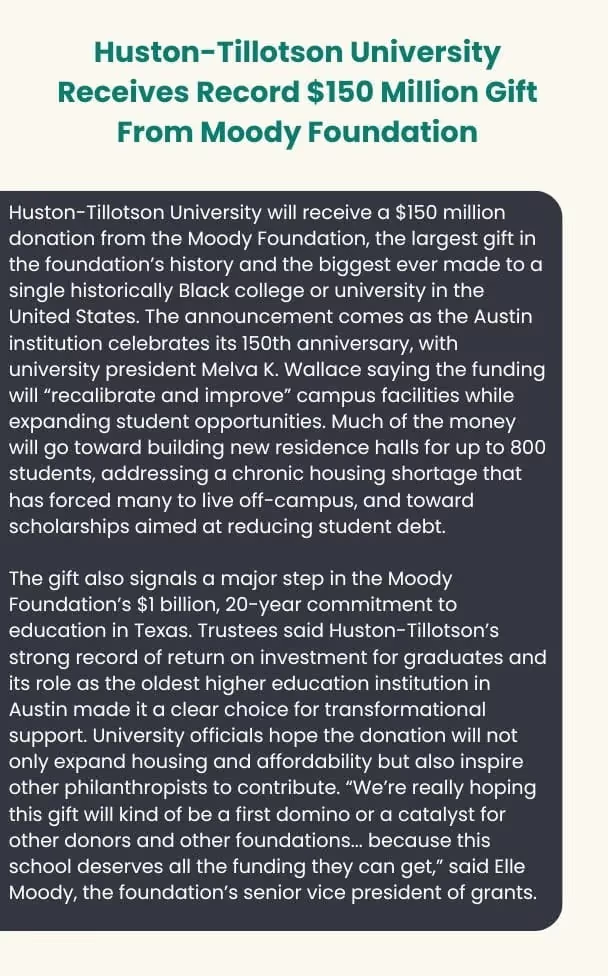
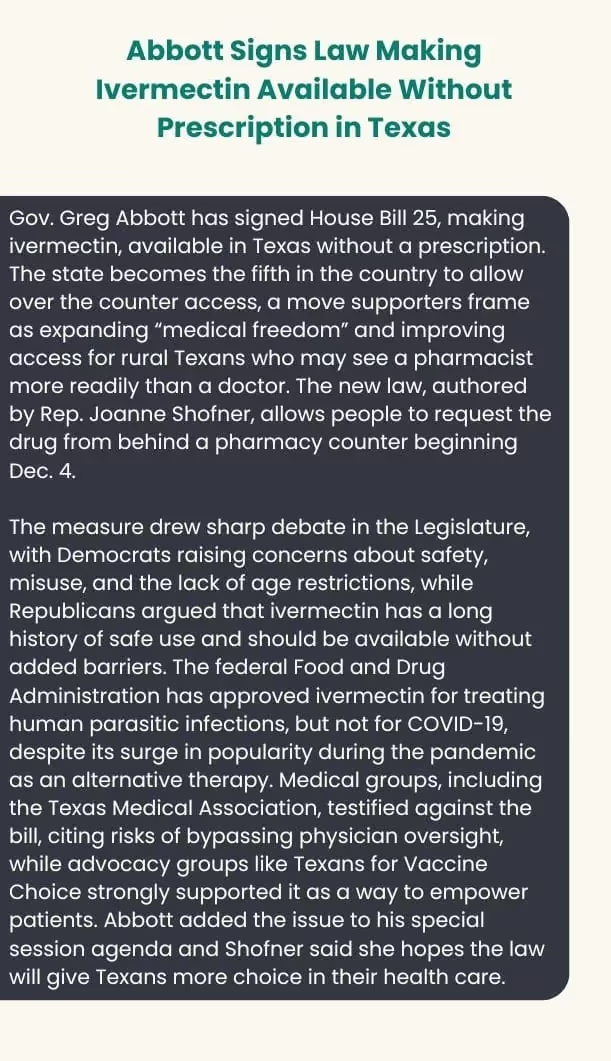
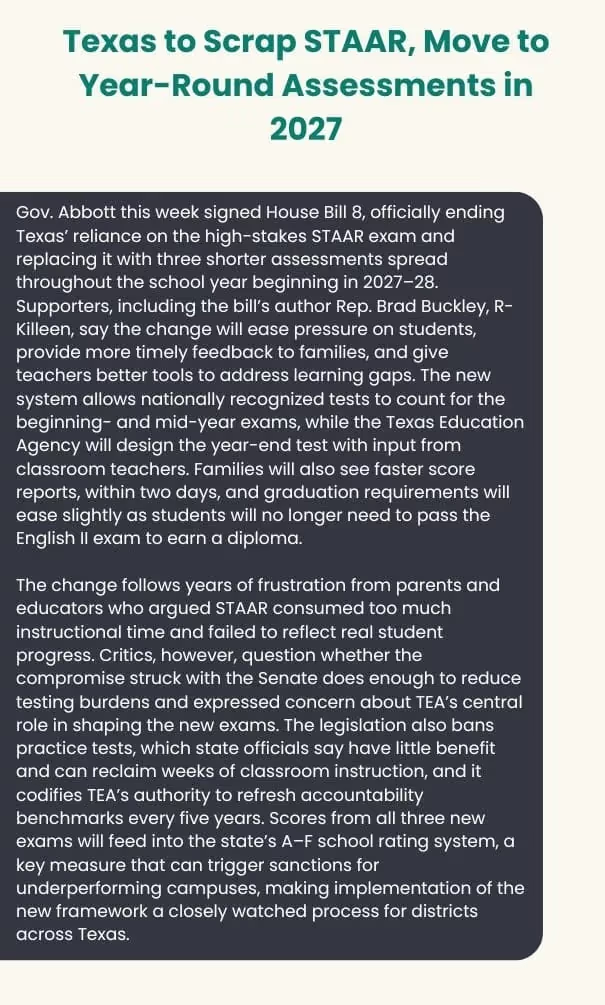
The USLege 2025 Best in Government Affairs Awards (Texas) celebrate the behind-the-scenes pros: staffers, lobbyists, association leaders, and firms who power late nights and early mornings in the Capitol!
Winners will be spotlighted on our 2025 webpage, receive a custom award badge + digital toolkit, and get promotion to 12k+ policy leaders and media partners. Nominations close October 2 - don’t miss the chance to recognize your peers!
Nominate someone today: https://uslege.involve.me/best-in-gov

Texas Political Spotlight

Welcome back, friends
Texas is cracking down on nearly 180 complaints against teachers accused of inappropriate online comments after activist Charlie Kirk’s death, igniting a fight between free speech advocates and state leaders. At the same time, Harris County Judge Lina Hidalgo’s decision not to seek reelection sets up a major political shakeup in Texas’ largest county.
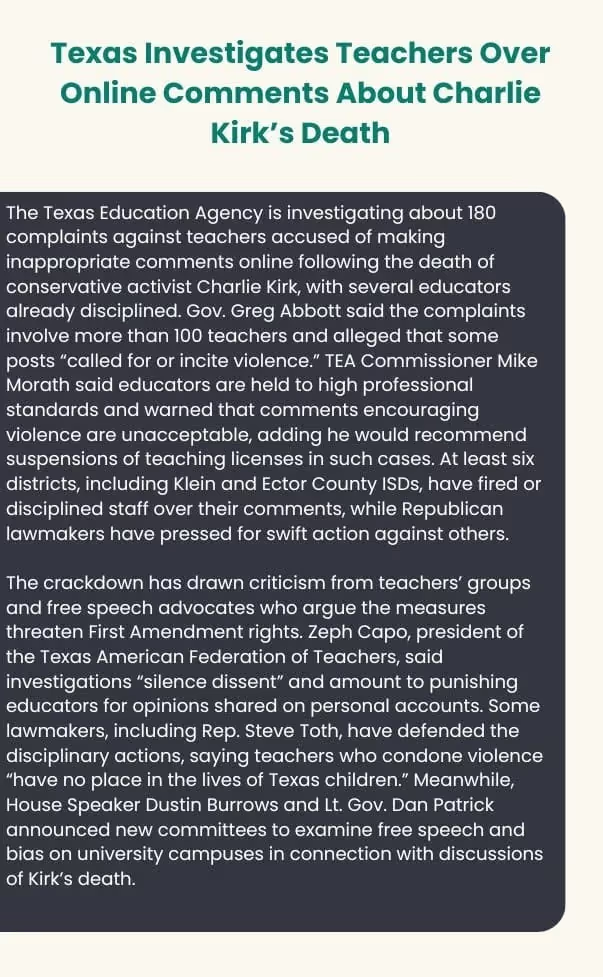
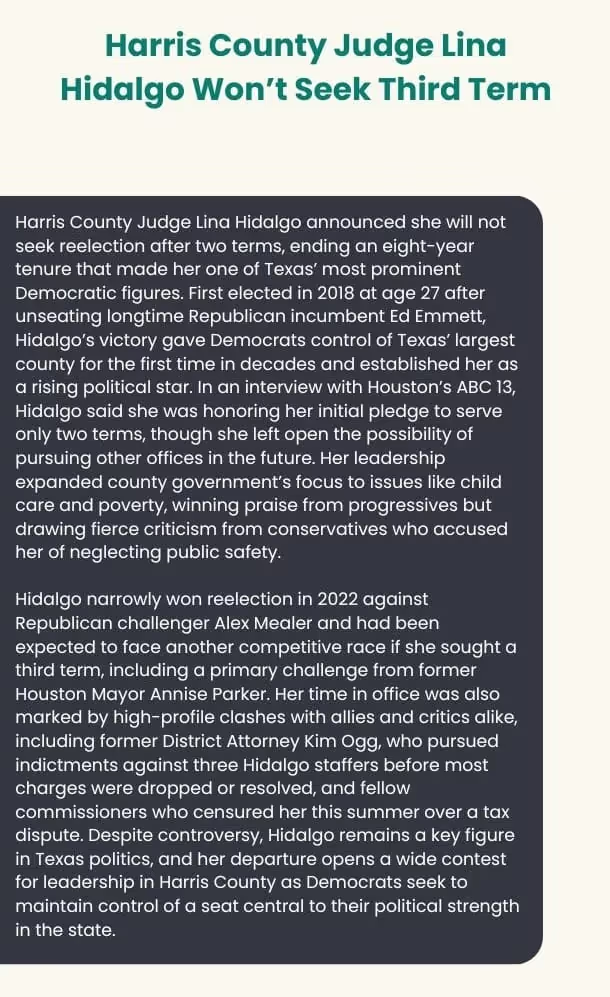
The USLege 2025 Best in Government Affairs Awards (Texas) celebrate the behind-the-scenes pros: staffers, lobbyists, association leaders, and firms who power late nights and early mornings in the Capitol!
Winners will be spotlighted on our 2025 webpage, receive a custom award badge + digital toolkit, and get promotion to 12k+ policy leaders and media partners. Nominations close October 2 - don’t miss the chance to recognize your peers!
Nominate someone today: https://uslege.involve.me/best-in-gov

Texas Political Spotlight

Welcome back, friends
Gov. Greg Abbott is preparing an executive order that would impose new statewide rules on THC sales, including a minimum purchase age of 21, after lawmakers failed to agree on a ban during the latest special session. At the same time, Texas Rep. James Talarico has launched his campaign for U.S. Senate, bringing his blend of progressive politics and faith-driven messaging into a crowded Democratic primary that already includes former Rep. Colin Allred and former astronaut Terry Virts. And in a separate development, New York Attorney General Letitia James has stepped into a legal fight with Texas over abortion pills, a clash over shield laws that experts say could ultimately reach the U.S. Supreme Court.
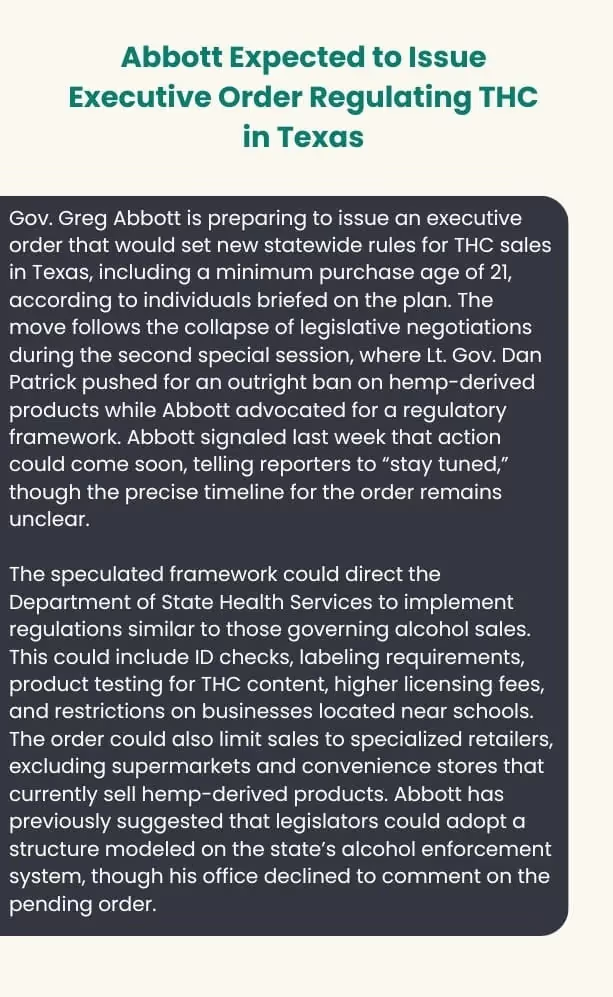
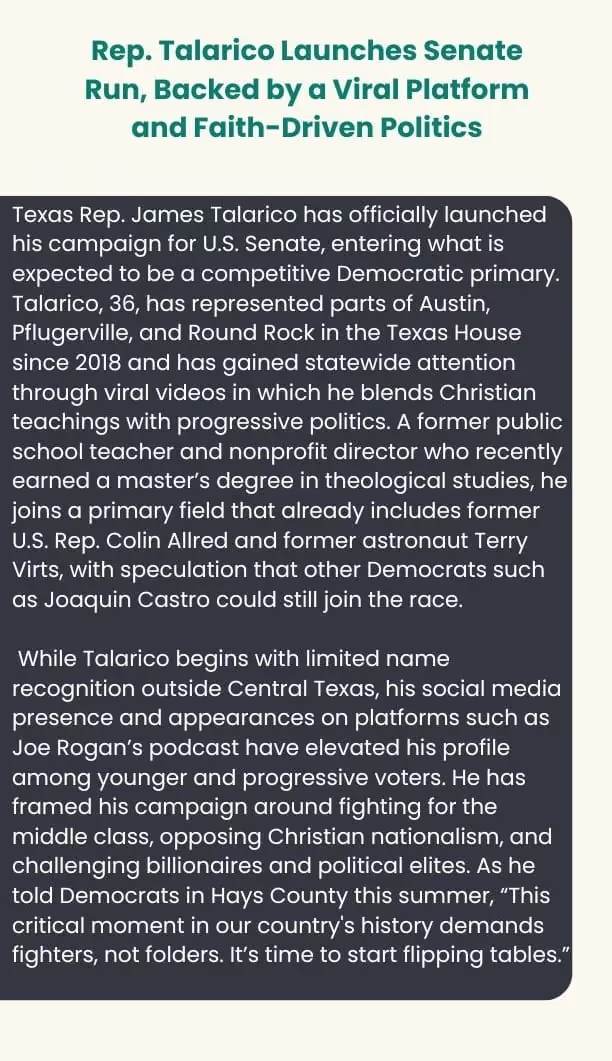
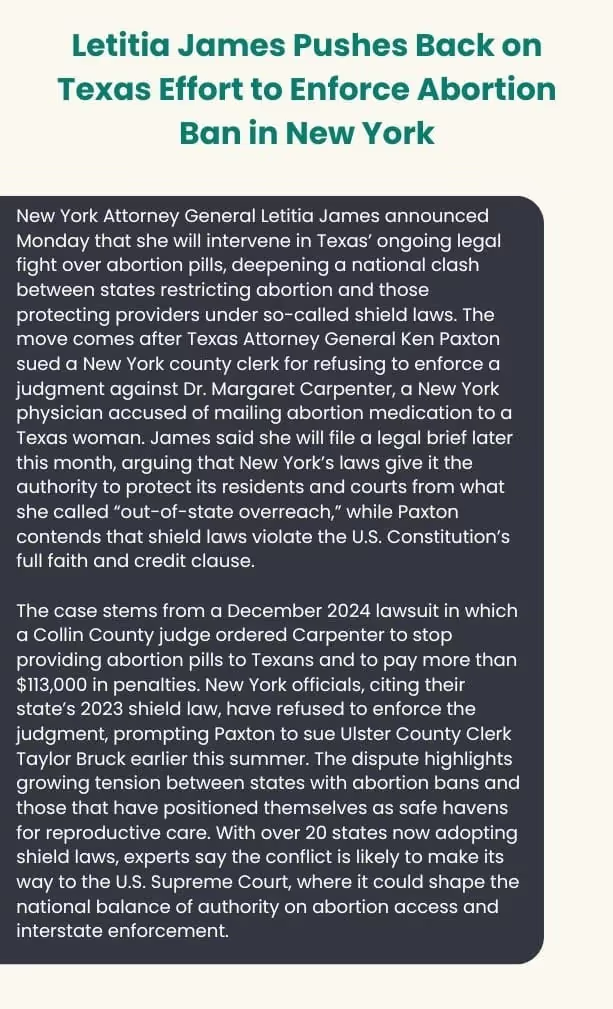
The USLege 2025 Best in Government Affairs Awards (Texas) celebrate the behind-the-scenes pros: staffers, lobbyists, association leaders, and firms who power late nights and early mornings in the Capitol!
Winners will be spotlighted on our 2025 webpage, receive a custom award badge + digital toolkit, and get promotion to 12k+ policy leaders and media partners. Nominations close October 2 - don’t miss the chance to recognize your peers!
Nominate someone today: https://uslege.involve.me/best-in-gov

Texas Political Spotlight

Welcome back, friends
Texas lawmakers ended their second special session without passing a ban on hemp-derived THC products, leaving most consumable cannabinoids legal as divisions persisted among Republican leaders over prohibition versus regulation. A simultaneous push to tighten limits on local property tax growth also failed after the House and Senate deadlocked on how far to extend new restrictions. Before adjourning, however, legislators approved House Bill 7, allowing private citizens to sue those who distribute abortion medication, a measure supporters frame as combating trafficking but critics warn could punish families and restrict access to care.
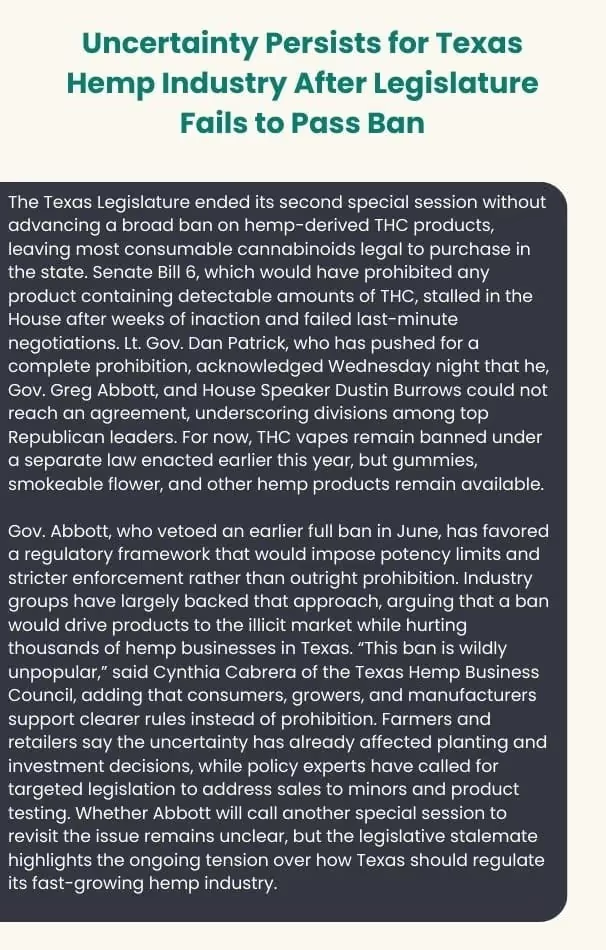
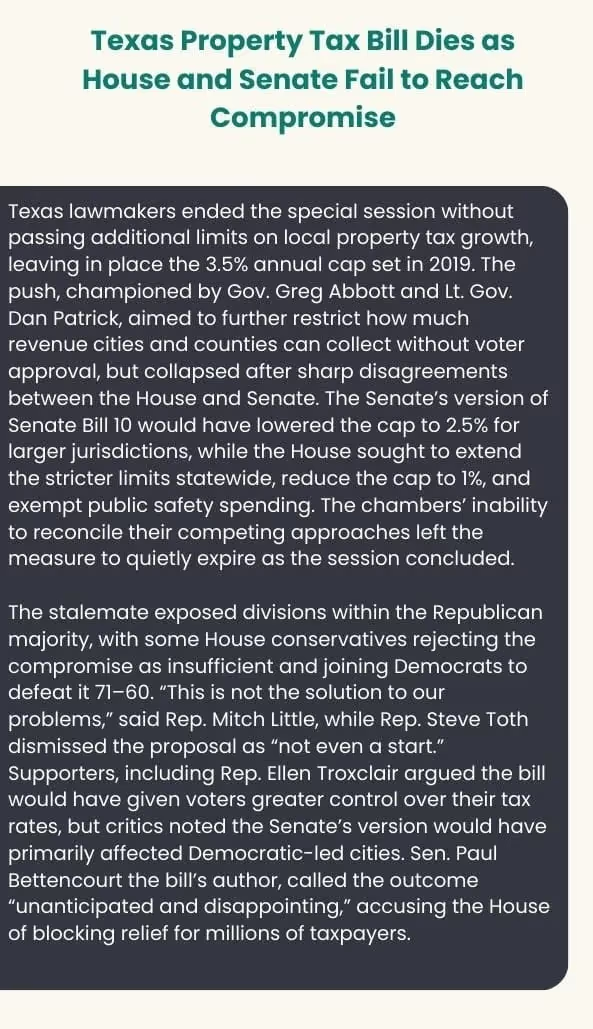
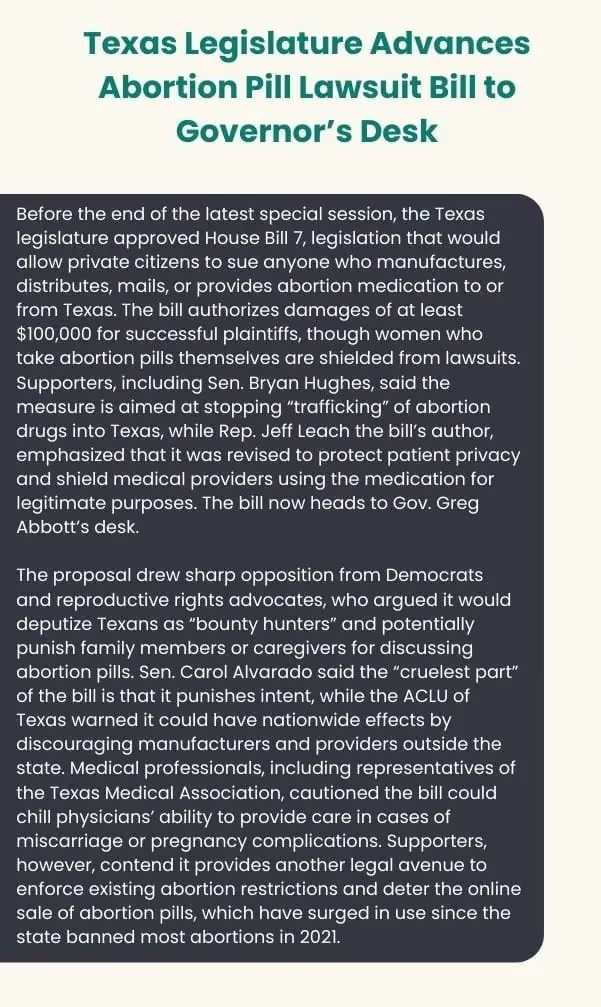
We hope you enjoyed today’s read!

Texas Political Spotlight

Welcome back, friends
Sen. Brandon Creighton is poised to become the next chancellor of the Texas Tech University System. At the same time, Texas has enacted a new law banning the sale of THC and hemp-derived vapes. Meanwhile, election officials in Collin, Williamson, and Bastrop counties are preparing to switch from touchscreen ballot-marking machines to hand-marked paper ballots this November, a shift they say will build voter confidence.
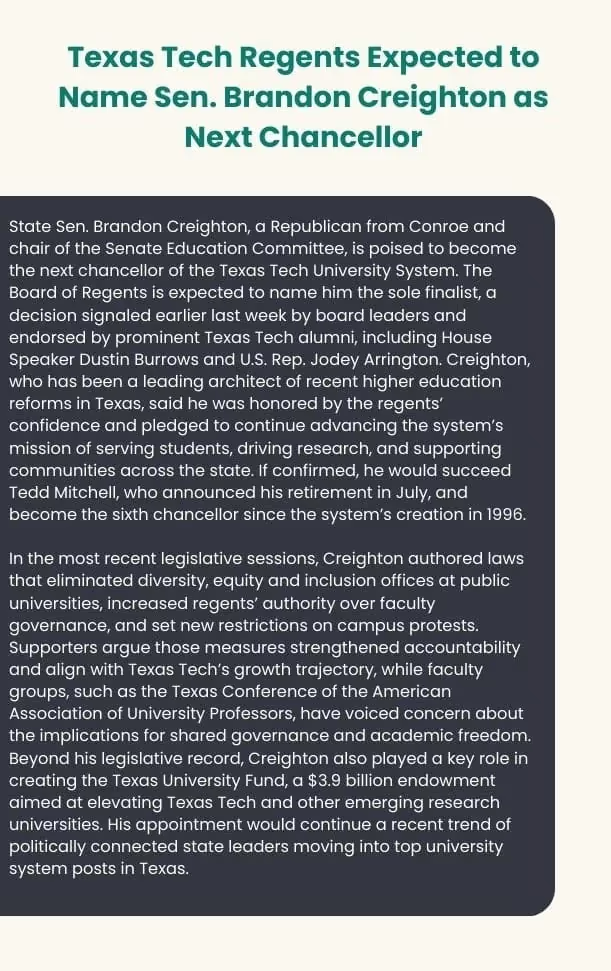
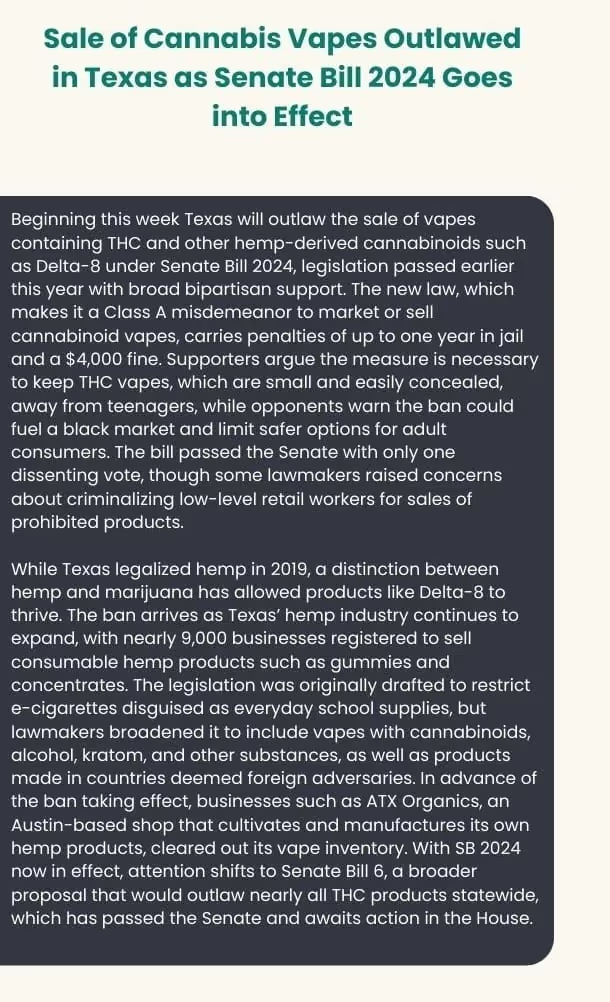
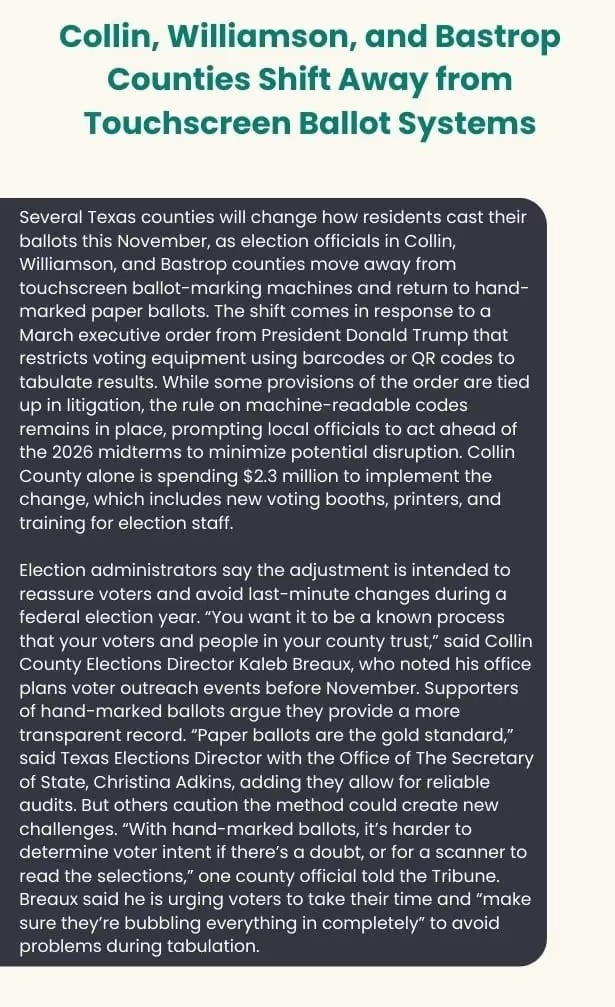
We hope you enjoyed today’s read!

Texas Political Spotlight

Welcome back, friends
The Texas House approved SB 12, a bill that would expand Attorney General Ken Paxton’s authority to prosecute election crimes. In other news, the San Antonio City Council narrowly backed a $489 million city commitment toward a new $1.3 billion Spurs development, including a new arena, despite calls for more independent analysis, framing the project as the centerpiece of a downtown sports and entertainment district. Lastly, former U.S. Rep. Mayra Flores announced she will run again in Texas’ 34th Congressional District under newly redrawn maps, setting up a 2026 rematch with Rep. Vicente Gonzalez in one of the state’s most competitive seats.
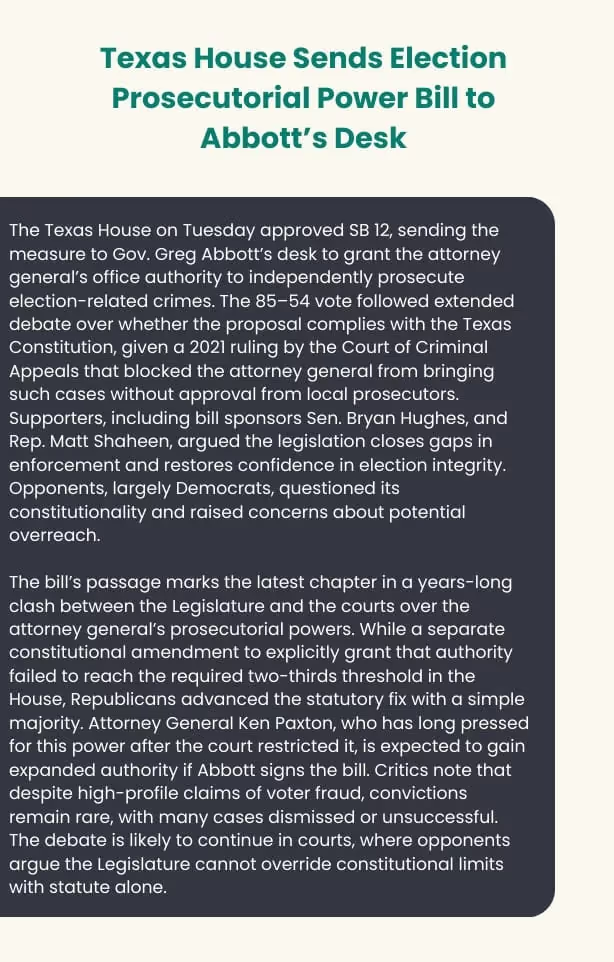
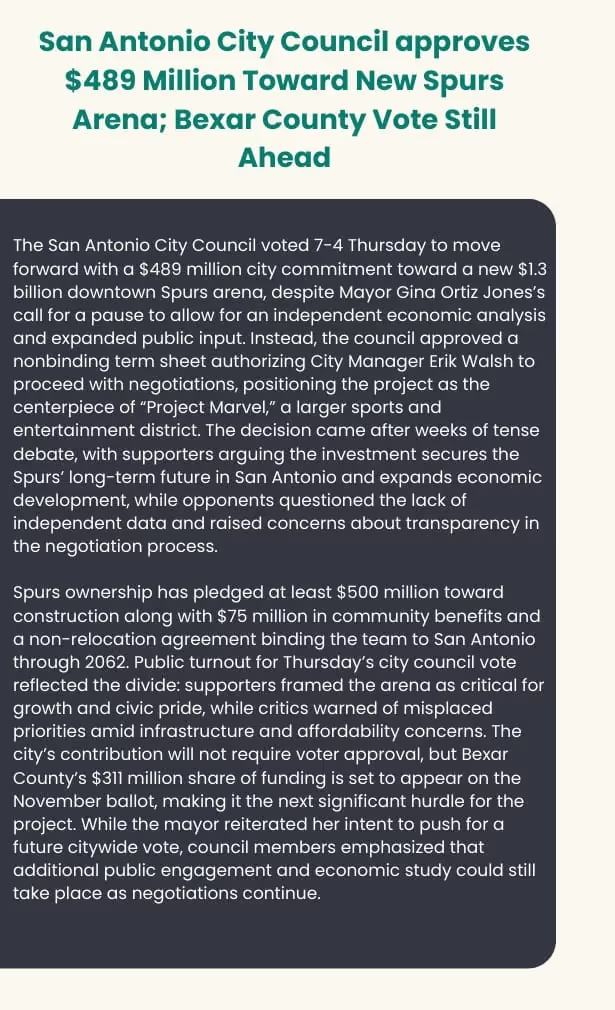
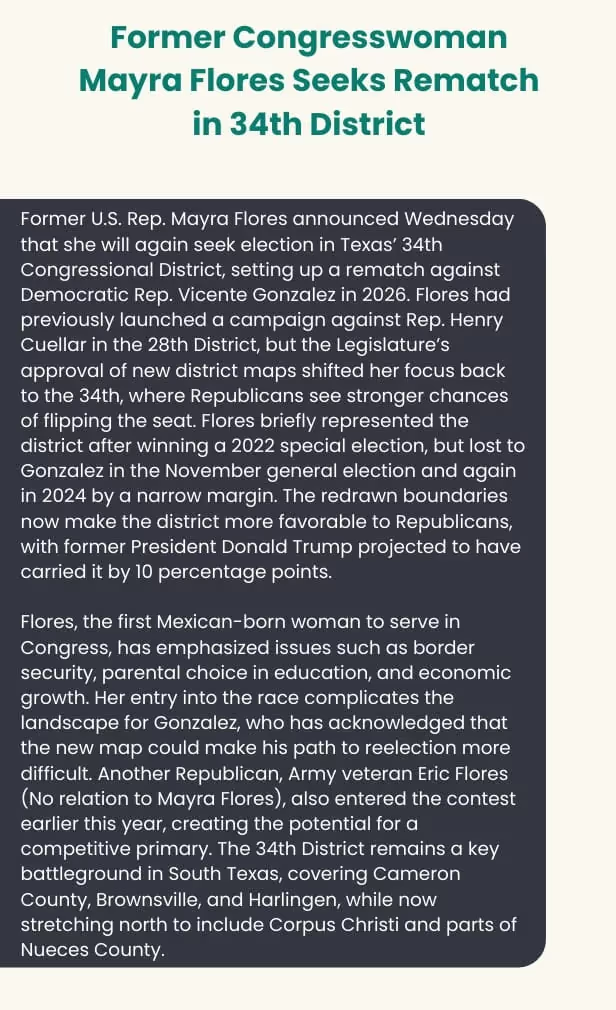
We hope you enjoyed today’s read!

Texas Political Spotlight

Welcome back, friends
Texas politics is in flux as Rep. Lloyd Doggett, the state’s longest-serving congressman, says he won’t seek reelection under a new GOP-drawn map. At the same time, lawmakers are rushing to respond to the deadly Hill Country floods with hundreds of millions in aid and private donations. And in the GOP, the race for attorney general is shaping up into a high-stakes fight between allies of Ken Paxton and Ted Cruz.
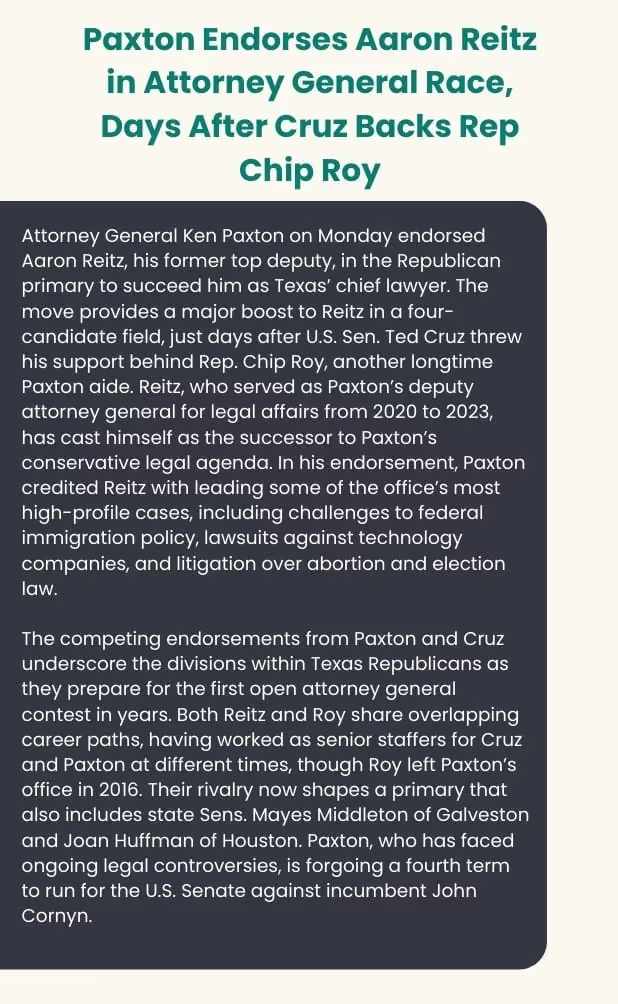
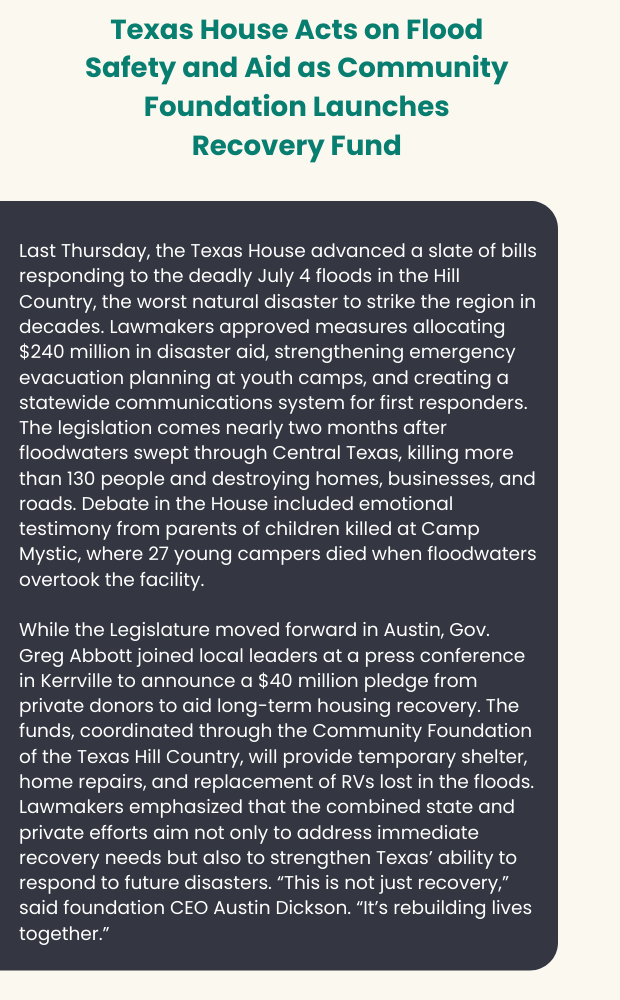
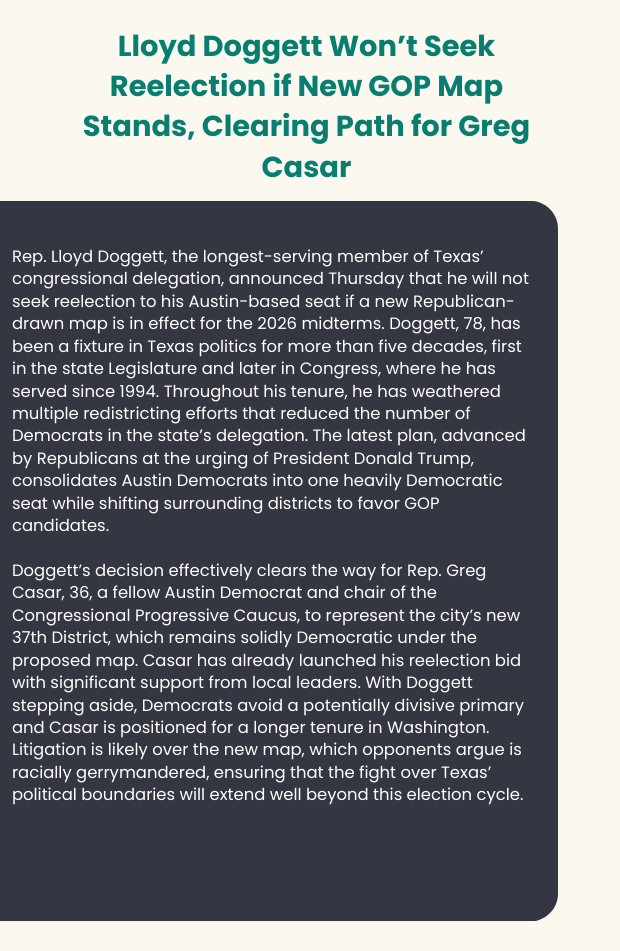
We hope you enjoyed today’s read!

Texas Political Spotlight - Introducing USLege News

Welcome to USLege News.
We’re refreshing the look and feel of our articles, so you may notice some formatting changes along the way. We still plan to bring you the top stories in Texas state and local politics to keep you informed and in the loop on what’s happening each week. Thanks for reading and being part of our community.
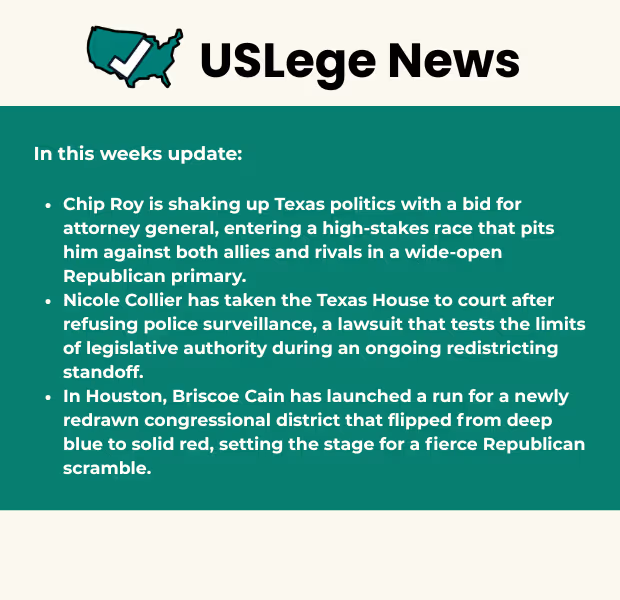
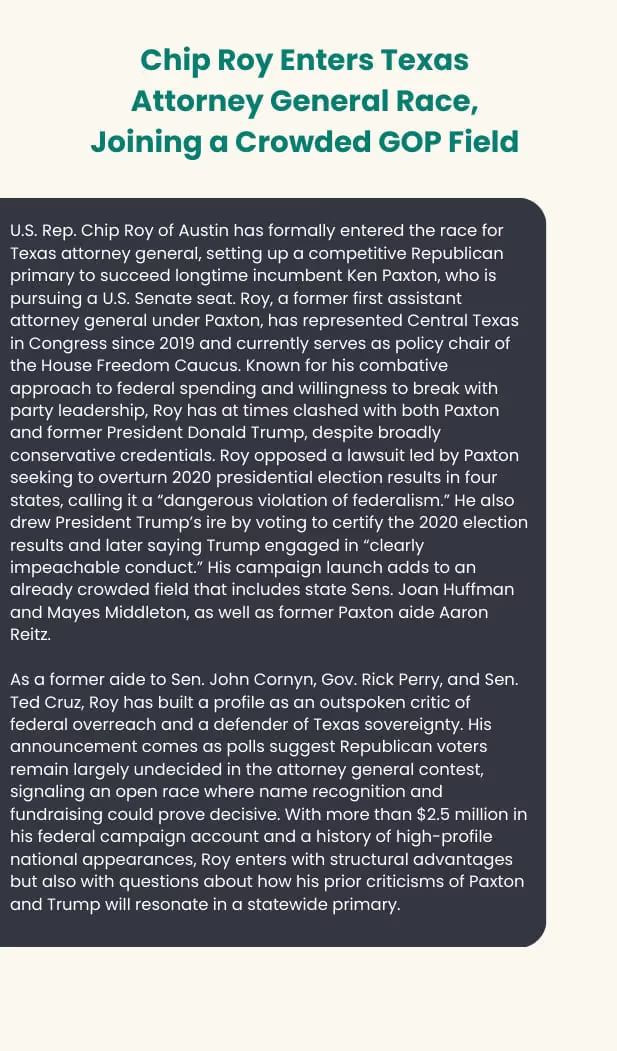


We hope you enjoyed today’s read!

Texas Political Spotlight

In solidarity with the Texas Hill Country, please visit TXBiz News’ page to see ways to support our state through this hardship: Hill Country Flood Relief
Welcome back, friends
Governor Abbott has called a high-stakes special session packed with issues ranging from flood response to redistricting, abortion, and THC regulation, just weeks after deadly storms swept Central Texas. Meanwhile, Sen. Angela Paxton announced her divorce from Attorney General Ken Paxton amidst a heated US Senate GOP primary. Lastly, in Boca Chica, SpaceX’s newest project is drawing attention from environmental advocates worried about its impact on coastal dunes.
Today’s Insights:
- Governor Abbott Officially Sets Special Session Agenda
- Sen. Angela Paxton Announces Divorce from Attorney General Ken Paxton Amidst Heated US Senate GOP Primary
- Space X Set To Build Liquid Oxygen Plant in South Texas
Governor Abbott Officially Sets Special Session Agenda
Governor Greg Abbott has called Texas lawmakers back to Austin for a July 21 special session with an 18-item agenda including issues such as natural disaster preparedness, abortion restrictions, THC regulation, and congressional redistricting. The top four items address the catastrophic flooding across Central Texas that left over 100 people dead and more than 160 still missing. Abbott is urging swift action to improve early warning systems and emergency communications, and to provide financial support for flood-impacted areas. “We must ensure better preparation for such events in the future,” the governor said while visiting Kerr County, one of the hardest-hit regions.
While flood response dominates the immediate urgency, the governor's agenda also reopens contentious debates that stalled during the regular session earlier this year. These include efforts to eliminate the STAAR test, limit abortion access, particularly regarding medical abortion, and regulate hemp-derived THC products without imposing a full ban. Abbott’s recent veto of a GOP-led THC ban signaled a more measured approach focused on potency limits potential regulation. At the same time, he is calling for legislation to “further protect unborn children and their mothers,” in what could become another high-profile ideological fight at the Capitol.
Perhaps the most politically consequential item is mid-decade redistricting. Abbott cites constitutional concerns raised by the U.S. Department of Justice, but critics, including Texas Democrats and advocacy groups, argue the effort is designed to redraw key districts in favor of Republicans ahead of the 2026 elections. Civil rights groups have also raised concerns about the inclusion of legislation to “protect women’s privacy in sex-segregated spaces,” interpreting it as a revival of what critics referred to as "bathroom bills". With lawmakers convening for up to 30 days, and the possibility of additional sessions, Texans can expect legislative action for a while.
Sen. Angela Paxton Announces Divorce from Attorney General Ken Paxton Amidst Heated US Senate GOP Primary
Sen. Angela Paxton announced Thursday she is filing for divorce from her husband, Attorney General Ken Paxton. In her statement, the McKinney Republican said she had “earnestly pursued reconciliation,” but that recent discoveries made continuing the marriage untenable. The couple have long been prominent figures in Texas politics, with Angela Paxton holding the Senate seat her husband once occupied. Ken Paxton attributed the separation to the “pressures of countless political attacks and public scrutiny.”
The announcement comes as Ken Paxton mounts a high-profile primary challenge against U.S. Sen. John Cornyn.
Space X Set To Build Liquid Oxygen Plant in South Texas
Cameron County commissioners have approved a construction permit allowing SpaceX to build an air separator facility near the sand dunes of Boca Chica Beach, a decision that has sparked environmental concerns among local residents. The facility—described as a compact industrial plant with 20 structures on 1.66 acres—will separate nitrogen and oxygen from the air to support rocket launches, reducing the need for over 200 truck deliveries per launch from Brownsville. Although SpaceX agreed to mitigation measures and shifting construction further inland to minimize dune disruption, critics remain skeptical, citing limited public input and concerns over the project's impact on vegetation and wildlife. The permit requires SpaceX to restore or replace any damaged dunes, with enforcement authority resting with the Texas General Land Office.
“I think that it’s clearly true today how the government of Cameron County is kind of falling over to please SpaceX”
We hope you enjoyed today’s read!
Stay connected with TXLege News on X and LinkedIn!
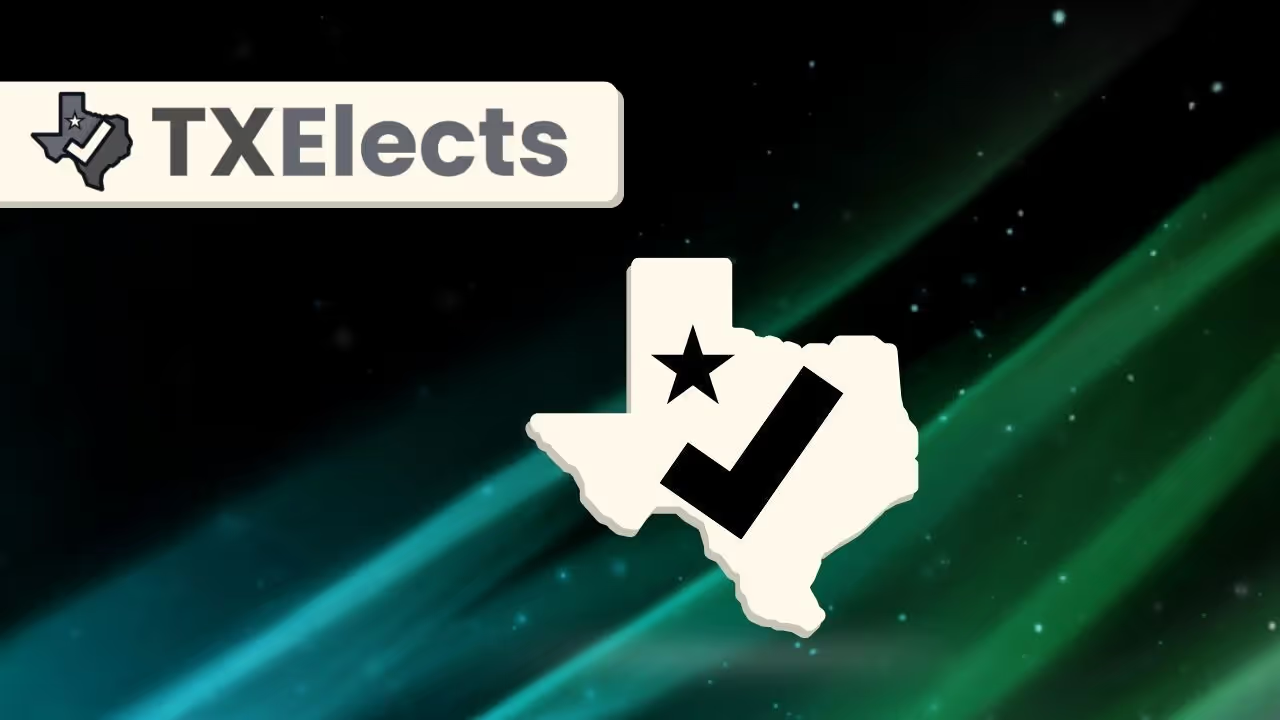
TXElects Election Updates
We bring you latest candidate filings, campaign finance information and more for all candidates running for statewide, legislative and congressional offices.
Senate Race In Monday’s Austin press conference on the 2-year anniversary of the Dobbs v. Jackson decision, Democrat Colin Allred included his wife Alexandra Eber as a featured speaker on abortion issues. Eber discussed challenges faced by pregnant women and said that “Politicians in Texas, like Ted Cruz, have done the unthinkable, which is to make it ever harder for women in those unthinkable moments.”
The Texas Politics Project’s June polling found that 45% of Texans believe abortion laws should be less strict, with 23% preferring no change, and 20% preferring stricter abortion laws.
Cruz leads Allred 45% to 34%, according to the Texas Politics Project’s June poll. Allred leads Cruz among Hispanic voters, 38% to 34%, while Cruz led 18-29 year olds 32% to 30%.
Speaker Race The Republican Party of Texas listed “No Democrat Chairs” as its fourth highest legislative priority in its recently released 2024 platform. Last regular session, Speaker Dade Phelan appointed 9 of the 37 House committee chairmanships to Democrats. Phelan defeated challenger David Covey by 366 votes in the runoff primary election and currently faces two challengers for the speakership: Rep. Shelby Slawson and Rep. Tom Oliverson.
Dade Phelan spending Speaker Dade Phelan made $5M in contributions to Texas House 2024 primary candidates and PACs. His largest 20 expenditures were:

Explore our databases and analysis tools for more election insights.
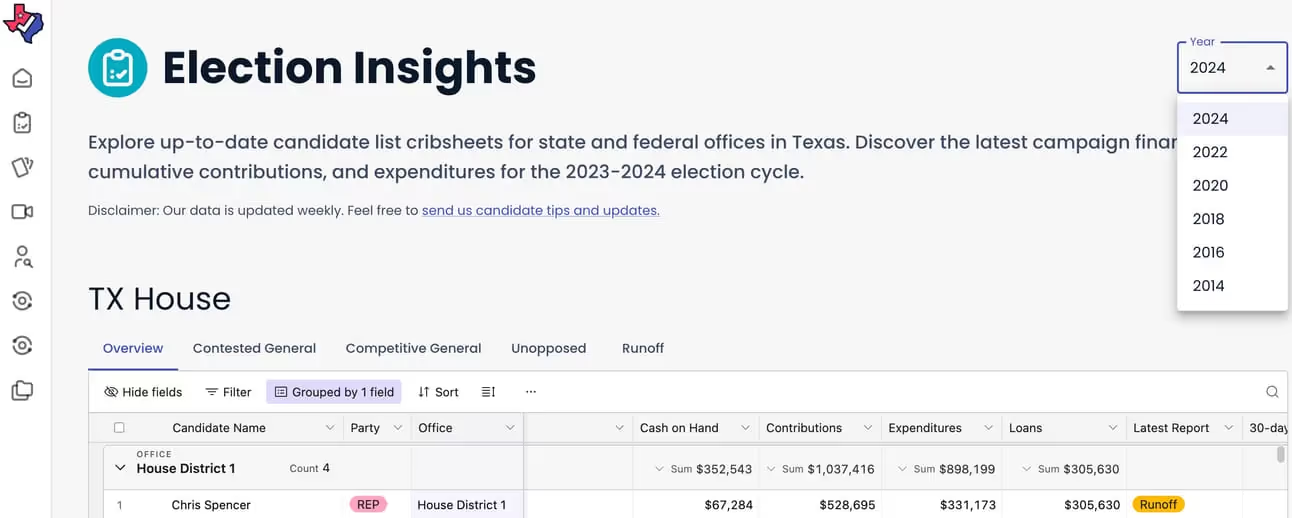

TXElects Election Updates
We bring you the latest candidate filings, campaign finance information and more for all candidates running for statewide, legislative and congressional offices.
Texas campaign spending
Texans for Lawsuit Reform PAC contributed at least $10M in total to Texas Legislature primary and runoff races. The top 20 expenditures were:
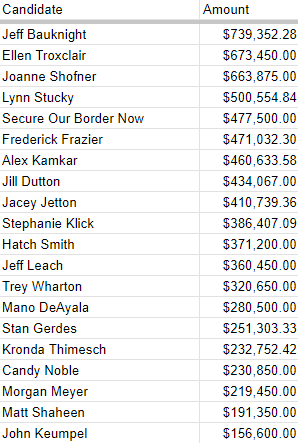
Texans United for a Conservative Majority contributed at least $7.7M in total to Texas Legislature primary and runoff races. The top 20 expenditures were:
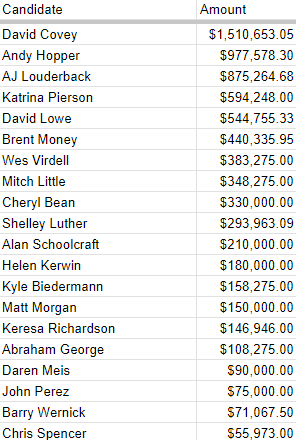
Gov. Greg Abbott spent nearly contributed almost $9M in total to Texas Legislature primary and runoff races. The top 20 expenditures were:
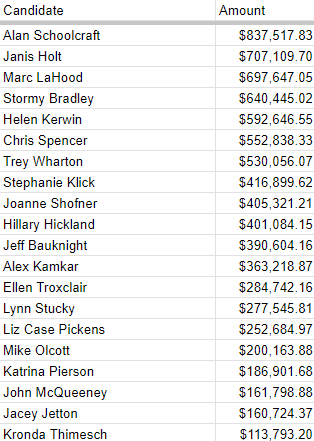
Senate Race
UT Tyler’s June 11-20 Texas Registered Voter Survey shows Sen. Ted Cruz leading Democrat challenger Colin Allred 43% to 39%. Respondents listed securing the border as the most important policy issue facing Texas, followed by inflation and reproductive rights.
HD 70
In a Dallas WFAA Inside Texas Politics interview, incumbent Democrat Rep. Mihaela Plesa responded to claims that her district is one of the likeliest to flip. “We do the work, they said that last cycle and we were out-funded 4 to 1 … and we won.” The interview also covers school choice, the Speaker race, IVF, grid infrastructure, and other issues.
Biden debate performance
The Texas Tribune reported on down-ballot discussions following President Biden’s debate performance last Thursday. Former Republican Congresswoman Mayra Flores, currently challenging incumbent Democratic Congressman Vicente Gonzalez, wrote in a text message that “Gonzalez has supported Joe Biden every step of the way … Now is not the time for feeble leadership from Biden or blind yes men like Gonzalez.”
Democratic State Rep. Ron Reynolds of Missouri City wrote on Instagram that he was “very disturbed” by the debate and supported the nomination of VP Kamala Harris in place of President Biden. Democratic Congressman Marc Veasey took an alternate stance, encouraging members to not “say anything that they will regret later before everybody’s had a chance to just kind of chill a little bit.”
Explore our databases and analysis tools for more election insights.


TXElects Election Updates
We bring you the latest candidate filings, campaign finance information and more for all candidates running for statewide, legislative and congressional offices.

Happy Independence Day! Today we honor the sacrifices of those who fought for our freedom.
HD 98
Over 90 Tarrant County Republicans wrote to incumbent Republican Rep. Giovanni Capriglione requesting his public opposition to electing a Speaker who supports Democratic chair appointments. Tarrant Country GOP Chair Bo French and former Chair Rick Barnes, along with many precinct chairs, school board members, and city council members were among the signatures. On May 31, 46 current or presumptive Texas GOP caucus members signed a similar letter committing to only voting for Speaker candidates who will only appoint Republican committee chairs.
Rep. Lloyd Doggett on Biden
Texas Congressman Lloyd Doggett became the first Congressional Democrat to call on President Biden to withdraw. He said in an interview, “I came back home and the responses I’ve been getting locally, not solicited from me necessarily, are about 10-1 in favor of him withdrawing.”
AdImpact Politics Projections
AdImpact’s 2023-24 Political Projections Report predicts $340M ad spending in Texas this election cycle out of $10.7B nationwide. California, Arizona, and Pennsylvania are projected to see the highest spending at $1.19B, $803M, and $800M.
Explore our databases and analysis tools for more election insights.


TXElects Election Updates
Welcome to TXElects Election Updates!
We bring you the latest candidate filings, campaign finance information and more for all candidates running for statewide, legislative and congressional offices.
We’re wishing all of you a safe week. Stay updated for the latest on Hurricane Beryl’s path and potential impacts.
Today’s News
HD 128
Republican Rep. Briscoe Cain discusses the Speaker race on Dallas’ WFAA Inside Texas Politics channel. “I don’t think Dade Phelan gets reelected at this point,” Cain said. “I think reform needs to come to the Texas House, and that includes the Speakership.”
Rep. Reynolds on Biden
Following President Biden’s debate with former President Trump, Democratic Convention delegate Rep. Ron Reynolds called for replacing Biden with VP Kamala Harris. “I was very disappointed and frightened,” Reynolds said. "We cannot afford four more years of former President Trump.” He anticipates that if Biden chooses not to step down, there would not be a floor fight at the Convention.
We work to provide comprehensive, concise Texas elections news to your inbox each week. Share the TXElects Newsletter with your friends with this link.
We welcome your feedback. Share any ideas or thoughts on our newsletter here!
Explore our databases and analysis tools for more election insights.

Interested in advertising in our newsletter or connecting with our audience? We’d love to discuss further. Contact us below to start.
Seeking impartial news? Meet 1440.
Every day, 3.5 million readers turn to 1440 for their factual news. We sift through 100+ sources to bring you a complete summary of politics, global events, business, and culture, all in a brief 5-minute email. Enjoy an impartial news experience.

TXElects Election Updates
Welcome to TXElects Election Updates!
We bring you the latest candidate filings, campaign finance information and more for all candidates running for statewide, legislative and congressional offices.
We’re wishing all of you a safe week. Stay updated for the latest on Hurricane Beryl’s path and potential impacts.
Today’s News
Allred on Biden
Allred also recently released an ad focused on border security. The ad features a Jan. 2024 Texas Tribune article titled “Colin Allred joins Republicans to condemn Biden’s handling of the Border.”
Senate campaign finance
Sen. Ted Cruz’s campaign announced that he raised over $12.6M in Q2 across all entities, the largest quarterly amount raised in his Senate history. The campaign said he will close out Q2 with over $22.1M cash on hand. Based on 16 polls compiled by The Hill, Cruz leads Allred 47.6% to 40.6%.
TX-23
Congressman Tony Gonzales raised over $1.7M in Q2, achieving the highest quarterly funds raised for a Republican in his district. The amount is over 2.5 times what he raised in Q2 of 2022.
We work to provide comprehensive, concise Texas elections news to your inbox each week. Share the TXElects Newsletter with your friends with this link.
Explore our databases and analysis tools for more election insights.

Interested in advertising in our newsletter or connecting with our audience? We’d love to discuss further. Contact us below to start.
We welcome your feedback. Share any ideas or thoughts on our newsletter here!

TXElects Election Updates
Welcome to TXElects Election Updates!
We bring you the latest candidate filings, campaign finance information and more for all candidates running for statewide, legislative and congressional offices.
Our thoughts and prayers go out to all of the people affected in Saturday’s shooting and attempt on President Trump’s life. Our prayers are with the innocent life lost, the injured victims, and their families.
There is no place in our republic for political violence, and it should not be tolerated. God bless America.
Today’s News
Senate Race
Democratic challenger for Senate Colin Allred releases a statement on Biden’s debate performance. “Like many Texans, I was disappointed with what I saw in the debate,” Allred said. I remain laser-focused on listening to Texans about what matters most to them and defeating Ted Cruz … I will always put Texans first, no matter who is president.”
Allred announced that his campaign raised $10.5M in Q2, with 357,000+ individual donors. His campaign reports a total of $38M raised since the launch of his campaign.
Hurricane Beryl aid
According to a Houston Chronicle article published July 9th, President Biden said that federal Hurricane Beryl relief was delayed by the White House’s inability to “track down” state leaders. Lt. Gov. responded on July 9th via Twitter that “[Biden] is falsely accusing me that I was not reachable.” On July 11th, he again posted that “the President has misled the people of Texas, the media, Gov. Abbott, and me … President Biden lied about reaching out to me from day one, our declaration request, and the aid he said he would give Texas.”
We work to provide comprehensive, concise Texas elections news to your inbox each week. Share the TXElects Newsletter with your friends with this link.
Explore our databases and analysis tools for more election insights.

Interested in advertising in our newsletter or connecting with our audience? We’d love to discuss further. Contact us below to start.
We welcome your feedback. Share any ideas or thoughts on our newsletter here!

TXElects Election Updates
Welcome to TXElects Election Updates!
We bring you the latest candidate filings, campaign finance information and more for all candidates running for statewide, legislative and congressional offices.
July semiannual campaign finance reports are in! Dive into our elections insights app to view the latest campaign finance report numbers.
Today’s News
Abbott Fundraising
Pro- school choice GOP mega-donor Jeff Yass has contributed $10M in total to Gov. Greg Abbott’s campaign this primary cycle — $6M in December and $4M in his latest report. Abbott’s July semi-annual report showed $24.8M raised, $5.8M spent, and $51M cash on hand.
Top PAC fundraising
Texans for Lawsuit Reform (TLR) reported $2.2M raised from Jan. - June, the highest semiannual contributions of any Texas PAC for the period. The Associated Republicans of Texas (ART) reported raising $55k in the period.
Patrick Fundraising
Lt. Gov. Dan Patrick’s campaign reported over $4M raised from January - June and $27M cash on hand.
SD 27
The Texan’sTexas Partisan index shows SD 27 sitting at 52% Democrat, the smallest margin held by either party in a Texas Senate district. We’ve rated the race as Toss Up. Democratic incumbent Sen. Morgan LaMantia’s July report showed $174k raised; Republican challenger Adam Hinojosa’s report showed $95k raised.
TX-30
Three Texas state Senators, 14 House members, and 10 GOP nominees signed a letter calling on Democratic Congresswoman Jasmine Crockett to resign for proposing legislation in April to remove Secret Service protection for felons. The proposed legislation, HR 8081, was titled “Denying Infinite Security and Government Resources Allocated toward Convicted and Extremely Dishonorable Former Protectees Act.” The letter stated: “Texans believe that, regardless of party, Presidents of the United States of America, both current and former, must be protected … You have forfeited any moral authority to represent the State of Texas.”
We work to provide comprehensive, concise Texas elections news to your inbox each week. Share the TXElects Newsletter with your friends with this link.
Explore our databases and analysis tools for more election insights.

Interested in advertising in our newsletter or connecting with our audience? We’d love to discuss further. Contact us below to start.
We welcome your feedback. Share any ideas or thoughts on our newsletter here!

TXElects Election Updates
Welcome to TXElects Election Updates!
We bring you the latest candidate filings, campaign finance information and more for all candidates running for statewide, legislative and congressional offices.
July semiannual campaign finance reports are in! Dive into our elections insights app to view the latest campaign finance report numbers.
Today’s News
Biden drops out
Biden announced he will no longer seek reelection and endorsed VP Kamala Harris for the Democratic nomination. Four Democratic US Representatives, including Marc Veasey (TX-33), had released a joint statement last week calling for Biden to step down from the nomination.
Following Biden’s announcement, Speaker Dade Phelan posted on X: “President Biden’s decision confirms what Republicans have known for a long time: the Biden-Harris Administration is unfit for four more years in the White House.”
Rep. James Talarico said in a KXAN interview: “I think just in the last couple hours, Vice President Harris’ candidacy is energizing Democrats across the state of Texas, across the country.”
Rep. Sheila Jackson Lee
Democratic Congresswoman Sheila Jackson Lee of TX-18 died on Friday at age 74. In 2021, Jackson Lee authored the legislation establishing Juneteenth to honor the day when the last slaves in Texas received news of their freedom. The Congressional Black Caucus, which Jackson Lee chaired, said in a statement that she “was a titan and stalwart member of Congress who served the Houston area and our country honorably for nearly 30 years in the U.S. Congress … [she] was a fierce advocate for social and economic justice, national and homeland security, energy independence, and children and working families.”
HD 87
Republican House candidate Caroline Fairly’s campaign report shows nearly $500,000 of campaign contributions from her father, a businessman and prolific GOP donor. In a February interview, Fairly said she wasn’t receiving financial help from her father. Fairly recently responded that her previous interview answer had been a mistake, as she had no been aware of her father’s donations at the time. She also said that she took out a loan to respond to attacks from special interest PACs, and that her father repaid that loan.
Abbott Campaign Finance
Democratic Sen. Nathan Johnson responded to Gov. Greg Abbott’s campaign finance reports, which showed $10M in total contributions from pro- school choice, Pennsylvania-based mega-donor Jeff Yass this primary cycle. “Our kids should not be pawns in these grotesque power-of-money games,” Johnson said. “But here we are.”
We work to provide comprehensive, concise Texas elections news to your inbox each week. Share the TXElects Newsletter with your friends with this link.
.
Explore our databases and analysis tools for more election insights.

Interested in advertising in our newsletter or connecting with our audience? We’d love to discuss further. Contact us below to start.
We welcome your feedback. Share any ideas or thoughts on our newsletter here!

TXElects Election Updates
Welcome to TXElects Election Updates!
We bring you the latest candidate filings, campaign finance information and more for all candidates running for statewide, legislative and congressional offices.
July semiannual campaign finance reports are in! Dive into our elections insights app to view the latest campaign finance report numbers.
Today’s News
VP Harris endorsements
Democratic state Senators Carol Alvarado, César Blanco, Sarah Eckhardt, Nathan Johnson, José Menéndez, Borris Miles, and Royce West issued a statement endorsing VP Kamala Harris as Democratic nominee for president. Democratic Senators representing The Valley and Laredo — Morgan LaMantia, Judith Zaffirini, and Juan “Chuy” Hinojosa — were not included on the list.
The Texas House Democratic Caucus released a statement on Monday endorsing Harris for president.
Senate Race
Democratic challenger Colin Allred releases bipartisanship-focused ad in Dallas TV market. Cruz currently leads Allred 47.6% to 41.5% in polling.
HD 37
South Texas Strong PAC sent texts to HD 37 residents last week criticizing Rep. Janie Lopez for not signing onto the Contract with Texas, an open letter written in April that outlines demands for the next House Speaker. The Associated Republicans of Texas responded with texts to HD 37 residents supporting Lopez and highlighting her endorsement from Gov. Greg Abbott. We’ve rated the race as Lean Republican. Lopez will face Democrat Jonathon Garcia in the general election.
We work to provide comprehensive, concise Texas elections news to your inbox each week. Share the TXElects Newsletter with your friends with this link.
Explore our databases and analysis tools for more election insights.

Interested in advertising in our newsletter or connecting with our audience? We’d love to discuss further. Contact us below to start.
We welcome your feedback. Share any ideas or thoughts on our newsletter here!

TXElects Election Updates
Welcome to TXElects Election Updates!
We bring you the latest candidate filings, campaign finance information and more for all candidates running for statewide, legislative and congressional offices.
July semiannual campaign finance reports are in! Dive into our elections insights app to view the latest campaign finance report numbers.
Today’s News
Senate Race
Democratic challenger Colin Allred releases an abortion-focused digital ad. Cruz currently leads Allred 47.6% to 41.5% in polling.
Allred announced that he is launching “Texas Offense” on July 28, marking 100 days from election day. “Throughout my football career at Baylor and the NFL, I’ve always played defense,” Allred said in a press release. “But now, along with Texans from all across our state, we are fully on offense to beat Ted Cruz.” Texas Offense will coordinate volunteer efforts including organizing events, voter registration, rallies, and block walking.
Rep. Doggett on Biden
Rep. Lloyd Doggett was the first congressional Democrat to call on President Joe Biden to withdraw from the presidential race. Following Biden’s withdrawal, Doggett called for an open convention at the DNC. In an interview with the Texas Tribune, he said that he fully supports VP Kamala Harris as the Democratic nominee, but still believes that an open convention would have been preferrable.
TX-18
At least three local Democratic politicians have declared or expressed interested in running to succeed the late U.S. Rep. Sheila Jackson Lee.
State Rep. Jarvis Johnson, who lost the SD 15 Special runoff earlier this year, declared his bid on Tuesday afternoon. Former Houston Mayor Sylvester Turner and Houston Councilwoman Letitia Plummer have also expressed interest in running. This will be the first time since 2020 that a congressional member needs to be replaced on the ballot ahead of the general election.
More in Texas Politics
Presented by All Texas News
Save time and improve advocacy with Custom Texas News Clips: Start your day with the most important Texas news relevant to your client, industry, region, policy area, or trade association. Customize clips from 10 subjects and 8 regions with stories from REAL Texas outlets around the state. Each article includes a concise summary for easy skimming and a link to the full story for in-depth reading — all delivered by 7:00 AM every weekday morning.
Try All Texas News custom news clips for FREE with a two-week trial — just enter your email, no credit card required. Or visit alltexasnews.com every weekday morning for top news around Texas.

- Texas DNC delegates overwhelmingly endorse Kamala Harris for President (The Texan)
- Texas lawmakers look again at limits on certain foreign land purchases (Amarillo Globe-News)
- ‘Customers deserve better’: Texas utility regulators criticize CenterPoint for slow Beryl response (Community Impact Newspaper) El Paso County leaders say migrant arrests cost millions of dollars (El Paso Times)
- Kamala Harris outlines her vision in Houston speech: ‘We are not going back’ (Dallas Morning News)
- State Rep. Jay Dean talks November election, school vouchers, property taxes (Longview News-Journal)
- Biden’s will visit Austin’s LBJ presidential library on Monday to commemorate the 60th anniversary of the Civil Rights Act of 1964 (Texas Tribune)
We work to provide comprehensive, concise Texas elections news to your inbox each week. Share the TXElects Newsletter with your friends with this link.
Explore our databases and analysis tools for more election insights.

Interested in advertising in our newsletter or connecting with our audience? We’d love to discuss further. Contact us below to start.
We welcome your feedback. Share any ideas or thoughts on our newsletter here!

TXElects Election Updates
In partnership with

Welcome to TXElects Election Updates!
We bring you the latest candidate filings, campaign finance information and more for all candidates running for statewide, legislative and congressional offices.
July semiannual campaign finance reports are in! Dive into our elections insights app to view the latest campaign finance report numbers.
Today’s News
HD 118
Gov. Greg Abbott will host a fundraising reception for Republican State Rep. John Lujan on Aug. 8. The host committee includes Sen. Ted Cruz, Speaker Dade Phelan, Congressman Chip Roy, State Sen. Pete Flores, and numerous other state and federal legislators.
Lujan will face Democratic challenger Kristian Carranza in the general election. We have rated the race as Toss Up.
HD 72
At the West Texas Legislative Summit, Republican Rep. Brooks Landgraf thanked San Angelo and the Concho Valley for re-electing Rep. Drew Darby and Congressman August Pfluger. He said that Darby “is like a North Star in the Texas Legislature because he doesn’t waiver his positions in the winds of politics.” Darby defeated Republican challenger Stormy Bradley, who was endorsed by Gov. Greg Abbott, in the primary.
Smart, actionable news trusted by 1M+ subscribers
Looking for a quick way to stay on top of the latest market news?
Meet The Daily Upside, a free daily newsletter offering sharp analysis on finance, economics, and investing news. Created by Wall Street insiders and bankers, this insightful newsletter delivers valuable insights that go beyond the headlines.
And the best part? It’s completely free. Join 1M+ readers and subscribe today.
We work to provide comprehensive, concise Texas elections news to your inbox each week. Share the TXElects Newsletter with your friends with this link.
Explore our databases and analysis tools for more election insights.

Interested in advertising in our newsletter or connecting with our audience? We’d love to discuss further. Contact us below to start.
We welcome your feedback. Share any ideas or thoughts on our newsletter here!

TXElects Election Updates
Welcome to TXElects Election Updates!
We bring you the latest candidate filings, campaign finance information and more for all candidates running for statewide, legislative and congressional offices.
July semiannual campaign finance reports are in! Dive into our elections insights app to view the latest campaign finance report numbers.
Today’s News
TX-18
Democratic state Rep. Ron Reynolds of HD 27 released a statement clarifying that he has no intention to run for the TX-18 seat of the late Congresswoman Sheila Jackson Lee. Democrats who have entered the race for the seat include former Houston Mayor Sylvester Turner, former Houston City Council Member Amanda Edwards, Houston City Council member Letitia Plummer, state Rep. Jarvis Johnson, and state Rep. Christina Morales.
Speaker Race
After Speaker Dade Phelan sent a letter to state agencies with his budget recommendations, which excluded a recommendation for school voucher funding, Lt. Gov. Dan Patrick said in a statement, “Renegade Dade Phelan clearly intends to work against school choice, again, with his Democrat Chairs and Democrat members behind him.”
Phelan defeated challenger David Covey by 366 votes in the HD 21 primary runoff. Covey was backed by former President Donald Trump, AG Ken Paxton, and Lt. Gov. Dan Patrick.
Republican House members Shelby Slawson and Tom Oliverson have announced their bids to challenge Phelan for the Speakership.
Seeking impartial news? Meet 1440.
Every day, 3.5 million readers turn to 1440 for their factual news. We sift through 100+ sources to bring you a complete summary of politics, global events, business, and culture, all in a brief 5-minute email. Enjoy an impartial news experience.
We work to provide comprehensive, concise Texas elections news to your inbox each week. Share the TXElects Newsletter with your friends with this link.
Explore our databases and analysis tools for more election insights.

Interested in advertising in our newsletter or connecting with our audience? We’d love to discuss further. Contact us below to start.
We welcome your feedback. Share any ideas or thoughts on our newsletter here!

TXElects Election Updates
Welcome to TXElects Election Updates!
We bring you the latest candidate filings, campaign finance information and more for all candidates running for statewide, legislative and congressional offices.
July semiannual campaign finance reports are in! Dive into our elections insights app to view the latest campaign finance report numbers.
Today’s News
TX-18
Former Houston Mayor Sylvester Turner released a partial endorsement list for his TX-18 bid, which includes Congresswoman Lizzie Fletcher, State Representatives Senfronia Thompson, Harold Dutton, Jolanda Jones, and Alma Allen, and Texas Coalition of Black Democrats Chair Dr. Candice Matthews. Prior to serving eight years as Houston’s Mayor, Turner served as a Representative for 27 years in the Texas House. Democratic leaders in Harris County will nominate and select a replacement candidate for the TX-18 seat on Aug. 13.
House races
In an interview with CBS News Texas, Gov. Greg Abbott said that “Republicans are going to pick up several Democrat House seats in this election cycle that will add to the number of people who will be voting in favor of school choice.” He specified that he expects Republicans to flip three seats: HD 70 (currently held by Rep. Mihaela Plesa), one seat in the Corpus Christi area, and HD 80 (currently held by retiring Rep. Tracy King). Although Abbott did not specify, the Corpus Christi district he is referring to is HD 34, whose seat is being vacated by retiring Democratic Rep. Abel Herrero. The candidates for the HD 34 general election are Democrat Solomon Ortiz and Republican Denise Villalobos.
We work to provide comprehensive, concise Texas elections news to your inbox each week. Share the TXElects Newsletter with your friends with this link.
Explore our databases and analysis tools for more election insights.

Interested in advertising in our newsletter or connecting with our audience? We’d love to discuss further. Contact us below to start.
We welcome your feedback. Share any ideas or thoughts on our newsletter here!

TXElects Election Updates
Welcome to TXElects Election Updates!
We bring you the latest candidate filings, campaign finance information and more for all candidates running for statewide, legislative and congressional offices.
Today’s News
Senate Race
Democratic Harris Country District Attorney Kim Ogg endorsed Sen. Ted Cruz over his Democratic challenger Colin Allred. Ogg said in a statement, “No case has spotlighted our crime problem and shaken our city more poignantly than the brutal murder of 12-year-old Jocelyn Nungaray who was tragically murdered by two undocumented Venezuelan nationals who were captured crossing the border illegally, but were released from federal custody. Had Senator Cruz’s Justice for Jocelyn Act been the law today, Jocelyn would be alive.” Ogg recently co-authored an op-ed with Cruz and promoted the Justice for Jocelyn Act at at press conference with Cruz.
Cruz launched a “Democrats for Cruz” group earlier this year to highlight his work across the aisle. He said of its members: “These leaders deeply understand Texans' needs and values, and they know that Colin Allred's radical progressive policies, whether on the border, public safety, or economy, will push Texas back, not forward.”
HD 118
Bexar County Republicans have said that they plan to challenge the eligibility of Democrat Kristian Carranza, challenger to incumbent Republican Rep. John Lujan. Bexar Country GOP Chairman Kris Coons said in an email that they will “provide evidence that Kristian scratched out her real birth name Thompson on an official government document and replaced it with Carranza – a name she has never held until deciding to move into the district to run for office.”
Carranza responded on X: “This is an obvious attempt to undermine me and my story because they can clearly see that the voters of HD 118 are ready for change and ready for someone who’s going to roll their sleeves and fight for them, not stand on the sidelines like John Lujan has. They just can’t believe that that person is a young Latina.” We have the race rated as Toss Up.
We work to provide comprehensive, concise Texas elections news to your inbox each week. Share the TXElects Newsletter with your friends with this link.
Explore our databases and analysis tools for more election insights.

Interested in advertising in our newsletter or connecting with our audience? We’d love to discuss further. Contact us below to start.
We welcome your feedback. Share any ideas or thoughts on our newsletter here!

TXElects Election Updates
Welcome to TXElects Election Updates!
We bring you the latest candidate filings, campaign finance information and more for all candidates running for statewide, legislative and congressional offices.
Today’s News
TX-18
Seven candidates were invited to Saturday’s Democratic candidate forum in the race to succeed the late Sheila Jackson Lee in TX-18: former Houston City Council Member Amanda Edwards, state Rep. Jarvis Johnson, state Rep. Christina Morales, Harris Country Democratic Party support manager Corisha Rogers, businessman Robert Slater, former Houston Mayor Sylvester Turner, and Rice University Associate Vice Provost Dr. Cortlan Wickliff. These seven were among the at least 15 candidates who expressed interest in running to the Harris County Democratic Party.
The seven candidates debated on topics including the state takeover of HISD, term limits, and overcrowding in the Harris Country jail. Turner, who has pledged to serve a maximum of two terms if elected, stands at the current frontrunner. Eighty-eight Democratic precinct chairs will vote on the replacement nominee for the general election tomorrow, Aug. 13.
School voucher hearing
Republican Public Education Committee Chair Brad Buckley is holding public hearings today and tomorrow on school vouchers and other topics, including the impact of uncertified teachers and early literacy and numeracy outcomes. The notice indicated that Buckley may limit testimony time, especially if it would cause the hearing to extend past 6pm.
Senate Race
Sen. Ted Cruz posted on X that while he has held six press conferences in the pass month, his Democratic challenger Colin Allred has held zero in the past 45 days.
In recent social media posts, Allred highlighted his co-sponsorship of the DISPOSE Act, which would establish the Precursor Chemical Destruction Initiative to fight drug trafficking in partnership with other countries. He also highlighted his work on prior legislation, including the Bipartisan Infrastructure Law, the PACT Act (designed to expand health care to veterans harmed by toxic exposure) and the CHIPS Act (designed to increase investment in domestic semiconductor manufacturing).
State Affairs Investigation on Election Interference
State Affairs Chair Sen. Bryan Hughes sent document requests to Alphabet, Meta, TikTok, and X as part of the committee’s investigation into threats to Texas election integrity, including those from Big Tech and foreign entities.
The committee approved the issuance of subpoenas in May after hearing invited testimonies from Facebook and Google whistleblowers. Former Facebook content moderator Ryan Hartwig testified: “Meta is a disaster we face online in regard to local and national elections. Facebook chooses what content users see and have policies to delete content purposedly to favor their beliefs.” Dr. Robert Epstein, a senior research psychologist at the American Institute for Behavioral Research, testified: “Our monitoring system revealed disturbing examples of how ‘Big Tech’ is manipulating our society. Google is sending "register-to-vote" reminders to Democrats at 2.5 times more at which they are sending to Republicans.” Hughes’ letters set an Aug. 30 deadline for the production of the documents.
More in Texas Politics
Presented by All Texas News
Save time and improve advocacy with Custom Texas News Clips: Start your day with the most important Texas news relevant to your client, industry, region, policy area, or trade association. Customize clips from 10 subjects and 8 regions with stories from REAL Texas outlets around the state — all delivered by 7:00 AM every weekday morning.
- Robert Kennedy Jr. will be on the 2024 Texas Ballot (Texas Tribune)
- Border security takes center stage in US Senate Race (San Antonio Express-News)
- Abbott order will require Texas hospitals to report illegal immigrant healthcare costs (The Texan)
- Congress advances legislation to add more federal judges in Texas (The Texan)
- Harris County officials look to increase voter turnout numbers (Community Impact Newspaper)
- Elon Musk is bringing lawsuits to Texas. A judge with Tesla stock keeps hearing them (Texas Public Radio)
We work to provide comprehensive, concise Texas elections news to your inbox each week. Share the TXElects Newsletter with your friends with this link.
Explore our databases and analysis tools for more election insights.

Interested in advertising in our newsletter or connecting with our audience? We’d love to discuss further. Contact us below to start.
We welcome your feedback. Share any ideas or thoughts on our newsletter here!

TXElects Election Updates
Welcome to TXElects Election Updates!
We bring you the latest candidate filings, campaign finance information and more for all candidates running for statewide, legislative and congressional offices.
Today’s News
TX-18
Democratic precinct chairs selected former Houston Mayor Sylvester Turner to replace the late Sheila Jackson Lee as the Democratic nominee for TX-18. He will now face Republican Lana Centonze in the heavily Democratic district for the general election. Turner was one of seven Democratic candidates voted on by 88 precinct chairs — other candidates included former Houston City Council Member Amanda Edwards, state Rep. Jarvis Johnson, and state Rep. Christina Morales. Turner tied with Edwards in the initial vote and then won the following runoff vote.
Turner previously served as Houston’s Mayor for eight years until reaching his term limit on January 1, 2024. Prior to becoming mayor, Turner served 14 terms in the Texas House
School voucher hearing
Nearly 200 pages of written testimony on school vouchers was submitted for Public Education Committee hearings held Aug. 12 - 13. Testimonies covered concerns including effects on students with disabilities, implementation in rural communities, and budget expansion.
Facebook Political Ad Policy
Meta sent a reminder regarding its restriction period for political ads in the seven days leading up to Election Day this year. The announcement stated: “We believe the restriction period in the US balances giving campaigns a voice while providing adequate time for scrutiny of political ads in the Ad Library.” Existing ads may run if they’ve been approved and received an impression before 12:01AM on October 29.
We work to provide comprehensive, concise Texas elections news to your inbox each week. Share the TXElects Newsletter with your friends with this link.
Explore our databases and analysis tools for more election insights.

Interested in advertising in our newsletter or connecting with our audience? We’d love to discuss further. Contact us below to start.
We welcome your feedback. Share any ideas or thoughts on our newsletter here!

TXElects Election Updates
Welcome to TXElects Election Updates!
We bring you the latest candidate filings, campaign finance information and more for all candidates running for statewide, legislative and congressional offices.
Today’s News
Texans At The Chicago Democratic National Convention
At the Democratic National Convention in Chicago, several prominent Texans will take the stage to address key issues such as abortion rights and the future of the Democratic Party in Texas. U.S. Representatives Jasmine Crockett from Dallas and Veronica Escobar from El Paso are scheduled to speak, with Escobar chairing the proceedings on Thursday. Additionally, Amanda Zurawski, known for her legal challenge against Texas' abortion laws, and youth activist Olivia Julianna will also speak. President Joe Biden and former Secretary of State Hillary Clinton are slated for Monday appearances. Although U.S. Senate candidate Colin Allred is not currently listed as a mainstage speaker, he will address the Texas delegation on Thursday morning. The convention serves primarily as a ceremonial event, following the party’s earlier virtual vote to nominate Vice President Kamala Harris for the presidency.
AG Ken Paxton Sues Houston Immigrants Rights Org
Texas Attorney General Ken Paxton has filed a lawsuit against the immigrant rights group FIEL in Houston, alleging that the organization violated federal rules governing nonprofit political activities. The lawsuit claims FIEL's advocacy work exceeds what is permitted for nonprofits and could jeopardize its tax-exempt status. This legal action is part of a broader focus on the political activities of groups involved in immigrant rights.
That’s it for today - thanks for reading! Not subscribed yet?
Share the TXElects Newsletter with your friends!
How are we doing? Let us know!
Are you equipped with the right tools to get in-depth election insights? Check out our database of election and campaign finance data!

Interested in advertising in our newsletter or connecting with our audience? We’d love to discuss further. Contact us below to start.

🎊 Exciting News: TXElects is Now TXLege!
Dear Friends of TXElects,
We have some exciting news to share with you - TXElects is rebranding to TXLege!
So What’s New?
- In addition to being your authoritative source for Lone Star State election updates, news, voter trends, and political analysis, TXLege will expand your coverage with reporting on legislative actions and policy changes to keep you covered on lawmaking.
- TXLege is now powered by our parent company USLege - our legislative tracking AI tool, more on that below!
- If you have a TXElects account, nothing changes – you can still log in as usual, and our support team is here to assist with any questions at support@uslege.ai.

What is USLege?
USLege offers an advanced suite of AI-driven tools tailored specifically for the needs of lobbyists, agencies, universities, think tanks, PACs, and more.
Here’s how we’re changing the game:
- Customized Legislative Tracking: Set up personalized alerts, track bills by client or topic, and receive real-time updates to stay ahead of legislative developments.
- AI-Queryable Video Transcripts: Access a searchable database of House, Senate, and state agency meetings with AI-generated transcripts. Find and clip important video segments with ease.
- Advanced Witness Registration Searches: Analyze witness registrations for or against bills with AI-enhanced tools, providing critical insights for your advocacy efforts.
- Contextual Bill Searches: Move beyond traditional keyword searches. Our AI ensures you find and analyze bills with unparalleled precision, so you never miss a critical update.
- Content Creation Tools: Streamline your workflow with AI-driven tools that generate committee substitutes, one-pagers, talking points, and more—saving you time and enhancing your advocacy.
Efficiency Like Never Before
USLege isn’t just about tracking and analysis; it’s about efficiency. Here’s how we’re making your work week easier:
- Cut bill reading time and bill analysis.
- Reduce content and report creation time.
- Streamline your time in committee hearings and searching legislative videos.
With USLege, you can focus on what truly matters—strategic initiatives, rather than administrative, time-consuming tasks.
Built with Government Relations Professionals
What started as a bootstrapped venture has evolved into a powerful platform, shaped by feedback from a diverse group of partner organizations, including lobbyists, universities, state agencies, and PACs. Our team, a mix of Silicon Valley tech experts and seasoned legislative professionals, has crafted USLege to be the ultimate tool for modern legislative advocacy.
Explore USLege Today
Schedule a demo today to see how our AI-powered platform can save you time with legislative monitoring and analysis, or visit our website to learn more.
Warm regards,
Laura Davis (Carr) and Eric Davis
Co-Founders
USLege.ai
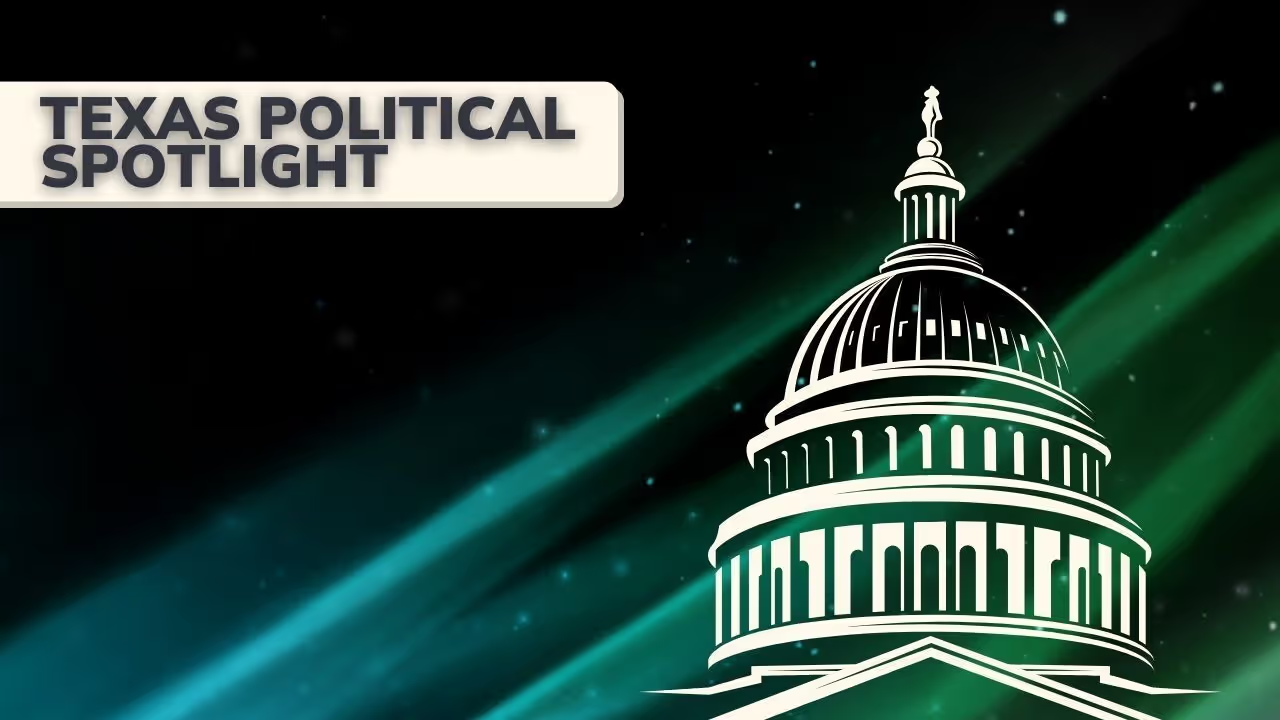
Final Night at the DNC - Kamala Harris Accepts 2024 Presidential Nomination
In partnership with

Welcome back, friends
As the political landscape in Texas continues to shift, recent developments and trends are reshaping how Texans engage with their government and each other. In today’s newsletter, we’ll explore the latest from the Texas Democrats at the DNC, a closer look at the Cruz vs. Allred Senate race, the evolving voter trends across the state, and the ongoing legal battle over Texas’ social media safety law.
This edition draws on insights from the recent voter trends report by the Hobby School of Public Affairs at the University of Houston and the Executive Master of Public Administration Program in the Barbara Jordan – Mickey Leland School of Public Affairs at Texas Southern University, providing a detailed look at the shifting dynamics among Texas voters.
Today’s Insights:
- Texans at the DNC
- Cruz and Allred Neck and Neck in Texas Senate Race?
- Trump and Harris Face Off in Texas Voter Showdown
- Texas Takes on Big Tech with Social Media Law
Texans at the DNC
Texas Democrats’ key policy positions at this year’s Democratic National Convention were immigration reform, healthcare, and the mobilization of Latino voters.
Key Moments:
- Colin Allred, the Democratic US Senate candidate against US Senate Ted Cruz, publicly endorsed Kamala Harris for the 2024 presidential race, praising her leadership and commitment to progressive values. He stated, "Kamala Harris is the leader we need to bring our country together and move it forward. I’m proud to stand with her as she fights for every American."
- Congresswoman Veronica Escobar delivered a speech on the need for comprehensive immigration reform, highlighting the unique challenges faced by border communities. She emphasized that “immigration is not just a border issue, it’s a human issue,” calling for humane policies that respect the dignity of all individuals.
- Congressman Joaquin Castro focused on the importance of voter mobilization, particularly among the Latino community, which he described as "the future of Texas and the Democratic Party." Castro highlighted the strides made in increasing voter turnout in recent elections but stressed the need for continued efforts to engage young and minority voters.
- Beto O’Rourke, former U.S. Rep and 2020 presidential candidate, spoke about healthcare, reiterating his call for expanding Medicaid in Texas, which has not adopted the expansion under the Affordable Care Act. O'Rourke argued that “every Texan deserves access to affordable healthcare.”
Cruz vs. Allred Neck and Neck in Texas Senate Race?
The Senate race between Republican incumbent Sen. Ted Cruz and Democratic challenger Colin Allred is thin. Cruz holds a slight lead with 46.6% of likely voters compared to Allred's 44.5%, while Libertarian candidate Ted Brown captures 2.5%, leaving 6.4% undecided. This data comes from the August survey conducted by the Hobby School of Public Affairs at the University of Houston, in collaboration with Texas Southern University, which focused on 1,365 likely voters with a margin of error of 2.65%. Gender and racial divides are stark: Cruz leads Allred by 13 points among men (52% to 39%), but Allred is ahead by 7 points among women (49% to 42%). Among white Texans, 57% support Cruz, while Allred leads among Latino and Black voters with 46% and 72% respectively. With 93% of voters on both sides certain of their choice, this race will likely hinge on undecided voters and turnout among key demographics.
Trump and Harris Face Off in Texas Voter Showdown
That same poll shows Texas voters with a clear but narrow preference for Donald Trump over Kamala Harris. Trump leads with 49.5% of likely voters, while Harris trails at 44.6%. The August survey, which focused on 1,365 likely voters with a margin of error of 2.65%, reveals that Harris's support has increased by 4.3 points since June, while Trump’s has edged up by 0.6 points. The gender gap is significant: Trump has an 18-point lead among men (56% to 38%), but Harris leads among women by 6 points (50% to 44%). Racial divides are also pronounced—57% of white Texans back Trump, while Harris has overwhelming support among Black Texans (77% to 17%). Among Latino voters, the race is tight, with 47% for Trump and 46% for Harris. Both candidates retain strong loyalty from their bases, but independent voters remain a wildcard, with 41% leaning toward Trump and 39% toward Harris.
Texas Takes on Big Tech with Social Media Law
The Texas social media safety law, often referred to as HB 20 from the 87th Texas Legislative Session - 1st special, has become a flashpoint in the ongoing debate over free speech and content moderation in the digital age. HB 20 is aimed at curbing what the state perceives as censorship by social media companies. However, the law has faced numerous legal challenges, culminating in a significant court case that could have broad implications for the future of online speech and state-level regulation.
Key Provisions of HB 20:
- Content Moderation Restrictions: The law prohibits large social media platforms (those with over 50 million active users in the U.S.) from banning or blocking users based on their viewpoints. This section of the law (Chapter 143A of the Texas Civil Practice and Remedies Code) has been the most contentious, as it directly challenges the content moderation practices of tech giants like Facebook, Twitter, and YouTube.
- Transparency Requirements: HB 20 mandates that social media companies disclose how they moderate content, including how they handle complaints and the criteria used for content removal or user bans. This requirement aims to increase accountability and transparency in how platforms enforce their community guidelines.
- Appeal Process: The law establishes a process for users to appeal content removal or account suspensions, requiring companies to provide clear reasons for their decisions and offer a way for users to challenge those actions.
Legal Challenges and Court Case:
- The law was immediately challenged by tech companies and free speech advocates, who argue that HB 20 violates the First Amendment by compelling platforms to host speech they may find objectionable. Critics also contend that the law is overly broad and could lead to unintended consequences, such as the proliferation of harmful content online.
- In a recent court case, the U.S. Court of Appeals for the Fifth Circuit upheld parts of the law, allowing certain provisions to take effect while leaving others in limbo. The decision has been appealed, and the case could eventually reach the Supreme Court, setting a national precedent.
Impacted Sections of Texas Code:
- Chapter 143A, Texas Civil Practice and Remedies Code: This chapter, created by HB 20, outlines the restrictions on content moderation and the transparency requirements for social media platforms. It is at the heart of the legal challenges, with opponents arguing that it infringes on the platforms’ rights to manage their services according to their terms.
National Impact:
- The outcome of the legal battle over HB 20 could influence similar legislation in other states. States like Florida have passed comparable laws, which are also being challenged in courts, making the Texas case a critical test for state-level regulation of social media.
What’s Next?
- As the case progresses through the courts, both sides are preparing for what could be a landmark decision. If upheld, HB 20 could dramatically alter the landscape of content moderation, forcing platforms to reconsider how they manage speech on their services. The law’s supporters argue it is necessary to protect free speech online, while opponents warn it could lead to a flood of harmful or extremist content.
Quote of the Day
“Do what you can, with what you have, where you are.” - Theodore Roosevelt

Phelan Taps Toomey, RFK Endorses Trump
Welcome back, friends
Mike Toomey has been appointed as Chief of Staff for Texas Speaker Dade Phelan, succeeding Enrique Marquez and bringing decades of experience in Texas government. Meanwhile, in the 2024 presidential race, Robert F. Kennedy Jr. has endorsed Donald Trump and withdrawn from the ballot in Republican-leaning states, including Texas. These developments are expected to impact both state leadership and the national election landscape.
Today’s News:
- Mike Toomey Named Chief of Staff for Texas Speaker Dade Phelan
- RFK Jr. Withdraws from Texas Ballot and Endorses Trump
Mike Toomey Named Chief of Staff for Texas Speaker Dade Phelan
Texas Speaker of the House Dade Phelan has appointed Mike Toomey as his new Chief of Staff, effective August 26, 2024. Toomey, a seasoned veteran of Texas politics with over four decades of experience, replaces outgoing Chief of Staff Enrique Marquez, who served Phelan's office with distinction through some of the most impactful legislative sessions in recent memory.
Speaker Phelan praised Toomey’s extensive background in both public and private sectors, noting his reputation as a strategic leader well-suited to guide the Speaker's office and the Texas House. Toomey’s career highlights include serving as Chief of Staff to two Texas governors—Bill Clements and Rick Perry—and providing strategic counsel within Governor Greg Abbott's administration. Phelan expressed confidence that Toomey’s leadership will significantly benefit the state and the Texas Legislature moving forward.
RFK Jr. Withdraws from Texas Ballot and Endorses Trump
Robert F. Kennedy Jr., who began his 2024 presidential bid as a Democrat before switching to run as an Independent, has now endorsed Donald Trump and decided to withdraw his name from the ballot in all Republican-leaning states.
Quote of the Day
"Success is not final, failure is not fatal: It is the courage to continue that counts." - Winston Churchill
More in Texas Politics
Presented by All Texas News
Save time and improve advocacy with Custom Texas News Clips: Start your day with the most important Texas news relevant to your client, industry, region, policy area, or trade association. Customize clips from 10 subjects and 8 regions with stories from REAL Texas outlets around the state. Each article includes a concise summary for easy skimming and a link to the full story for in-depth reading — all delivered by 7:00 AM every weekday morning.
Try All Texas News custom news clips for FREE with a two-week trial — just enter your email, no credit card required. Or visit alltexasnews.com every weekday morning for top news around Texas.
Texas, other GOP-led states sue over program to give immigrant spouses of US citizens legal status (AP)
Texas chief who called Uvalde response ‘abject failure’ but defended his state police is retiring (AP)
Texas sues Biden over new program that would benefit undocumented spouses of U.S. citizens (Texas Public Radio)
A Fox News host's debunked election conspiracy appears to have prompted a state investigation (Texas Tribune)
UT System prohibits its universities from making political or social statements (San Antonio Express-News)
Ken Paxton Leads 16 States in Lawsuit Against New Homeland Security Immigration Rule (The Texan)

Key Legislative Moves and Voter Roll Updates in Texas
In partnership with

Welcome back, friends
Today we cover significant developments in Texas politics. The Texas Legislature is exploring new regulations for artificial intelligence, with a focus on ethical and privacy concerns. Lieutenant Governor Dan Patrick has established a PAC to support Republican candidates in the Texas Senate, aiming to maintain and strengthen the GOP majority. Additionally, Texas has removed over 1.1 million inactive voters from its rolls since 2021, as part of ongoing efforts to ensure accurate voter registration records. Finally, there are reports from several media outlets sharing a “readout” about an all-staff meeting in Speaker Phelan’s office.
Today’s Insights:
- Texas Legislature Explores Artificial Intelligence Oversight
- Dan Patrick Forms PAC to Support GOP in Texas Senate
- 1.1 Million Removed from Voter Registration Rolls Since 2021
- Reported Readout from Speaker Dade Phelan’s All-Staff Meeting
Texas Lawmakers Consider AI Regulation
The Texas Senate Business and Commerce Committee recently held a four-hour hearing to examine the regulation of artificial intelligence (AI) as it becomes increasingly prevalent in various industries. During the hearing, lawmakers and experts discussed ethical considerations, privacy concerns, and the potential impact of AI on jobs and the economy. The discussion is part of ongoing efforts to assess how Texas might approach AI regulation, aiming to balance technological innovation with public interest protections as the technology continues to develop.
Full testimonies from the Senate Committee provided by USLege:
Matt Lease, PHD, Professor at University of Texas at Austin’s School of Information
Amanda Crawford, Executive Director of the Texas Department of Information Resources (DIR) and Chief Information Officer for Texas
Tina McLeod, Chief Information Officer at the Officer of the Attorney General
Dan Patrick Forms PAC to Support GOP in Texas Senate
Lieutenant Governor Dan Patrick has launched a new political action committee (PAC) aimed at supporting Republican candidates in the Texas Senate. The PAC will focus on key races in the upcoming 2024 elections, with the goal of maintaining and possibly expanding the GOP majority in the Senate. This effort is part of Patrick’s strategy to ensure the continuation of the Republican agenda in Texas.
We rate only one of the nine contested Senate races on the ballot is competitive: SD27. Republican challenger Adam Hinojosa faces Sen. Morgan LaMantia, who currently has a significant financial advantage over Hinojosa. He may be the new PAC’s primary beneficiary.
1.1 Million Removed from Voter Registration Rolls Since 2021
Since 2021, Texas has removed more than 1.1 million inactive voters from its voter rolls as part of statutorily required ongoing maintenance efforts by the Secretary of State’s office. The process, aimed at ensuring the accuracy of voter registration records, targeted individuals who had not participated in recent elections or confirmed their registration status. This removal affects approximately 7% of the state’s 16.7 million registered voters. About half of the removed voters had died, requested to be removed or moved to another state. About 463,000 were on the ’suspense list’ and had not responded to county requests for information. Another 6,500-7,000 were believed to be noncitizens, and about 6,000 had felony convictions and were thus ineligible to vote.Those identified for removal were notified and given the opportunity to confirm their status before being officially removed. The action complies with federal guidelines designed to maintain accurate and up-to-date voter rolls.
Reported Readout from Speaker Dade Phelan’s All-Staff Meeting
Reporters from several media outlets have shared on Twitter/X what appears to be a “readout" about an all-staff meeting in Speaker Phelan’s office where Mike Toomey was introduced as his new chief of staff. The meeting “sets the stage for [a] new chapter of leadership,” according to the document. Highlighted is Phelan’s “strong focus on school choice and education funding, which close collaboration planned with Governor Abbott, the Texas Senate, House members and Chairman Brad Buckley of the House Public Education Committee.” Other legislative priorities mentioned in the readout included job creation, economic development, reducing the size and scope of government and fiscal conservatism. Lt. Gov. Dan Patrick has frequently criticized Phelan for killing priority conservative legislation, including school choice. As far as we can tell, neither the Speaker’s office nor campaign has issued a formal press release regarding his legislative priorities.
What to know after Texas authorities searched the homes of Latino campaign volunteers (AP)
Dan Patrick starts Texas Senate leadership political action committee (Texas Tribune)
Colin Allred’s understated campaign strategy draws mixed reviews from fellow Democrats (Texas Tribune)
Fourth Reading: The Toomey of It All (The Texan)
REDACTED #024: A Tale of Two Tickets (The Texan)

Texas Political Shake-Ups and Legal Showdowns
Welcome back, friends
In today's newsletter, we cover significant developments in Texas politics and law. State Rep. Shawn Thierry has switched from the Democratic to the Republican Party, highlighting the shifting dynamics in Texas's political landscape. Meanwhile, the Texas Senate Democratic Caucus has requested a federal investigation into potential voter rights violations, reflecting ongoing concerns about election integrity. Additionally, Attorney General Ken Paxton has filed a lawsuit challenging the State Fair of Texas’s firearm ban, a case that could have implications for gun laws across the state.
Today’s Insights:
- State Rep. Shawn Thierry Switches to GOP
- Texas Voter Rights Violations Investigation
- Court Challenges Texas State Fair Gun Ban
State Rep. Shawn Thierry Switches to GOP
Houston State Representative Shawn Thierry has switched from the Democratic to the Republican Party, citing her belief that the Democratic Party has "lost its way." Thierry’s decision comes after facing criticism within her former party for supporting a GOP-led bill restricting transition-related healthcare for minors.
Texas Voter Rights Violations Investigation
The Texas Senate Democratic Caucus has formally requested the U.S. Department of Justice to investigate potential voter rights violations in Texas. This request follows concerns that recent election-related actions may have disproportionately impacted minority voters. The request specifically mentions concerns about voter roll purges, restrictions on mail-in voting, and the placement of polling locations, which Democrats argue could suppress voter turnout in vulnerable communities.
The Democrats' request for an investigation highlights the broader national debate on voter rights and election integrity. This investigation, if pursued, could lead to federal oversight or legal action aimed at ensuring compliance with the Voting Rights Act and other federal protections
Court Challenges Texas State Fair Gun Ban
Attorney General Ken Paxton has filed a lawsuit challenging a gun ban at the State Fair of Texas, arguing that the ban contradicts state laws allowing licensed gun owners to carry firearms in most public places. The Texas State Fair begins September 27th

New Appointments and Legislative Moves in Texas Politics
Welcome back, friends
In today's newsletter, we cover leadership changes and political events in Texas. We discuss State Representative David Cook’s official bid to challenge Phelan for the Texas House Speaker role. Former Governor Rick Perry joins Texas House Speaker Dade Phelan’s team as a senior advisor before the upcoming legislative session. Minnesota Governor Tim Walz also headlined a Democratic fundraiser in Dallas as party members prepare for the 2024 elections.
Today’s Insights:
- David Cook Announces Bid for Texas House Speaker
- Former Governor Rick Perry Joins Speaker Phelan’s Team
- Minnesota Governor Tim Walz to Headline Democratic Fundraiser in Dallas
David Cook Announces Bid for Texas House Speaker
Texas State Representative David Cook has declared his intention to run for Speaker of the Texas House. Cook, a Republican from Mansfield, becomes the 3rd member to challenge Phelan, joining Rep. Tom Oliverson, and Rep. Shelby Slawson. His announcement comes amid continued dissatisfaction with Phelan’s leadership among some of the Republican caucus.
Former Governor Rick Perry Joins Speaker Phelan’s Team
Former Texas Governor Rick Perry has joined Texas House Speaker Dade Phelan’s team as a senior advisor, effective immediately. Perry, who served as Texas Governor for 14 years, will work closely with Phelan and his team in preparation for the upcoming legislative session, providing insights on policy areas such as economic growth and job creation. Perry’s advisory role is voluntary and will continue until the start of the 89th Texas Legislature. Phelan expressed gratitude for Perry's willingness to collaborate, citing Perry’s deep understanding of Texas politics and the legislative process as key assets for the Texas House.
Minnesota Governor Tim Walz Headlines Democratic Fundraiser in Dallas
Minnesota Governor Tim Walz is scheduled to headline a Democratic fundraiser in Dallas on Monday. The event is part of an effort to raise support for Democratic candidates in Texas ahead of the 2024 election cycle. Walz, known for his leadership on healthcare and economic policy, will address key issues important to Democratic voters in Texas.
UT Poll: Trump by 5, Cruz by 8
Former President Trump leads Vice President Harris, 49%-44%, according to a UT/Texas Politics Project poll released this morning. Trump led President Biden, 46%-39%, in the June UT/TPP poll. The new poll shows Sen. Ted Cruz leading U.S. Rep. Colin Allred, 44%-36%, virtually unchanged from the 45%-34% advantage in the June poll. Our Jeff Blaylock will share some insights about the poll early next week.
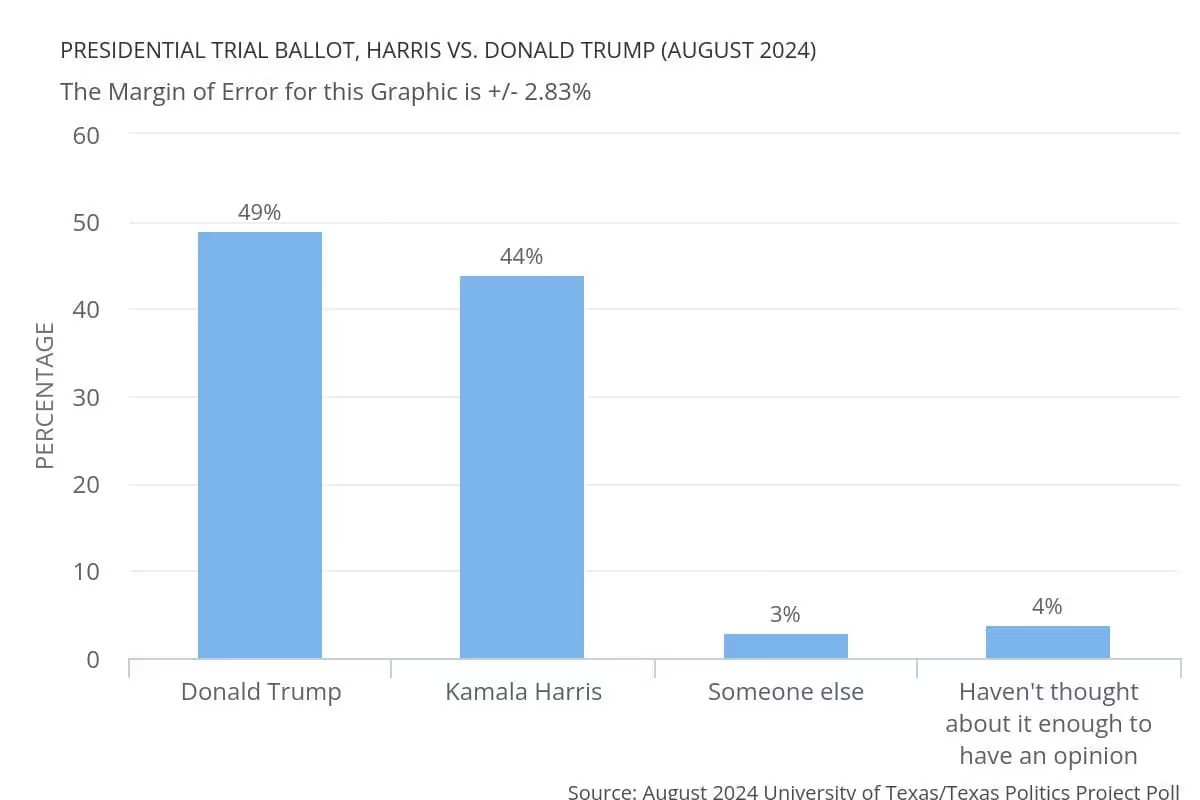

Interim Charges, Marijuana Legalization and New Speaker Bid
Welcome back, friends
In today's newsletter, we cover Lt. Gov. Dan Patrick's new list of interim charges, his first endorsement this general election, fresh polling data ahead of the Trump-Harris presidential debate, Rep. James Frank Announces Bid for Texas House Speaker, and a bold campaign ad from a Texas House candidate advocating for marijuana legalization. Dive into the latest developments shaping Texas politics as candidates vie for support in the lead-up to the November election.
Today’s Insights:
- Lt. Gov. Dan Patrick Endorses Mitch Little in Texas House District 65 Race
- New Poll Shows Trump Leading Harris by 5 Points in Texas
- Texas House Candidate Sally Duval Releases Campaign Ad Advocating for Marijuana Legalization
- Rep. James Frank Announces Bid for Texas House Speaker, Fourth Challenger to Dade Phelan.
- Texas House Committee Zoom Meeting Hacked During Security Hearing on Foreign Threats
- New Interim Charges Announced by Lt. Gov. Dan Patrick
Lt. Gov. Dan Patrick Endorses Mitch Little in Texas House District 65 Race
Lt. Gov. Dan Patrick has endorsed Mitch Little, a Republican candidate for Texas House District 65, in the upcoming general election in this competitive district that we have rated as likely Republican. Patrick praised Little as a strong conservative who upholds values such as freedom, family, and traditional Texas principles. This is Patrick's first endorsement for the general election.
New Poll Shows Trump Leading Harris by 5 Points in Texas
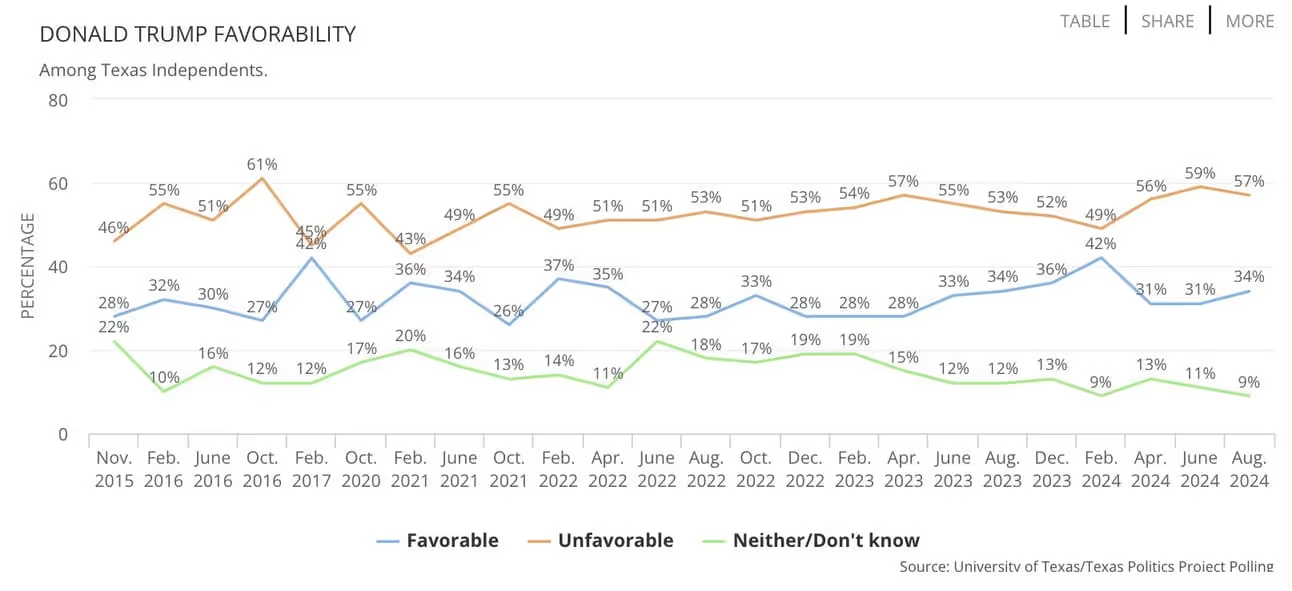
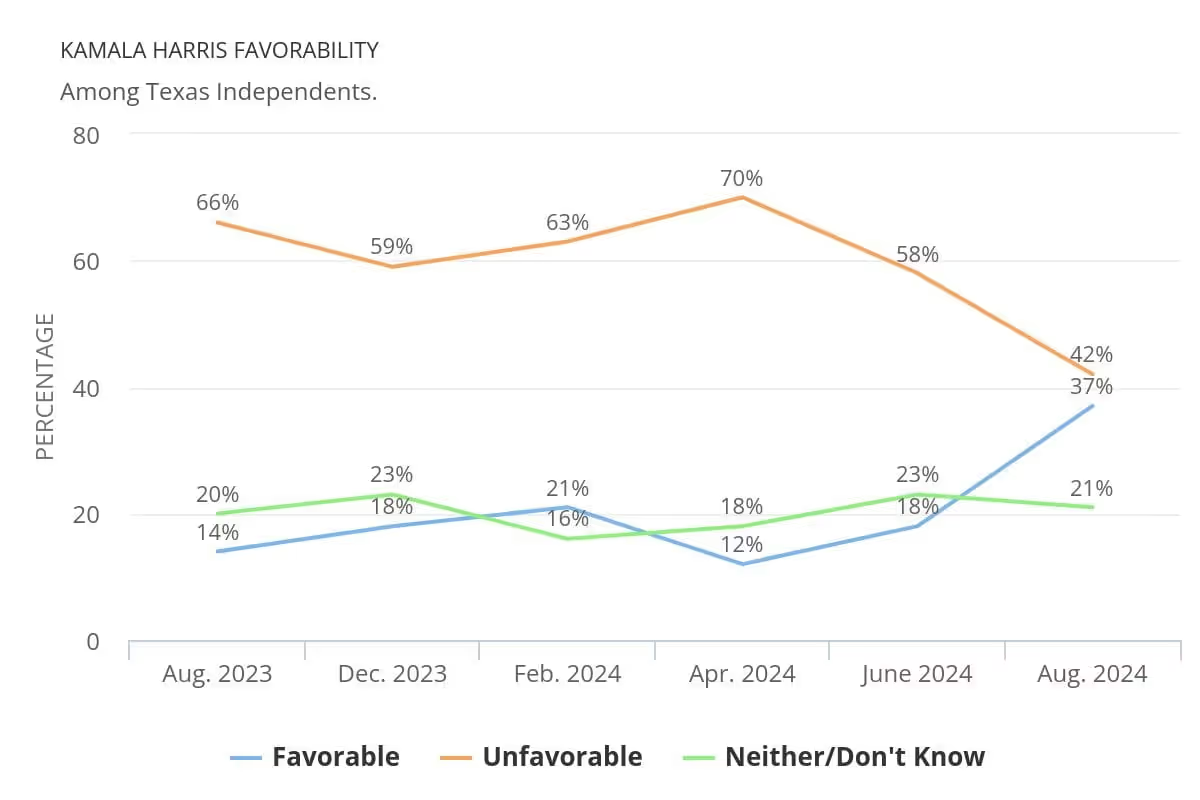
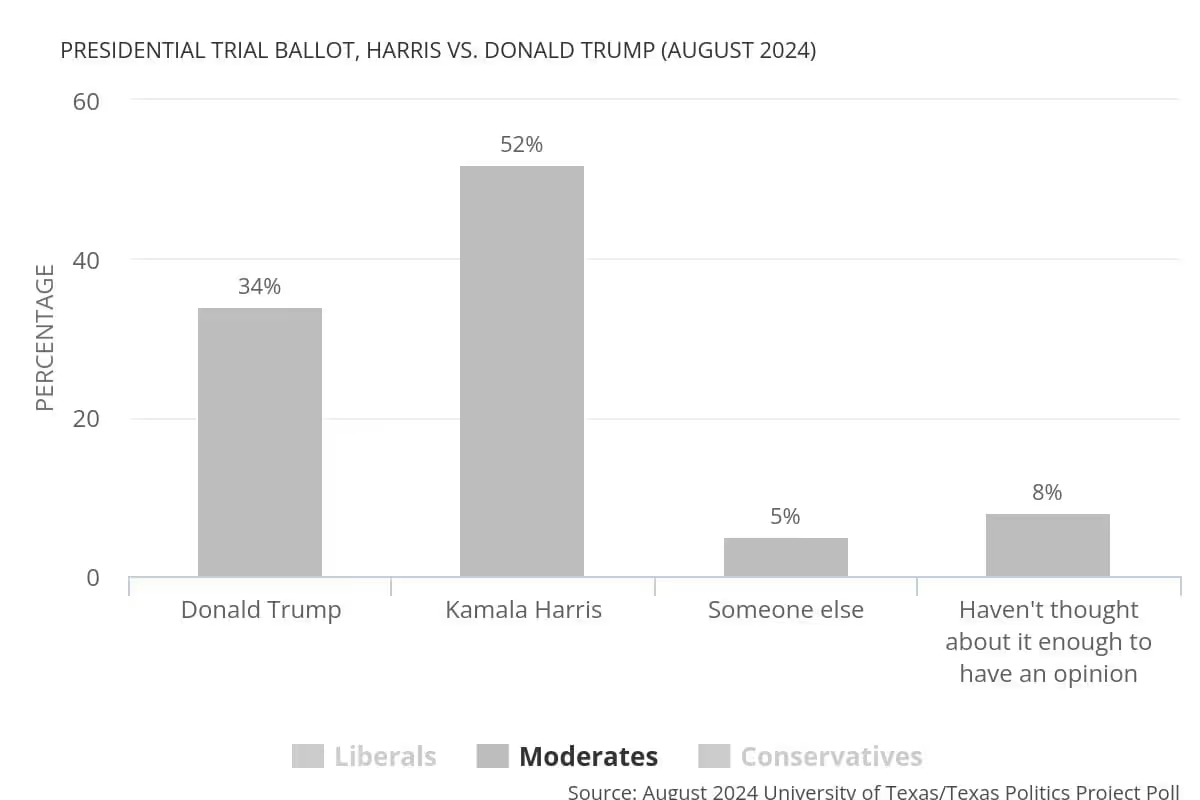
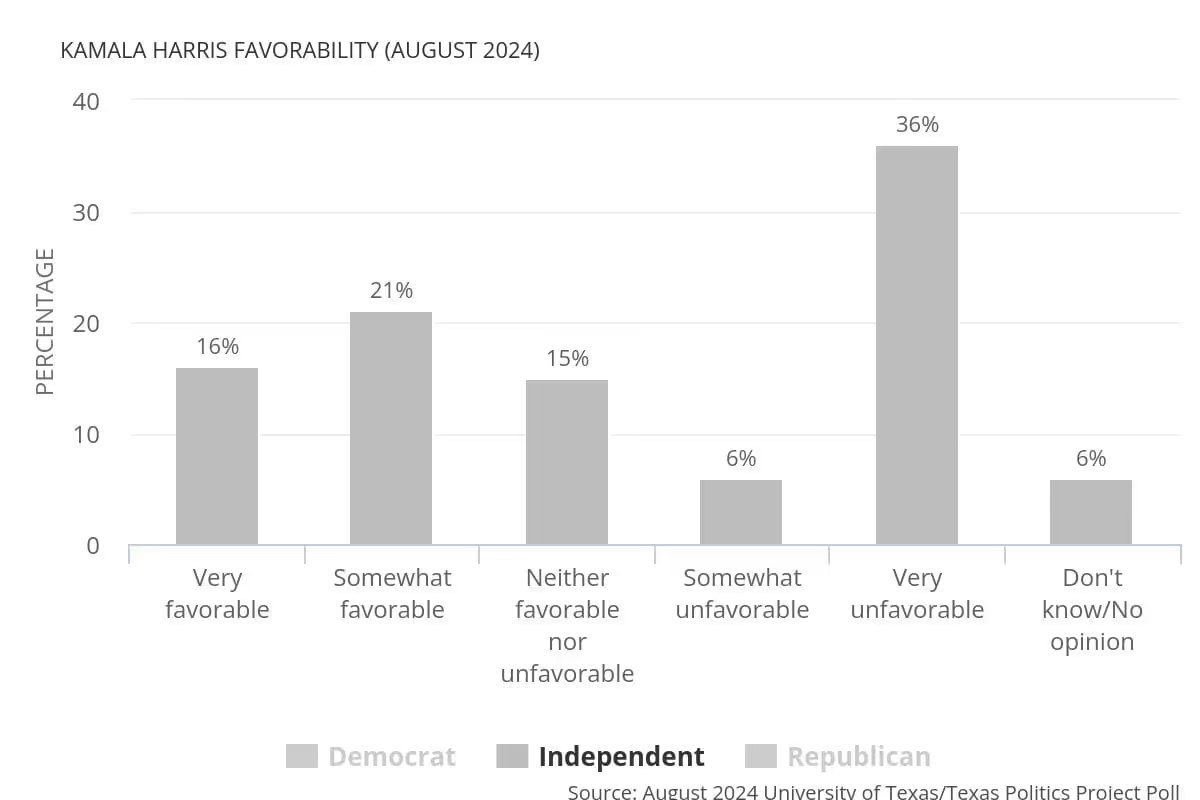
A recent analysis by Jim Henson and Joshua Blank at the University of Texas Austin highlights key dynamics shaping Texas public opinion ahead of the anticipated Trump-Harris presidential debate. Polling shows former President Trump maintaining a lead in Texas, with 49% support compared to 44% for Vice President Kamala Harris in a head-to-head match-up, based on an August 2024 University of Texas/Texas Politics Project Poll. The race mirrors past election trends, with Trump holding a smaller margin than his 2016 and 2020 victories. Harris has shown improvement in polling over President Biden's earlier performance, likely boosted by increased enthusiasm among Democrats. However, while Harris remains less defined among Texas voters, Trump’s popularity appears solidified, and he enjoys stronger trust on key issues like the economy, immigration, and inflation. The stakes are particularly high for Harris, who will seek to capitalize on her momentum and potentially sway undecided voters, especially independents, where she has made recent gains.
Texas House Candidate Sally Duval Releases Campaign Ad Advocating for Marijuana Legalization
Texas House candidate for House District 73, Sally Duval released a provocative campaign advertisement in which she is seen smoking marijuana, advocating for more clear regulation of cannabis. Duval, a reform candidate running on a platform of change, argues that Texans should have access to safe, tested marijuana products, positioning herself as a bold reform candidate. We have this district rated as Safe Republican, so she faces an uphill battle in unseating Rep. Carrie Isaac.
Rep. James Frank Announces Bid for Texas House Speaker, Fourth Challenger to Dade Phelan
State Representative James Frank (R-Wichita Falls) has officially entered the race for Texas House Speaker, joining three other Republican challengers aiming to unseat current Speaker Dade Phelan. Frank, known for his work on healthcare and family services, adds further complexity to the leadership struggle within the Texas House.
Texas House Committee Zoom Meeting Hacked During Security Hearing on Foreign Threats
During a Texas House committee meeting on securing the state from "hostile foreign organizations," a Zoom session was apparently hacked, displaying unauthorized content that seemed to be Russian Propaganda. This interruption derailed the meeting, forcing the legislators to shut down the stream. The committee recorded on-site audio of the remainder of the hearing.
New Interim Legislative Charges Announced by Lt. Gov. Dan Patrick for 2024
Lt. Gov. Dan Patrick has released additional interim legislative charges for Texas Senate committees. https://Click here to view interim charges.
The charges are:
Business and Commerce Committee
- Non-Compete Agreements
Criminal Justice Committee
- Supporting Victims of Sexual Assault
- Retail Theft
- Financial Crimes
Education Committee
- Improving K12-College Pathways
- Monitoring:
Finance Committee
- School Enrollment Trends
- Texas Moving Image Industry Incentive Program
Health and Human Services Committee
- Protecting Vulnerable Texans in Emergencies
Higher Education Subcommittee
- Stopping DEI to Strengthen the Texas Workforce
- Core Curriculum Course Accessibility
State Affairs Committee
- Impeachment Reform
- Runoff Elections
- Lottery
- Unmasking Protestors
- Stop Noncitizen Voting
- Beverages with THC
- Public Trust in Government
- Addressing Homelessness
- Election Audit Reports
- Monitoring

Texas Legislative Updates: Key Endorsements & Polling Insights
In partnership with

Welcome back, friends
Meanwhile, internal polling from Angie Chen Button's campaign shows her leading her Democratic opponent Averie Bishop by 11 points in the HD 112 race, with 47% support compared to Bishop's 36%.
Today’s Insights:
- Lt. Gov. Dan Patrick Unveils Key Endorsements in Texas House Races
- Angie Chen Button Leads HD 112 Race by 11 Points in Internal Polling
Lt. Gov. Dan Patrick Unveils Key Endorsements in Texas House Races
Texas Lieutenant Governor Dan Patrick has announced a new round of endorsements in several contested Texas House races. Patrick is expected to continue releasing endorsements in the coming days, signaling his influence in shaping the GOP landscape ahead of upcoming elections. Among the endorsed candidates are:
- Brent Money (HD 2)
- Daniel Alders (HD 6)
- Trey Wharton (HD 12)
- Paul Dyson (HD 14)
- Janis Holt (HD 18)
- Ellen Troxclair (HD 19)
- Terri Leo-Wilson (HD 23)
- Matt Morgan (HD 26)
- Gary Gates (HD 28)
- Jeff Barry (HD 29)
- A.J. Louderback (HD 30)
- Todd Hunter (HD 32)
- Denise Villalobos (HD 34)
- Janie Lopez (HD 37)
- J.M. Lozano (HD 43)
- Alan Schoolcraft (HD 44)
- Caroline Harris Davila (HD 52)
- Wes Virdell (HD 53)
- Brad Buckley (HD 54)
- Hillary Hickland (HD 55)
- Pat Curry (HD 56)
- Richard Hayes (HD 57)
- Helen Kerwin (HD 58)
- Shelby Slawson (HD 59)
Rep Angie Chen Button Leads HD 112 Race by 11 Points in Internal Polling
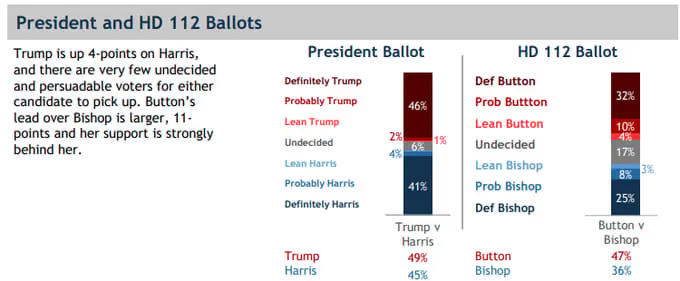
State Representative Angie Chen Button's campaign has released internal polling data showing her with an 11-point lead, 47% - 36%, over Democratic challenger Averie Bishop in the HD 112 race. The poll, conducted from September 3-5 with 300 likely voters and a 6% margin of error, also indicates former President Trump leading by just 4 points in this battleground district. These results suggest a relatively tight race in the district, especially with Trump's narrower lead, which could make HD 112 a key battleground for both parties in the 2024 election cycle.

Patrick Announces New House Endorsements, Cruz and Allred Set Debate, GOP "Reformers" Rally Behind Phelan Challenger David Cook and Abbott Expands 2024 Support
Welcome back, friends
LT Governor Dan Patrick announced a new round of endorsements for Texas House candidates. Meanwhile, Senator Ted Cruz and U.S. Representative Colin Allred have agreed to their first televised debate in the U.S. Senate race, set for October 15 at WFAA’s Dallas studios, to be broadcast across 12 Texas stations. In Austin, “GOP reformers” met today to rally behind one of five challengers to House Speaker Dade Phelan, selecting Rep. David Cook. Additionally, Governor Greg Abbott has expanded his endorsement list ahead of the 2024 election.
Today’s Insights:
- Governor Abbott’s Latest Endorsements
- LT Governor Patrick's New Endorsements
- Cruz and Allred Agree to Debate on October 15
- Reformers to Meet in Austin for Speaker’s Race
Governor Abbott’s Latest Endorsements
Governor Greg Abbott has added to his list of endorsements for the 2024 Texas House and Senate races. Abbott’s most recent endorsements include:
- Adam Hinojosa (HD 49)
- Steven Kinard (HB 70)
- Denise Villalobos (HD 34)
- Keresa Richardson (HD 61)
- Robert Garza (HB 74)
- Matthew Morgan (HD 26)
- Andy Hopper (HD 26)
- Wes Virdell (HD 53)
- AJ Louderback (HD 30)
- Mitch Little (HD 65)
LT Governor Patrick's New Endorsements
LT Governor Dan Patrick has announced new endorsements including a mix of incumbents and candidates for Texas House districts. The full list of endorsements includes:
- Angie Chen Button (HD 112)
- Marc LaHood (HD 121)
- Mark Dorazio (HD 122)
- Charles Cunningham (HD 127)
- Dennis Paul (HD 129)
- Mike Schofield (HD 132)
- Kay Smith (HD 148)
- Valoree Swanson (HD 150)
- James Frank (HD 69)
- Steve Kinard (HD 70)
- Carrie Isaac (HD 73)
- Robert Garza (HD 74)
- Don McLaughlin (HD 80)
- Tom Craddick (HD 82)
- Carl Tepper (HD 84)
- John Smithee (HD 86)
- Caroline Fairly (HD 87)
- Candy Noble (HD 89)
- Nate Schatzline (HD 93)
- Tony Tinderholt (HD 94)
- David Cook (HD 96)
- Giovanni Capriglione (HD 98)
- John Lujan (HD 118)
- Tom Oliverson (HD 130)
Cruz and Allred Agree to Debate on October 15
Senator Ted Cruz and U.S. Representative Colin Allred have agreed to their first televised debate in the race for Cruz's U.S. Senate seat. The debate is scheduled for Tuesday, October 15, at 7:00 p.m. and will take place at WFAA's downtown Dallas studios. The hour-long debate will be broadcast on all 12 Texas stations owned by TEGNA, allowing statewide viewers to watch both on-air and online.
House Republicans to Meet in Austin for Speaker’s Race
A group of GOP House legislators convened in Austin today to coalesce behind one of the five Republican challengers to current House Speaker Dade Phelan. The meeting, which saw up to 50 Texas House members participate, followed the Texas GOP Caucus' multi-round voting process, requiring a two-thirds majority for a candidate to win outright. If no candidate meets the threshold, the lowest vote-getter is eliminated until two candidates remain, with the threshold dropping to three-fifths in later rounds if necessary.

Key Endorsements, and New Campaign Ads in 2024 Races
In partnership with

Welcome back, friends
Colin Allred released a new TV ad in his Senate race against Ted Cruz, and Kristian Carranza launched her first ad for Texas House District 118.
Today’s Insights:
- Governor Abbott endorsed Shelley Luther for Texas House District 62, praising her conservative stances on border security, taxes, and school choice.
- LT Governor Dan Patrick lists new Senate endorsements.
- U.S. Rep. Colin Allred released a new TV ad for his Senate campaign against Ted Cruz, featuring a subtle reference to his NFL career.
- Kristian Carranza launched her first TV ad for Texas House District 118, beginning his general election campaign to unseat Rep. John Lujan.
Abbott Endorsement
- Governor Greg Abbott has officially endorsed Shelley Luther for Texas House District 62. In his statement, Abbott praised Luther as an "unapologetic conservative fighter" who would champion core values important to Texans. He highlighted Luther’s commitment to securing the border, eliminating property taxes, and advancing school choice legislation. Luther, a Republican, is known for her vocal stance on conservative issues and was a candidate in previous elections against Rep. Reggie Smith.
Patrick Endorsements
LT Gov Dan Patrick has released a new list of Texas Senate endorsements:
- Sen. Paul Bettencourt
- Sen. Angela Paxton
- Sen. Phil King
- Sen. Tan Parker
- Sen. Joan Huffman
- Sen. Donna Campbell
- Adam Hinojosa
- Brent Hagenbuch
State House Campaign Ads
- Kristian Carranza (D) has released her first TV ad for the general election in the race for Texas House District 118. The district, located in the San Antonio area, is expected to be a competitive battleground in the 2024 elections. Carranza, who won the GOP nomination, is working to flip the seat currently held by Rep. John Lujan (R), and this ad marks the beginning of her media efforts leading up to November. We rate this district as a toss-up.
US Senate Campaign Ads
- U.S. Rep. Colin Allred (D) has released a new television ad as part of his campaign for U.S. Senate, where he is challenging incumbent Sen. Ted Cruz (R) in the 2024 election. The ad is part of an increasing number of spots airing statewide as both campaigns ramp up their media presence. Allred, a former NFL player with the Tennessee Titans, included a subtle nod to his football past by featuring a Houston Oilers throwback.

Texas Senate Race Heats Up: Shifts in Projections and High-Profile Campaigning
Welcome back, friends
Today’s newsletter highlights objective updates from Texas. The Cook Political Report shifts the Texas Senate race from “likely Republican” to “lean Republican” as Colin Allred gains ground against Ted Cruz. Additionally, Bernie Sanders held a rally in Texas to energize progressive support for Kamala Harris and Allred, emphasizing the importance of grassroots mobilization ahead of the 2024 elections.
Today’s Insights:
- Cook Political Report Changes Texas Senate Race Rating
- Bernie Sanders Campaigns in Texas for Colin Allred and Kamala Harris
Cook Political Report Changes Texas Senate Race Rating
The Cook Political Report recently shifted its rating of the Texas Senate race between incumbent Republican Senator Ted Cruz and Democratic challenger Colin Allred. The race has moved from “Likely Republican” to “Lean Republican,” a rating that we’ve consistently held since our initial ratings. The change indicates a more competitive outlook as the 2024 elections approach. According to the report, key factors such as demographic changes and voter turnout could play a crucial role in the race's outcome. The update suggests that Democrats are gaining ground in what has traditionally been a Republican stronghold.
Bernie Sanders Campaigns in Texas for Colin Allred and Kamala Harris
U.S. Senator Bernie Sanders visited Texas to campaign for Senate candidate Colin Allred and Vice President Kamala Harris, who is the Democratic presidential nominee. Sanders' appearance underscores the Democratic Party's focus on Texas as a key battleground state in the 2024 elections. During his visit, Sanders spoke on issues such as healthcare, economic inequality, and voter mobilization, aiming to energize voters and bolster support for Democratic candidates. The National Democratic Party may once again see Texas as a battleground but it will likely focus on states that are more critical to their presidential candidate’s chances of winning. Readers may recall Hillary Clinton spending time and resources in Texas instead of Wisconsin, and we know how that turned out.

Texas Sues Tiktok and Farm Bill Expiration
Welcome back, friends
In today’s update, Texas farmers face uncertainty after the expiration of the 2018 Farm Bill, prompting calls for new legislation and disaster assistance. Additionally, Texas files a lawsuit against TikTok, accusing the platform of violating state privacy laws by mishandling minors’ personal data. Both stories reflect ongoing challenges in policy and regulation affecting key sectors in Texas.
Today’s Insights:
- Texas Sues TikTok Over Minor Data Privacy
- Congress’s Farm Bill Inaction Raises Concerns
Texas Sues TikTok Over Minor Data Privacy
Texas Attorney General Ken Paxton has filed a lawsuit against TikTok, alleging that the platform violated the state’s Securing Children Online through Parental Empowerment (SCOPE) Act. The lawsuit claims TikTok unlawfully collected and shared minors’ personal information without parental consent, violating state privacy laws. Under the SCOPE Act, companies must provide parents with tools to control their children's data, a requirement TikTok allegedly failed to meet. The state is seeking civil penalties up to $10,000 per violation and demanding stricter compliance measures to ensure better protection of minors’ online privacy in the future.
Congress’s Farm Bill Inaction Raises Concerns
The expiration of the 2018 Farm Bill has left Texas farmers and ranchers without updated federal support, leading to calls for swift legislative action. The Texas Farm Bureau has highlighted the importance of passing a new bill that includes updated disaster relief and commodity programs to address inflationary pressures and natural disasters affecting the agricultural sector. Uncertainty surrounding federal aid impacts both producers and consumers, with potential risks to food security. Farmers are also advocating for short-term assistance while awaiting comprehensive legislative solutions.

Shaheen Shakes Up Texas Speaker Race and Allred Outpaces Cruz in Fundraising
Welcome back, friends
In today’s briefing, we dive into the heated Texas Senate race, where U.S. Rep. Colin Allred has outraised Sen. Ted Cruz, setting new fundraising records as both candidates approach the 2024 election. Additionally, we look at the shifting dynamics in the Texas House Speaker race, as Rep. Matt Shaheen endorses David Cook over Speaker Dade Phelan, citing opposition to Phelan’s stance on gambling expansion.
Today’s Insights:
- Shaheen’s Move in the Texas House Speaker’s Race
- Allred Again Surpasses Cruz in Latest Fundraising Totals
Shaheen’s Move in the Texas House Speaker’s Race
Rep. Matt Shaheen (R-Plano) has shifted his support in the Texas House Speaker’s race, backing Rep. David Cook (R-Mansfield) over current Speaker Dade Phelan. Shaheen’s decision stems from his opposition to Phelan’s handling of gambling legislation, specifically the push to expand casino-style resorts and online sports betting. This shift could impact the race, as Shaheen is known for his cautious approach to political moves. Public polling shows growing support for expanded gambling, but the issue remains divisive among lawmakers, particularly within the conservative base.
Allred Again Surpasses Cruz in Latest Fundraising Totals
U.S. Rep. Colin Allred raised $30.3 million in the third quarter of 2024, outpacing Sen. Ted Cruz, who brought in $21 million across his accounts. Allred’s total now stands at nearly $69 million, while Cruz’s combined total, including PAC contributions, is $40 million. Together, both candidates have raised over $132 million, breaking the previous fundraising record for a Texas Senate race. Despite being outraised similarly in 2018 by Democrat Beto O'Rourke, Cruz still won that election, showing fundraising alone may not determine the final outcome.

TAB and USLege Announce the Launch of TXLege News
FOR IMMEDIATE RELEASE
Media Contact: laura@uslege.ai
October 15, 2024:
TAB and USLege Announce the Launch of TXLege News - Texas Chamber Business News: A Resource for Texas Legislative, Chamber, and Business Community News
AUSTIN, TEXAS – The Texas Association of Business (TAB), in collaboration with legislative AI software company USLege, is excited to announce the launch of TXLege News—Texas Chamber Business News (TCBN)—a new news platform providing comprehensive, bipartisan coverage of key developments impacting the Texas business community, including legislative updates, industry news, and expert analysis.
As the voice of Texas business, TAB is committed to keeping members, chamber partners, and stakeholders informed on the issues that matter most. TCBN will deliver timely, relevant updates from industry leaders and the Texas Legislature, providing critical insights that shape the business landscape across the state.
USLege, the owner of TXLege News, will serve as a primary source for essential updates on legislative proceedings that influence the Texas business environment. From tracking economic trends to highlighting innovation-driven initiatives, we aim to inform business leaders about the developments that drive growth in Texas.
TCBN will also provide in-depth coverage of legislative sessions and elections, ensuring subscribers stay current on the bills and policies that directly impact Texas businesses. With a commitment to a bipartisan approach, TXLege News offers balanced reporting and thoughtful analysis from all sides of the political spectrum.
Beyond legislative news, the platform will cover important stories and trends shaping the future of Texas—from workforce development to the latest technological advancements. TCBN is designed for business leaders, chamber members, policymakers, and engaged citizens who seek the knowledge needed to navigate the state’s evolving business environment.
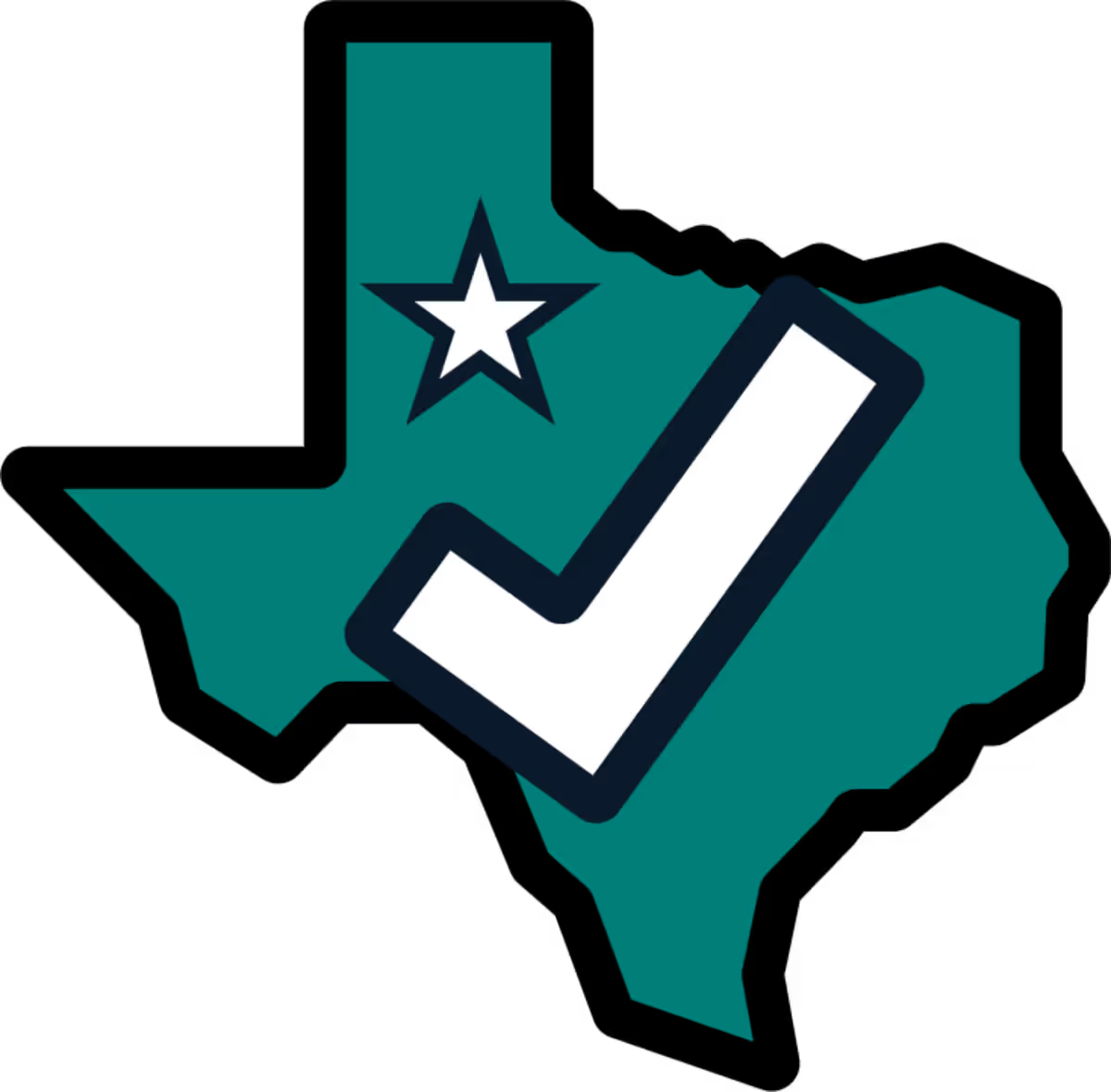
"Texas Chamber Business News represents a significant step forward in our mission to equip the Texas business community with the information they need to thrive," said Glenn Hamer, President and CEO of TAB. "Through our partnership with USLege, we are proud to launch TCBN, utilizing cutting-edge technology and AI-driven insights to deliver timely, accurate, and relevant news."
"We are proud to have the Texas Association of Business as an investor and partner. USLege plans to expand its legislative tracking and analysis services to other states, ensuring that our partners benefit from real-time, AI-driven legislative insights," said Laura Carr, Co-Founder of USLege.
"With our AI technology, TXLege News will remain a reliable and unbiased source of information for business leaders, policymakers, our investors, and partners," added Eric Davis, CEO of USLege.
Subscribers to TCBN will receive regular content directly in their inboxes, featuring top stories, exclusive interviews, expert commentary, and the latest legislative and election updates. The platform is designed to be accessible, engaging, and informative, catering to the diverse needs of the Texas business community.
The Texas Association of Business (TAB) is Texas' premier business advocacy organization, representing over 1,500 companies of all sizes and industries, as well as more than 200 local chambers. TAB works to ensure Texas remains the best state for business by advocating for policies that promote economic growth, innovation, and opportunity.
USLege is a Texas-based software company that utilizes advanced artificial intelligence and natural language processing to revolutionize how legislative and election data is monitored, analyzed, and delivered. By providing real-time, personalized updates and AI-driven insights, USLege empowers businesses, policymakers, researchers, journalists, and advocacy groups to stay informed and navigate complex legislative landscapes. With a focus on improving transparency and accessibility, USLege ensures its users can quickly and efficiently track the legislative developments that matter most to them. Click here to schedule a demo. Follow USLege on Facebook, Twitter, Linkedin, and Instagram.
For more information about TCBN or to subscribe to the newsletter, click here.
###
TAB is the Texas State Chamber, representing companies of every size and industry. The Association’s purpose is to champion the best business climate in the world, unleashing the power of free enterprise to enhance lives for generations. Follow TAB on Facebook, Twitter, and LinkedIn.

Texas Senate Debate Highlights, Voter Poll Insights, and Musk's Role in Trump's Texas Super PAC
Welcome back, friends
In Texas political news, Republican Sen. Ted Cruz and Democratic challenger Colin Allred faced off in their first Senate debate, offering sharp contrasts on major issues such as immigration and economic policy. A new University of Houston poll reveals the key concerns for Texas voters ahead of the 2024 elections, including inflation, border security, and healthcare. Additionally, a Super PAC supporting Donald Trump's 2024 presidential campaign is active in Texas, with business figure Elon Musk contributing to its efforts.
Today’s Insights:
- Cruz and Allred Face Off in Texas Senate Debate
- New Poll Sheds Light on Texas Voter Priorities for 2024
- Elon Musk Contributes to Pro-Trump Super PAC in Texas
Cruz and Allred Face Off in Texas Senate Debate
Republican Sen. Ted Cruz and Democratic Rep. Colin Allred faced off in their first debate in the 2024 Texas Senate race. Cruz highlighted his record on border security, reducing federal regulations, and combating inflation, emphasizing his experience as a two-term senator. He also accused Allred of supporting policies he said would lead to higher taxes and increased government control in areas like healthcare. Allred, a former NFL player and civil rights attorney, criticized Cruz’s role in past government shutdowns and portrayed him as out of touch with Texas voters. Allred also faced scrutiny from Cruz over his votes on key energy and oil issues, given Texas’s critical role in the energy sector. Key issues in the debate included immigration, Social Security, and economic policy. Both candidates used the debate to define their differences as they prepare for what is expected to be a closely watched Senate race in 2024.
New Poll Sheds Light on Texas Voter Priorities for 2024
A new poll conducted by the University of Houston’s Hobby School of Public Affairs reveals that Texas voters are most concerned about the economy, immigration, and public safety as the 2024 elections approach. Inflation remains the top issue across the board, with 28% of respondents naming it as their primary concern. The poll also showed significant partisan divides, with Republicans prioritizing border security and economic issues, while Democrats emphasized healthcare, voting rights, and climate change. These findings are expected to inform campaign strategies as candidates focus on addressing the issues that resonate most with their voter base.
Elon Musk Contributes to Pro-Trump Super PAC in Texas
Elon Musk, CEO of Tesla and X (formerly Twitter), has contributed $75 million to America PAC, a pro-Trump Super PAC, since July 2024, according to FEC filings. Musk endorsed Donald Trump for president on July 13, 2024, and his financial backing has significantly boosted Trump’s 2024 campaign. America PAC, with Musk’s support, has spent over $102 million on the race, backing Trump and opposing key Democrats. Musk has used his platform X to amplify his views on secure borders, sensible government spending, safe cities, a fair justice system, free speech, and self-protection. His involvement is expected to play a key role in shaping outcomes in Texas and other battleground states.

Abbott Condemns Legislative Intervention in Roberson Case, Cruz Gains Democratic Endorsement, and Early Voting Surges in Harris County
Welcome back, friends
Governor Greg Abbott’s office condemned the actions of Texas legislators who intervened to halt Robert Roberson’s execution, marking his first public comments on the matter. Meanwhile, U.S. Sen. Ted Cruz receives an endorsement from former state Sen. Eddie Lucio (D-Brownsville), and Harris County reports high early voter turnout.
Today’s Insights:
- Abbott Condemns Legislative Intervention as Roberson’s Execution Is Delayed
- Cruz Secures Democratic Endorsement in Senate Race
- Harris County Early Voting Sees Strong Start
- Lucio Endorses Hinojosa in New Texas Senate TV Ad
Abbott Condemns Legislative Intervention as Roberson’s Execution Is Delayed
Robert Roberson, who was convicted in 2003 for the death of his 2-year-old daughter based on "shaken baby syndrome" evidence, has had his execution delayed after a legal battle over a legislative subpoena. The Texas House Criminal Jurisprudence Committee issued the subpoena for Roberson to testify at an upcoming hearing on the state’s "junk science" law. This law, passed in 2013, allows courts to reconsider convictions based on discredited scientific evidence. During this hearing, prominent figures such as Dr. Phil McGraw, author John Grisham, and former lead detective Brian Wharton testified, challenging the validity of Roberson’s conviction.
Governor Greg Abbott broke his silence on the case, condemning the legislative efforts to halt Roberson’s execution. In an amicus brief, Abbott’s general counsel argued that lawmakers “stepped out of line” and emphasized that the power to grant clemency or a reprieve lies solely with the governor. Abbott has not indicated any plans to intervene further.
Roberson's execution remains on hold as the courts address the constitutional conflict raised by the subpoena.
See Full Testimonies From The Hearing Here
Cruz Secures Democratic Endorsement in Senate Race
U.S. Sen. Ted Cruz announced that he has secured the endorsement of former state Sen. Eddie Lucio (D-Brownsville) for his re-election campaign. Lucio, a conservative Democrat, previously supported Sen. Morgan LaMantia but switched his endorsement to Cruz, citing LaMantia's liberal voting record. Lucio’s support reflects a broader trend of voters in increasingly competitive South Texas favoring Republican candidates.
Harris County Early Voting Sees Strong Start
Harris County reported more than 125,000 people voted early in person on October 21, 2024, the first day of early voting. While this is a strong turnout, it is lower than the first-day figures from 2020 (169,000) and slightly below 2016 (129,000). The early voting numbers are expected to play a key role in determining the outcomes of several critical races in the county.
Lucio Endorses Hinojosa in New Texas Senate TV Ad
Adam Hinojosa, the conservative Republican candidate for the Texas Senate, has launched a new television ad featuring former Texas Sen. Eddie Lucio Jr. Lucio, who had previously supported Democratic Sen. Morgan LaMantia, switched his endorsement to Hinojosa. Lucio expressed concerns with LaMantia’s liberal voting record, specifically mentioning her stances on abortion and education, as reasons for the change. The two campaigned together in South Texas, as the ad airs to garner further support during early voting.

Trump and Cruz in Austin, Harris and Allred in Houston, and Early Voting in Texas Surpasses 1.8 Million Ballots
Welcome back, friends
Former President Trump and U.S. Sen. Ted Cruz will address the media on border security in Austin this Friday, while Vice President Kamala Harris and U.S. Rep. Colin Allred will host a rally in Houston at nearly the same time. Meanwhile, more than 1.8 million Texans have already cast their ballots in early voting, giving a glimpse into the state’s voter turnout ahead of the 2024 election.
Today’s Insights:
- Trump and Cruz to Speak in Austin on Border Security as Harris and Allred Hold Houston Rally
- Early Voting in Texas Surpasses 1.8 Million Ballots, Mail-In Voting Declines
Trump and Cruz to Speak in Austin on Border Security as Harris and Allred Hold Houston Rally
Image Credit: The Texan News
Former President Trump and U.S. Sen. Ted Cruz will deliver campaign remarks on border security to reporters in Austin on Friday. The event will take place just hours before their Democratic opponents, Vice President Kamala Harris and U.S. Rep. Colin Allred, host a rally in Houston. The competing events highlight the growing attention on Texas as both parties ramp up their efforts ahead of the 2024 election.
Trump’s campaign announced the news conference on Wednesday night, confirming the Austin event would focus on border security—an issue central to his 2024 campaign. Cruz’s participation was confirmed Thursday morning, with the senator joining Trump at the event. The Austin press conference will be held at a private jet terminal in east Austin.
In addition to his Austin appearance, Trump will also record an episode of the Joe Rogan Experience during his visit to the city.
Meanwhile, Vice President Harris and Rep. Allred will rally Democratic supporters in Houston later that day, with notable guests including Willie Nelson and Tina Knowles. We currently rate both the Senate race and the presidential contest in Texas as Lean Republican.
Early Voting in Texas Surpasses 1.8 Million Ballots, Mail-In Voting Declines
Image Credit: The Economic Times
As of the second day of early voting, more than 1.8 million Texans have cast their ballots, representing over 10% of all registered voters in the state. Comparing two days of early voting to prior year entire election numbers, voter turnout in Texas remains strong, with over 1.2 million ballots cast in the state’s 15 largest counties, up from approximately 987,000 during the same period in the 2016 election and slightly lower than the same period during the 2020 election. Despite the increase in total numbers, the overall voter turnout rate in these counties remains consistent with 2016 at 10.1%.
Voter participation trends reveal some variation across different regions of the state. Nearly half of early voters are from precincts where Republicans have historically dominated, with 49% of voters coming from areas where Republicans have a 60% or greater share of the vote, according to Derek Ryan's early voting report for Day 2 of early voting.Another 16% of voters live in areas where Republican support is between 50% and 59%.
Texas’s five most populous counties—Harris, Dallas, Bexar, Travis, and Tarrant— have accounted for about 38% of the state’s early vote so far, compared to the 42% they typically contribute in presidential elections in comparison to 2020, 2016, and 2012.
An interesting trend is the shift from Republican to Democratic mail-in voters. This shift is largely driven by the impact of the COVID-19 pandemic, which increased Democratic use of mail-in ballots, and former President Trump’s statements discouraging Republicans from voting by mail. Voters with previous Republican Primary history currently make up just 33% of all votes cast by mail. In 2016, they made up 40%, and in 2012, they made up 47%. On the other hand, voters with previous Democratic Primary history now account for 46% of all mail-in ballots, a significant increase from 27% in 2016 and 23% in 2012.
Click Here For 2024 Texas Early Voting Report
Click Here For County-by-County Report
Source:
Derek Ryan

Allred Campaign Internal Poll and Texas Election Security
Welcome back, friends
U.S. Rep. Colin Allred’s campaign has released an internal poll showing a 46%-46% tie in his race against Sen. Ted Cruz, though recent external polls suggest Cruz holds a slight lead. With the Texas Senate race rated as “Lean Republican,” the data indicates a highly competitive contest as early voting begins. Meanwhile, Texas Secretary of State Jane Nelson has announced new election security measures, and Rep. Hugh Shine and AG Ken Paxton emphasize voter awareness and integrity in the final days before Election Day.
Today’s Insights:
- Allred’s Campaign Releases Poll Showing Tied Texas Senate Race
- Texas Secretary of State Jane Nelson Asserts Strengthened Election Security
- Rep. Hugh Shine Encourages Bell County Voters to Observe Polls
- AG Ken Paxton Warns of Voter Fraud at Poker Event
Allred’s Campaign Releases Poll Showing Tied Texas Senate Race
U.S. Rep. Colin Allred’s campaign has released an internal poll indicating a tie in the Texas Senate race, with both Allred and incumbent Sen. Ted Cruz polling at 46% among likely voters. The poll, conducted from October 18 to October 23, surveyed 800 likely voters via landline, cell phone, and text-to-online interviews. This reflects a narrowing of the gap since May, when Cruz held a seven-point lead over Allred (47% to 40%), and a two-point lead earlier in October (44% to 46%).
However, recent external polls provide additional context on the race’s dynamics. An October poll by the University of Texas/Texas Politics Project found Cruz leading by seven points, at 51% to 44%. Meanwhile, a New York Times/Siena College poll, also from October, showed Cruz with a four-point lead, 50% to 46%, within the margin of error and indicating a close race. We’ve rated the Texas Senate race as “Lean Republican” and project it to be closer than other statewide races.
Texas Secretary of State Jane Nelson Asserts Strengthened Election Security
Texas Secretary of State Jane Nelson recently outlined enhanced security measures for the upcoming election in her interview with Inside Texas Politics, asserting that "this upcoming election will be the most secure election Texas has ever had." To ensure the integrity of the state’s election system, Nelson highlighted Texas' commitment to protecting voter data and preventing duplicate registrations. Although Texas has not joined additional multi-state systems for managing voter rolls, Nelson emphasized that the state has implemented new tools and technologies to detect and prevent voter fraud. These tools include advanced voter roll management within Texas, allowing for more accurate detection of duplicate records, improved data matching techniques to cross-check voter information across various databases, and enhanced cybersecurity protocols to protect voter information.
Rep. Hugh Shine Urges Bell County Voters to Support Democrat Jennifer Lee Over GOP Nominee
Republican Rep. Hugh Shine recently urged Bell County voters to vote against GOP nominee Hillary Hickland in the Texas House District 55 race. In a message to voters, Shine voiced his support for Democratic candidate Jennifer Lee, stating, "If public education is a priority for them, they need to vote for (Democrat) Jennifer Lee." Hickland defeated Shine, 53%-40%, in the Republican primary.
First Reported by Quorum Report
AG Ken Paxton Warns of Voter Fraud at Poker Event
At a Texas “Politics and Poker” event, Texas Attorney General Ken Paxton warned about the risks of voter fraud and urging Texans to remain vigilant during the election process. This contrasts with Texas Security of State Jane Nelson messaging that this year’s election is a secure election.
We hope you enjoyed today’s read!

AG Paxton Calls for Rep. Jeff Leach's Resignation and 8-Day-Out Campaign Finance Reports
Welcome back, friends
Texas House Judiciary & Civil Jurisprudence Committee chair Jeff Leach, a Republican, and Criminal Jurisprudence Committee chair Joe Moody, a Democrat, submitted a filing with the Texas Supreme Court, emphasizing judicial independence and the separation of powers. Attorney General Ken Paxton publicly called for Leach’s resignation following Leach’s private communications to Court of Criminal Appeals Judge, Michelle Slaughter, requesting mercy to be shown on the Robert Roberson’s execution. 8-day-out Campaign Finance Reports are now available.
Today’s Insights:
- Moody, Leach Ask Texas Supreme Court to Rule on Legislative Subpoena
- AG Paxton Calls for Rep. Leach’s Resignation Following Private Communication with Judge
- 8-day-out Campaign Finance Reports
Moody and Leach File for Judicial Independence in Texas Supreme Court
Texas House Judiciary & Civil Jurisprudence Committee Chair Jeff Leach, a Republican, and Criminal Jurisprudence Committee Chair Joe Moody, a Democrat, submitted a filing to the Texas Supreme Court highlighting the judiciary's role in maintaining the separation of powers. The brief focuses on whether the committee's subpoena power is enforceable and if the executive branch must comply. Without enforceability, the legislature may lack authority to compel executive testimony, potentially weakening legislative oversight and shifting the balance of power toward the executive branch.
Download Filing Below:
RELATOR’S BRIEF ON THE MERITS.pdf
AG Paxton Calls for Rep. Leach’s Resignation Following Private Communication with Judge
Attorney General Ken Paxton has called for Rep. Jeff Leach’s resignation following Leach’s private communication with Judge Michelle Slaughter of the Texas Court of Criminal Appeals about Robert Roberson's death row case. Leach admitted the communication was an error. Paxton, citing ethical concerns, also announced a criminal referral against Leach. Notably, Slaughter was among three judges defeated in the 2024 Republican primary after Paxton opposed them; the court previously ruled in 2021 that Paxton lacked unilateral authority to prosecute voter fraud.
8-Day-Out Campaign Finance Reports Available on USLege
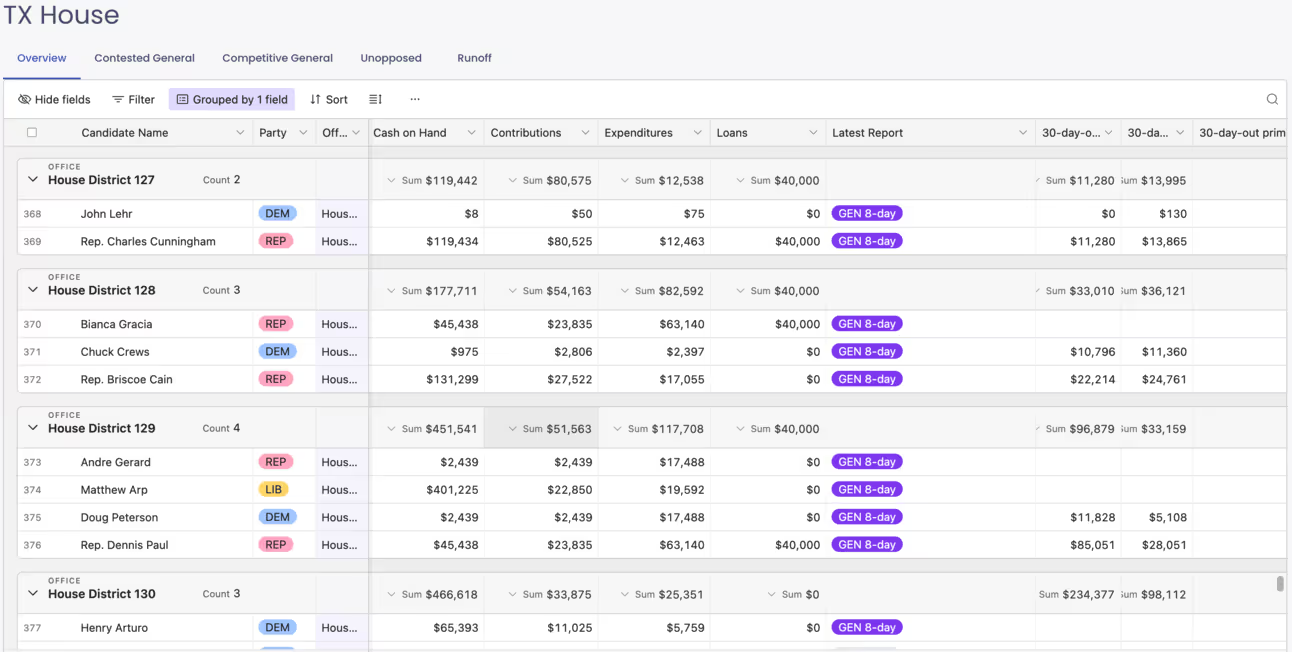
The 8-day-out campaign finance reports are now available. Visit USLege to access updated campaign finance data and insights.
We hope you enjoyed today’s read!

Announcing Our New Friday Forum 🗣️
We’re excited to announce a brand-new addition to your weekly TXLege News lineup: Friday Forum! 🎉
Every Friday, we’ll be sharing insightful opinion pieces that dive deep into the issues shaping Texas politics and business. Our goal is to provide diverse perspectives and spark thoughtful discussions around the policies impacting Texans.
What to Expect:
- Guest Contributors: Look forward to guest opinions from Texas political experts, advocates, and thought leaders.
- Focused on Issues: Each featured commentary will provide information and opinion about topics in the news or before the Legislature.
- Your Voice Matters: Have an opinion? Let us know! Email info@uslege.ai for submitting opinion contributions. Thanks to everyone who already has!
We understand that people will disagree on things written in the opinion articles. Therefore, we invite you to share your opinions as well.
We hope these Friday Opinion Pieces become a highlight of your week and bring you fresh perspectives on the issues you care about.
Stay tuned later today for our first edition—let us know what you think!
See what TXLege News Founder, Laura Carr, had to say about Friday Forum.
Best,
The TXLege News Team

Polls Show Trump and Cruz Leading; Trump-NBC Lawsuit and Roberson Case Jury Foreman’s Statement Draw Attention
Welcome back, friends
A recent Morning Consult poll shows former President Donald Trump with a seven-point lead over Vice President Kamala Harris in Texas, while Sen. Ted Cruz holds a narrower three-point advantage over challenger Rep. Colin Allred in the U.S. Senate race. Following early voting, Cruz’s campaign released a closing ad targeting Allred on issues including transgender women in sports, border security, and inflation—a move suggesting Cruz’s team sees the race as close, in line with recent polling data. Meanwhile, Republican presidential nominee Donald Trump has filed a lawsuit in Texas against CBS, claiming deceptive editing in a "60 Minutes" interview with Harris. Additionally, Steve Cubstead, jury foreman in the 2003 Robert Roberson case, has voiced opposition to calls for a retrial, reaffirming the original conviction based on substantial evidence.
Today’s Insights:
- Recent Texas Polling in Presidential and Senate Races
- Trump Files Texas Lawsuit Against CBS Over Interview Editing
- Jury Foreman Speaks Out in Robert Roberson Case
Recent Texas Polling in Presidential and Senate Races
According to a recent Morning Consult poll conducted from October 22-31, 2024, among 2,120 likely voters in Texas, former President Donald Trump leads Vice President Kamala Harris 52% to 45% in the 2024 presidential race, marking a seven-point advantage. In the U.S. Senate race, Sen. Ted Cruz holds a narrower lead over Democratic challenger Rep. Colin Allred, with Cruz at 47% and Allred at 44%. Following early voting, where most ballots have already been cast, Cruz’s campaign released a closing ad that targets Allred on three issues: his support for allowing transgender women in women’s sports, his stance on border security, and the topic of inflation. Cruz’s decision to run this ad after early voting suggests his team views the race as close, aligning with recent polling data that shows a competitive contest.
See Cruz campaign video posted Brad Johnson on X
Trump Files Texas Lawsuit Against CBS Over Interview Editing
Republican presidential nominee Donald Trump has filed a lawsuit in the Northern District of Texas against CBS, alleging that a "60 Minutes" interview with Vice President Kamala Harris was deceptively edited to misrepresent her statements. The lawsuit claims that the broadcast altered Harris's responses, creating a misleading narrative that impacted public perception. Filed in a court with only one judge—a 2019 Trump appointee—the case was guaranteed to be heard by this judge. Trump’s legal team argues that CBS’s editing practices constitute defamation, seeking redress under Texas law for the perceived harm.
Jury Foreman Speaks Out in Robert Roberson Case
Steve Cubstead, the jury foreman in the 2003 Anderson County trial that convicted Robert Roberson of murdering his two-year-old daughter, Nikki Curtis, has publicly criticized recent efforts to push for a retrial. Cubstead emphasized that the jury’s decision was based on extensive evidence, including bruises on Nikki’s face and a fractured skull, rather than solely on the disputed "Shaken Baby Syndrome" theory. He recently re-engaged with the case after Roberson’s attorney visited him at home, attempting to persuade him to review the evidence again—a request he declined. Cubstead refuted claims by a former juror that the jury’s decision was based only on Shaken Baby Syndrome, calling such statements misleading.
We hope you enjoyed today’s read!

Election Night Recap
Welcome to our election coverage! Tonight, we delve into the results of the races we've rated as competitive in our app, focusing on the U.S. Senate, Congress, Texas Senate, and Texas House. From significant Republican gains in South Texas to statewide Republican victories, Republicans have been on a statewide winning streak for 30 years. We'll break down the main themes and what these outcomes mean for the political landscape.
Ted Cruz Defeats Collin Allred
Cruz's victory secures another term in the U.S. Senate and reinforces the Republican hold on Texas's statewide offices. The race was seen as a test of Democratic momentum in Texas, but the results suggest that the state remains solidly in the Republican column. No Democratic candidate for U.S. Senate has won in Texas since 1988.
Former President Trump Wins Texas
Former President Donald Trump has secured a victory in Texas, further cementing the state's Republican-leaning presidential elections. Trump's policies and rhetoric continue to resonate with a significant portion of Texas voters, particularly on issues like immigration and the economy. No Democratic presidential candidate has won in Texas since 1976.
Republicans Gain Ground Compared to 2020
Republicans are performing stronger than they did in the 2020 elections. This trend is particularly evident in South Texas, where GOP candidates are making significant inroads in areas that have traditionally leaned Democratic. Factors such as shifting demographics, the GOP's focus on border security, economic development, and conservative social values played a role in the shift. We project the Republicans to pick up 2 state House seats and Republican challenger Hinojosa leads Sen. LaMantia which would be an additional seat to the Republicans.
All of the results below are unofficial and current as of publication time. For the most updated results, please visit the Texas Secretary of State's website.
US Senate Race
S1 - Rated as (Likely R)
Candidates:
- Republican (R): Ted Cruz (Incumbent) (54%) Winner
- Democrat (D): Collin Alred (44%)
- Libertarian (L): Ted Brown (2%)
Texas Senate Races
SD 27 - Rated as (Toss-Up)
Candidates:
- Republican (R): Adam Hinojosa (49%) Projected winner
- Democrat (D): Morgan LaMantia (48%)
- Libertarian (L): Robin Vargas (2%)
Texas Congressional Races
CD 28 - Rated as (Toss-Up)
Candidates:
- Republican (R): Jay Furman (48%)
- Democrat (D): Henry Cuellar (Incumbent) (52%) Winner
CD 34 - Rated as (Lean D)
Candidates:
- Republican (R): Mayra Flores (49%)
- Democrat (D): Vicente Gonzalez (Incumbent) (51%) Winner
Texas House District Races
HD 34 - Rated as (Lean D)
Candidates:
- Republican (R): Denise Villalobos (55%) Winner
- Democrat (D): Solomon Ortiz (44%)
HD 37 - Rated as (Lean R)
Candidates:
- Republican (R): Janie Lopez (Incumbent) (55%) Winner
- Democrat (D): Jonathan Gracia (45%)
HD 41 - Rated as (Lean D)
Candidates:
- Republican (R): John (Doc) Robert Guerra 46%
- Democrat (D): Bobby Guerra (Incumbent) 53% Winner
HD 52 - Rated as (Lean R)
Candidates:
- Republican (R): Caroline Harris Davila (Incumbent)(56%) Winner
- Democrat (D): Jennie Birkholz (44%)
HD 63 - Rated as (Lean R)
Candidates:
- Republican (R): Ben Bumgarner (Incumbent) (56%) Winner
- Democrat (D): Michelle Beckley (44%)
HD 70 - Rated as (Lean D)
Candidates:
- Republican (R): Steven Kinard (48%)
- Democrat (D): Mihaela Plesa (Incumbent) 52% Winner
HD 74 - Rated as (Lean R)
Candidates:
- Republican (R): Robert Garza 52% Winner
- Democrat (D): Eddie Morales (Incumbent) 48%
HD 80 - Rated as (Likely R)
Candidates:
- Republican (R): Don McLaughlin (63%) Winner
- Democrat (D): Cecilia Castellano (37%)
HD 94 - Rated as (Lean R)
Candidates:
- Republican (R): Tony Tinderholt (Incumbent) (56%) Winner
- Democrat (D): Denise Wilkerson (44%)
HD 96 - Rated as (Lean R)
Candidates:
- Republican (R): David Cook (Incumbent) (57%) Winner
- Democrat (D): Ebony Turner (42%)
HD 108 - Rated as (Lean R)
Candidates:
- Republican (R): Morgan Meyer (Incumbent) (58%) Winner
- Democrat (D): Elizabeth Ginsberg (41%)
HD 112 - Rated as (Toss Up)
Candidates:
- Republican (R): Angie Chen Button (Incumbent) (55%) Winner
- Democrat (D): Averie Bishop (45%)
HD 118 - Rated as (Toss Up)
Candidates:
- Republican (R): John Lujan (Incumbent) (52%) Winner
- Democrat (D): Kristian Carranza (48%)
HD 121 - Rated as (Lean R)
Candidates:
- Republican (R): Marc LaHood (53%) Winner
- Democrat (D): Laurel Jordan Swift (47%)
HD 122 - Rated as (Lean R)
Candidates:
- Republican (R): Mark Dorazio (Incumbent) (58%) Winner
- Democrat (D): Kevin Geary (42%)
We hope you enjoyed today’s read!

The Reddening of the Hispanic Vote
The Reddening of the Hispanic Vote
by Jeff Blaylock
Boyz II Men had the No. 1 song, and Tim Allen’s The Santa Clause was No. 1 at the box office. As AOL was cheerfully announced we had mail, Zip Disks began freeing us from the tyranny of floppies. The Dallas Cowboys were Super Bowl champions.
That was the most recent time Texas voters elected Democrats to statewide offices. Since then, the last 167 candidates elected statewide in Texas have been Republicans, including the eight who won on Tuesday. The voters of every other state have elected at least one Democrat statewide since Texas last did it, including states much redder than Texas is today.
Thirty years of losing … and counting. There have been a few “almosts” like John Sharp and Paul Hobby in 1998, the Barack Obama wave of 2008 and Beto O’Rourke six years ago. There was no “almost” about this year’s election. Tuesday’s results reinforced not only the gap between the two parties but also the rapid erosion of the Democratic brand among Hispanic and Latino voters.
Exit polling indicates Hispanic/Latino voters favored former President Trump over Vice President Harris, 55%-44%, but that was not the most surprising data point. More revelatory is realizing Hispanic/Latino men (64%-35%, +29%) voted for Trump at a rate much closer to White men (68%-29%, +39%) than Hispanic/Latino women (43%-55%, minus-12%). Trump’s campaign was especially aimed at men, and it appears that strategy has worked and continues to work.
But we don’t need exit polling to reveal the increasing success of Republican candidates among Hispanic/Latino voters. We just need to look at the map.
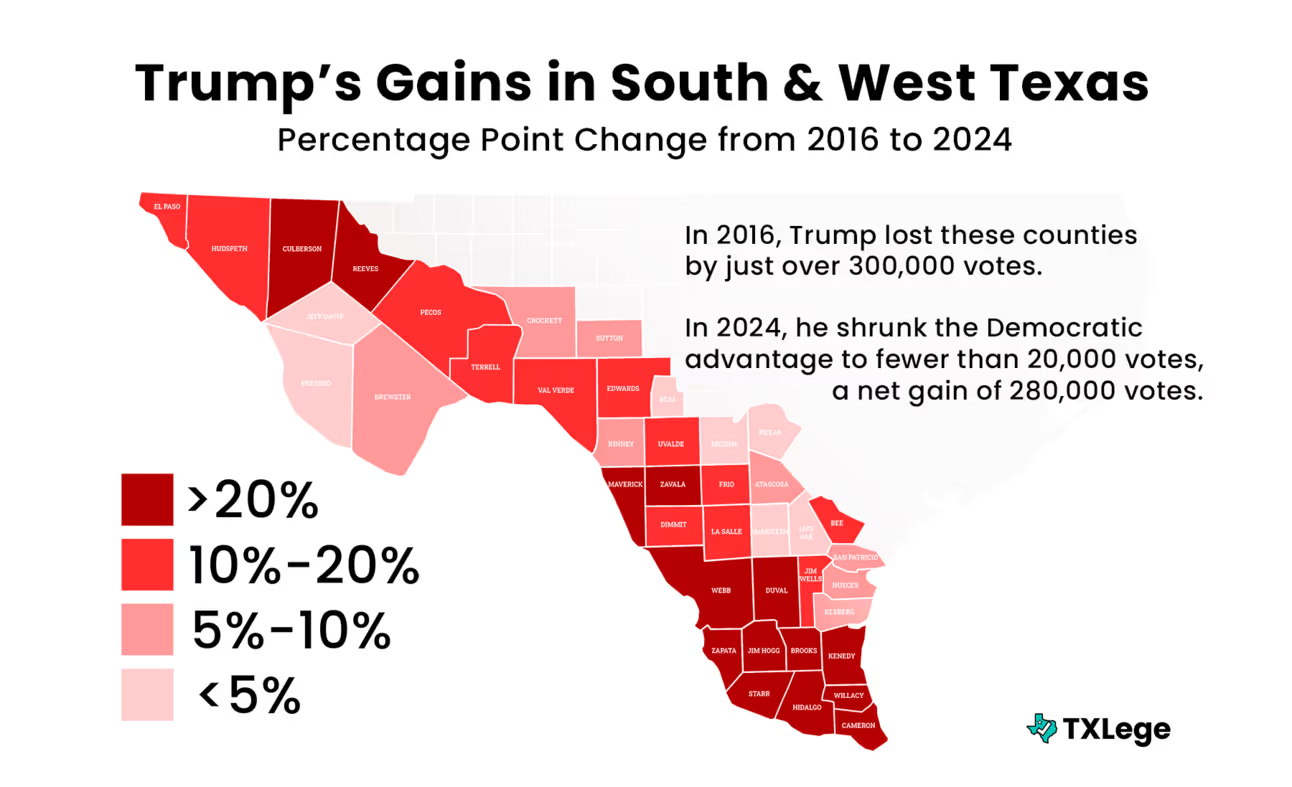
The reddening of South and West Texas accelerated since Trump’s first election in 2016. Trump improved his performance in every one of these counties, many of them by more than 10 points – 14 of them by more than 20 points. His 52.5% in Cameron Co. is 20.5 percentage points higher than his 32.0% in 2016. In Hidalgo Co., Trump received 51.0% percent of the vote, up 23.0 points from 2016. In Webb Co., Trump won with 50.7% of the vote, up 28.1 points from his first run for president.
His vote share rose 39% in Starr Co., 38% in Maverick Co., 28% in Zapata, 25% in Jim Hogg Co., 22% in Zavala Co., 21% in Brooks and Willacy counties and almost 20% in Val Verde Co. Overall, he improved his performance among the dozen border counties by 20.9 percentage points over 2016, carrying all but two of them. In 2016, he won five of them.
Whatever advantage Democrats had historically relied upon in South Texas is largely gone. Clinton’s nearly 240,000 net vote advantage from border counties in 2016 has shrunk to just over 11,000 votes. Among all the counties shown on the map, a net margin of over 300,000 votes for Democrats has shrunk to fewer than 20,000 votes.
We have not explored precinct-level data yet, but I suspect Trump gained support among Hispanics and Latinos in the urban and counties that have lately been Democratic strongholds. In 2020, President Biden received more than 923,000 net votes in Dallas, Harris, Travis and Bexar counties combined. Trump cut that margin to around 567,000 net votes this year, a shift of more than 350,000 votes.
Put together, these are staggering losses of net votes coming from the only areas Democrats have performed well in recent elections. The rest of the state is a rural red wall.
Trump’s margin in counties with fewer than 20,000 registered voters almost completely offset Harris’s advantage in counties with at least 500,000 registered voters. The counties in between are solidly red. Harris won exactly one county with between 20,000 and 500,000 registered voters: Hays.
Trump received at least 80% of the vote in 129 of the state’s 254 counties. Harris had single-digit support in two dozen counties. Trump’s worst performance was 29.4% in Travis Co. Harris cleared that figure in just over 50 counties. Trump’s advantage in counties with fewer than 50,000 registered voters exceeded 900,000 net votes. Add the counties with between 50,000 and 100,000 registered voters, and the Republican’s advantage rose to 1.3 million votes. As of this writing, that’s more than the total number of votes cast for any candidate in at least 20 different states.
We have focused this analysis on the presidential race. Keep in mind that Trump slightly under-performed other Republican statewide candidates, as he has in every election. The statewide judicial candidates averaged 58%, a little over a point and a half above Trump.
There are only three methods to increase a political party’s share of the vote: convert existing voters from the other party, win crossover votes for specific candidates and attract new voters. Republicans have the edge in the first method as evidenced by the map above. Crossover voting has become increasingly rare, at least at the statewide level. Roughly 1 out of every 55 voters selected Allred and otherwise mostly if not entirely Republican candidates. This is not surprising. It’s been six years since single-punch, straight-party voting was an option, but its popularity had grown until it was being used by seven out of every 10 voters.
That leaves new voters, a group that historically votes at much lower rates than recent voters. New voters fall into four basic buckets: Texans who haven’t registered to vote, Texans who are registered but haven’t voted, new Texans who recently moved into the state and young adult Texans turning 18.
Starting with the last group, voters under age 24 favored Trump, 54%-43%, according to exit polling. At least for now, that option is not particularly great for Democrats.
The potential impact of the other three groups is harder to tease out, largely because many more of them don’t vote than do. Those that have voted left behind some breadcrumbs. According to the exit poll, the 9% of voters who answered yes to “Is this the first year you have ever voted?” went to Trump, 80%-19%. According to Derek Ryan’s analysis of primary voting, around 30,000 voters with “no voting history” cast ballots early in this year’s Republican primary compared to around 18,000 in the Democratic primary. So new voters seem to be more in the Republican column, on balance, at least for now.
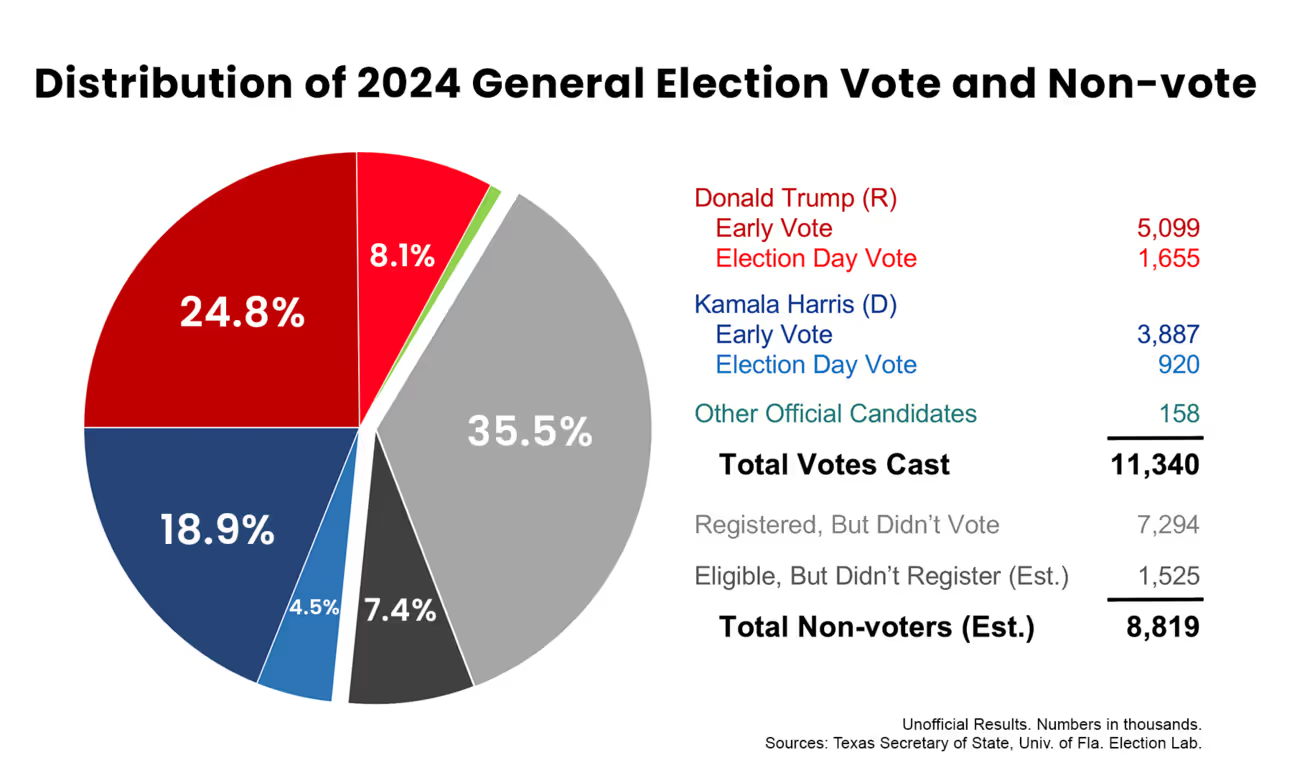
That leaves non-voters, and there are a lot of them. More than 7 million registered voters did not cast a ballot in this year’s presidential election. Another 1.5 million or so Texans who are eligible to vote were not registered in time to vote in last week’s election.
Sadly, neither of these figures is new or unusual. At least 5 million registered voters did not vote in each even-year general election since 1998. At least 1.5 million eligible Texans were not registered to vote in each even-year general election since 2010 (In other words, since the Obama blue wave of 2008).
Getting non-voters to the polls has historically been quite a challenge. Frequent voters tend to vote. Non-voters tend not to vote. #analysis
Going into the 2020 election, there were almost 5 million Texans who had voted in at least one of the last four general election but no primary elections, according to Derek Ryan. More than 2 million of them didn’t vote in 2020. There were even more registered voters with no recent voting history whatsoever (This would include newly registered voters.). More than 4 million of them didn’t vote in 2020.
Coming into 2024, these two groups of sporadic voters and non-voting registrants accounted for more around two thirds of Texans registered to vote in last week’s election. We do not have final figures on their participation, but it is unlikely to be very different from most past years. In other words, much lower than frequent voters.
If, on balance, new voters are trending Republican, converted voters are turning Republican, non-voters are hard to motivate, and everyone else was already favoring Republicans, then there is very little fertile ground left aside from unregistered but eligible Texans, a group that is surely unlikely to vote in huge enough numbers even if they were registered.
That’s not to say it is impossible. In 2026, Democratic candidates will be running against the Trump White House rather than away from Biden. For Democratic candidates, 2018 was undoubtedly a better year than 2016. It wasn’t enough, but it was better. No one truly knows what the economy will be like in two years or how world events may shape voters’ opinions. No one can predict if voters might sour on Republicans’ more conservative agenda sure to be enacted this session. Inspirational candidates may arise.
The road, already long traveled, remains long and difficult. With a broken brand and a lack of avenues to win over voters, Democrats are poised to continue their statewide losing streak.
Jeff Blaylock is the founder of TXElects Legacy & Senior Editor of TXLege News. You can follow Jeff on X and LinkedIn.
We hope you enjoyed today’s read!

Texas Legislature Kicks Off with Record Bill Filings and Leadership Races
Welcome back, friends
Senator John Cornyn is running for Senate Majority Leader, facing opposition from some conservatives who back Florida’s Senator Rick Scott for the role. In the Texas House, several candidates from both parties, including Speaker Dade Phelan, have declared their candidacies for House Speaker. Meanwhile, Texas lawmakers set a record for pre-filed bills this session, introducing over 1,500 proposals on topics such as education, property taxes, and healthcare. Speaker Phelan has outlined plans to expedite committee assignments and agency oversight to ensure a productive session.
Today’s Insights:
- Sen. Cornyn Runs for Senate Majority Leader Amid Opposition
- Texas Legislature Sets Record with Over 1,500 Bills Pre-Filed for 2025 Session
- Speaker Phelan Outlines House Priorities and Early Oversight Plans
- Multiple Candidates File for Texas House Speaker
Sen. Cornyn Runs for Senate Majority Leader Amid Opposition
With Republicans set to take the majority in the U.S. Senate, Texas Senator John Cornyn is campaigning for Senate Majority Leader. However, some conservative groups and public figures have voiced support for Florida Senator Rick Scott as an alternative candidate. Cornyn, a long-serving senator with extensive experience on Senate committees, has emphasized his commitment to procedural reforms. The leadership election, which will be decided by a secret-ballot vote of Republican senators, is scheduled for Wednesday.
Texas Legislature Sets Record with Over 1,500 Bills Pre-Filed for 2025 Session
On the first day of bill pre-filing for the 89th Texas legislative session, lawmakers filed more than 1,500 bills—the highest early total in recent years. This includes 1,207 bills in the House and 304 in the Senate, addressing issues such as education funding, property tax reform, and healthcare. The record-breaking number of pre-filed bills indicates a busy legislative session ahead, with lawmakers preparing to tackle a wide range of topics affecting Texans. USLege offers tools to track these bills as they progress, providing real-time updates and analysis to help stay informed about key legislative developments.
Speaker Phelan Outlines House Priorities and Early Oversight Plans
Texas House Speaker Dade Phelan has announced that bill numbers 1 through 150 will be reserved for high-priority legislation in the upcoming session. These reserved numbers are set aside for bills with broad support among House members and those aligned with statewide goals or potential emergency items designated by Governor Greg Abbott. Additionally, Speaker Phelan plans to expedite committee assignments and begin agency oversight hearings early in the session, allowing committees to review state agency operations before bill referrals begin.
Multiple Candidates File for Texas House Speaker
Several Texas House members have declared their candidacies for Speaker of the House ahead of the 89th legislative session. Legislators who declared their candidacy for Speaker are: current Speaker Dade Phelan, John Bryant, David L. Cook, James B. Frank, Thomas John "Tom" Oliverson, Ana-Maria Rodriguez Ramos, Shelby L. Slawson, and John T. Smithee. The Republican Caucus is scheduled to meet on December 7 to select their preferred candidate for the role. The final election for Speaker will take place in January, when House members will vote to determine their leader for the upcoming session.
We hope you enjoyed today’s read!

Texas Political Spotlight: Speaker Race Commentary and Local Elections
Welcome back, friends
Former Texas Gov. Rick Perry commented on the Texas House Speaker race, expressing confidence in Speaker Dade Phelan's position while downplaying Rep. David Cook's candidacy. Meanwhile, Kirk Watson was reelected as Austin Mayor, highlighting the importance of local elections amid state-level political maneuvering.
Today’s Insights:
- Perry Weighs in on Texas House Speaker Race
- Watson Secures Another Term as Austin Mayor
Perry Weighs in on Texas House Speaker Race
Former Gov. Rick Perry voiced his opinion on the Texas House Speaker race during a public interview, stating his confidence in Speaker Dade Phelan's ability to retain his role. Perry remarked, “Phelan has the votes, I'm not concerned about that,” and expressed unfamiliarity with Rep. David Cook, who is challenging Phelan for the position. Perry’s comments add to the growing discussion around leadership and policy direction in the Texas Legislature. This comes as Phelan faces challenges from some conservative lawmakers over key legislative priorities.
Watson Secures Another Term as Austin Mayor
Kirk Watson has won reelection as Austin Mayor, narrowly avoiding a runoff against Carmen Pulido. On Election Night, it appeared Watson might finish short of the 50% plus 1 threshold, but overseas and provisional ballots counted since then secured the win, pending a likely recount. Watson's reelection highlights the continued trust in his leadership among Austin voters and reaffirms his agenda for progressive city reforms.
Article 3
We hope you enjoyed today’s read!

Texas Political Spotlight: Greg Abbott Thinks Texas is Ready for Nuclear Energy
Welcome back, friends
Governor Greg Abbott emphasized that advanced nuclear power will strengthen the state’s energy grid and position Texas as a global leader in the industry.
Today’s Insights:
- Texas is Gearing up for Nuclear Energy
- Dan Patrick’s Latest Legislative Priority: Dementia Research
- Musk Joined at SpaceX Launch by Trump
Texas is Gearing up for Nuclear Energy
Governor Greg Abbott and the Public Utility Commission of Texas released a report outlining Texas’ strategy to develop an advanced nuclear power industry. Over the past year, a working group formed by Abbott studied the state’s potential for advanced nuclear reactors, recommending financial incentives, regulatory improvements, and streamlined permitting to facilitate development. The group emphasized Texas’ readiness to lead, citing resources, workforce, funding, and 61 evaluated sites suitable for reactor deployment. Advanced nuclear is expected to provide reliable, clean energy for industrial and military facilities, create significant economic growth, and position Texas as a leader in the global nuclear market. Additionally, Texas A&M University is taking steps to host next-generation reactor testing at its RELLIS campus, further supporting the state’s nuclear ambitions.
Dan Patrick’s Latest Legislative Priority: Dementia Research
On Tuesday, Lt. Gov. Dan Patrick proposed creating the Dementia Prevention Research Institute of Texas, modeled after the successful counterpart institute for Cancer Prevention, the CPRIT. This new research institute initiative aims to attract leading dementia researchers and companies to Texas soil. Senate Finance Chair Joan Huffman will author the bill, with bipartisan support anticipated, followed by a constitutional amendment requiring voter approval. Patrick highlighted CPRIT’s success, which attracted world-class cancer research to Texas and resulted in institutions like UT M.D. Anderson Cancer Center becoming globally renowned.
Per Patrick, “Dementia, and especially Alzheimer’s, touches so many families today. It is a heart breaking and devastating disease. Just as we are leading on cancer research, Texas can be a world leader in combatting Dementia, finding treatment and, one day, a cure.”
Musk Joined at SpaceX Launch by Trump
Over the past two weeks, Donald Trump and Elon Musk have solidified a close relationship, highlighted by Trump attending a SpaceX Starship launch in South Texas. Musk hosted the president-elect, explaining the test and showcasing a model of the rocket before liftoff. While the reusable booster didn’t return to the launch pad as planned, the event symbolized the growing bond between the two influential figures. This partnership carries implications for politics (both state and federal), government operations, foreign policy, and the future of space exploration, including potential missions to Mars.
We hope you enjoyed today’s read!

Texas Political Spotlight
Welcome back, friends
President-elect Donald Trump has nominated former Texas state lawmaker Scott Turner to lead the Department of Housing and Urban Development.
Today’s Insights:
- Trump Appoints Former State Lawmaker to Cabinet
- University of Texas System Expands Free Tuition Program
- Freeman Martin to Serve as New DPS Director
Trump Appoints Former State Lawmaker to Cabinet
President-elect Donald Trump has nominated former Texas state lawmaker Scott Turner to lead the Department of Housing and Urban Development. Turner, who served in the Texas House from 2013 to 2017 and previously worked as executive director of the White House Opportunity and Revitalization Council, will oversee HUD and advise on housing issues if confirmed. A University of Illinois graduate and former NFL player, Turner also founded the Community Engagement & Opportunity Council and holds leadership roles in organizations focused on education and economic opportunity. Other Texans nominated for roles in Trump’s administration include John Ratcliffe for CIA director.
University of Texas System Expands Free Tuition Program
The University of Texas System is expanding its free tuition program to cover tuition and fees for undergraduate students whose families earn $100,000 or less, starting next fall. The expansion, funded by a $35 million allocation, will apply to all nine universities in the system and aims to increase access to affordable education while reducing student debt. Students must be Texas residents, enrolled full-time, and apply for financial aid to qualify. UT leaders highlighted the program’s role in lowering the percentage of graduates with debt, which dropped from 54% in 2019 to 48% in 2023.
Freeman Martin to Serve as New DPS Director
Freeman Martin has been appointed as the new executive director of the Texas Department of Public Safety (DPS), beginning December 1st. A 33-year veteran of the agency, Martin started as a highway patrol trooper in 1990 and rose through the ranks, serving as a Texas Ranger, regional commander for central Texas, and deputy director. He has led DPS responses to significant crises, including Hurricane Harvey and the Sutherland Springs mass shooting, and spearheaded initiatives such as establishing a Texas Anti-Gang Center in San Antonio. As executive director, Martin will oversee over 11,000 employees, a $2 billion budget, and statewide law enforcement operations.
We hope you enjoyed today’s read!

Texas Political Spotlight: Happy Thanksgiving Texas
We are beyond thankful for your support of our platform and hope you enjoy the start of the holiday season. With that being said, Texas news never stops, so neither do we.
Please enjoy today’s snippets and have a great Thanksgiving!
Today’s Insights:
- Incoming Border Czar, Tom Homan, Visits Texas
- PUC Adopts New Crypto Mining Registration Rule
- Rice University Reports Texas at Risk for Water Crisis
Incoming Border Czar, Tom Homan, Visits Texas
During a visit to the Texas-Mexico border, Tom Homan, Donald Trump’s designated "border czar," pledged aggressive actions to address immigration, including plans for mass deportations. Accompanied by Governor Greg Abbott, Homan criticized the Biden administration's handling of border security and emphasized that preparations for Trump’s immigration policies are already underway. During their visit, they served meals to National Guard soldiers and Department of Public Safety troopers stationed as part of Operation Lone Star, Governor Abbott's border initiative launched in 2021 to address immigration concerns. Despite declining illegal border crossings under the Biden administration, Governor Abbott defended Texas' ongoing response on Tuesday, arguing that the state is upholding federal immigration laws, about which Abbott said the Biden administration’s enforcement fell short.
PUC Adopts New Crypto Mining Registration Rule
Cryptocurrency mining's rapid growth in Texas has prompted new regulations to safeguard the state’s electric grid. Texas has become a popular destination for crypto miners due to its relatively low energy costs and deregulated electricity market, which incentivizes industrial-scale operations. A recently adopted rule requires facilities consuming over 75 megawatts of power to register with the state’s grid operator, as mandated by a 2023 law. These facilities must disclose their location, ownership, electricity demand, and anticipated peak load for the next five years to ensure the grid’s reliability. Crypto mining consumes vast amounts of electricity but can adjust power usage quickly during grid strain. Facilities must register by February 1 annually, with penalties of up to $25,000 per day for non-compliance.
Rice University Reports Texas at Risk for Water Crisis
A new report from Rice University’s Baker Institute highlights a long-term water supply deficit in Texas, posing risks to the state’s economy and infrastructure. It estimates that a severe drought, similar to the one in the 1950s, could result in $160 billion in annual GDP losses, 800,000 lost jobs, and create a significant population migration by 2030. The report also warns of potential energy generation disruptions, including rolling blackouts, and notes that deteriorating infrastructure could contribute to $320 billion in economic losses. By 2070, the state could face a water deficit of 6.9 million acre-feet, requiring an estimated $154 billion in investments for new water supplies and system repairs. The study calls for increased attention to water infrastructure funding to help mitigate these challenges and protect Texas’ future.
We hope you enjoyed today’s read!

Texas Political Spotlight: Texas House Leadership Battle
Welcome back, friends
Incumbent Speaker Dade Phelan faces a challenge from Republican David Cook, with the outcome likely to shape the state's legislative agenda and political landscape.
Today’s Insights:
- Texas House Leadership Battle
- State Vehicle Inspection’s Ending Soon
- Texas’ Razor Wire Border Strategy
Texas House Leadership Battle
In the coming days, Texas House Republicans and Democrats will convene separately to choose their caucus leaders, including their preferred candidate for Speaker of the House. These closed-door meetings, scheduled for early December, will play a pivotal role in shaping the leadership and priorities for the next legislative session. Incumbent Speaker Dade Phelan faces a challenge from Republican David Cook, reflecting divisions within the GOP over issues such as committee chair assignments and policy priorities. While Cook claims support from a majority of House Republicans, Phelan's path to retaining the Speakership may depend on securing bipartisan backing. The outcome of this race will not only set the tone for the House's legislative agenda but also signal the balance of power and unity within Texas politics.
State Vehicle Inspections Ending Soon
Starting January 1, 2025, Texas will no longer require annual safety inspections for non-commercial vehicles, but registration fees will increase by $7.50 to compensate. Vehicles in certain counties, including Houston, Dallas-Fort Worth, Austin, and El Paso areas, must still pass annual emissions tests, with San Antonio following suit in 2026. Commercial vehicles will remain subject to safety inspections regardless of location. This change, introduced through House Bill 3291, aims to streamline registration while maintaining environmental standards in high-density regions.
Texas’ Razor Wire Border Strategy
Texas has installed over 100 miles of razor wire along critical southern border crossing points as part of "Operation Lonestar," a multi-billion-dollar border enforcement effort. A federal appeals court recently upheld Texas’ right to maintain these barriers, with supporters citing a significant drop in illegal crossings in areas where wire was deployed. Critics, however, highlight the humanitarian and logistical challenges, including increased migrant injuries and the constant need for maintenance. With the recent visit of future border czar, Tom Homan, proponents are arguing that the wire serves as an effective deterrent while opponents are questioning its long-term sustainability and ethical implications.
We hope you enjoyed today’s read!

Texas Political Spotlight: Mavericks’ Majority Owner is Betting Big on Gambling Expansion
Welcome back, friends
Proposals continue to evolve as lawmakers balance potential opportunities with careful consideration of existing regulations.
Today’s Insights:
- Mavericks’ Majority Owner is Betting Big on Gambling Expansion
- Senator Cruz Pushes for Release of Military-Controlled Spectrum
Mavericks’ Majority Owner is Betting Big on Gambling Expansion
Although the Adelson family, majority owners of the Dallas Mavericks, spent up to $9 million on lobbying to expand legalized gambling in Texas in 2023, those efforts have yet to gain significant traction in the state legislature. During the 2023 session, a mobile betting bill passed the Texas House, HB 1942, and a casino-related bill, HB 2843, stalled. Lt. Gov. Dan Patrick has previously refused to advance gambling legislation in the Senate, citing a lack of support among Senate Republicans and emphasizing passage of other voter priorities.
During the 2023-24 election cycle, Miriam Adelson contributed $13.7 million to support predominantly Republican candidates via the Texas Defense PAC and Texas Sands PAC among others. This was more than quadruple the amount she contributed during the previous election cycle. Adelson’s push aligns with various efforts to expand legalized gambling in the state.
Lawmakers are expected to introduce gambling-related bills as the 2025 session prepares to convene, including SJR 16 (Alvarado) which would permit sports wagering, create the Texas Gaming Commission, and foster the creation of five destination resorts here in Texas. However, public opposition from key leaders like Patrick may once again keep the issue from advancing in the Senate.
Image Credit: Natalie Venegas, Newsweek
Senator Cruz Pushes for Release of Military-Controlled Spectrum
As Sen. Ted Cruz prepares to lead the Senate Commerce, Science, and Transportation Committee, one of his priorities will be increasing the availability of U.S.-held spectrum. Much of the mid-band spectrum is currently controlled by the U.S. Department of Defense, which uses it for critical military operations such as communications and radar. Cellular companies are eager to access this spectrum to keep up with the explosive growth in data usage, particularly as they expand 5G networks. Cruz argues that releasing this spectrum would create jobs and economic growth, but the military has been reluctant to give up the spectrum it holds.
The U.S. risks falling behind nations like China and South Korea in developing 5G and future 6G technology due to the limited availability of spectrum. The ongoing debate highlights the challenge of balancing military needs with the growing demand for wireless services in an increasingly connected world.
We hope you enjoyed today’s read!

Texas Political Spotlight: Texas GOP Divided on THC Ban Plans
Welcome back, friends
Miller urges GOP unity on the issue and supports expanding medical marijuana access while opposing recreational use.
Today’s Insights:
- Texas GOP Divided on THC Ban Plans
- Lawmakers Eye Social Media Restrictions for Minors
- Texas Grid Ready for Winter, but Cold Risks Remain
Texas GOP Divided on THC Ban Plans
Texas Agriculture Commissioner Sid Miller disagrees with Lt. Gov. Dan Patrick on the future of THC in the state. Patrick recently announced a bill to ban all consumable THC but clarified it would not impact the Compassionate Use Program for medical cannabis. Miller, however, believes the GOP should unify on this issue and reflect the will of Texans, citing a Texas Lyceum Poll where 60% supported marijuana legalization. Although Miller opposes recreational marijuana use, he advocates for expanding medical marijuana access to all Texans with legitimate needs. He states:
“It’s about freedom. It's about less regulation. It's about less government. It's about freedom between you and your doctor and getting government out of your life.”
"So, I think it's a conservative issue."
Lawmakers Eye Social Media Restrictions for Minors
Texas lawmakers are considering measures to protect children from online dangers, including a proposed ban on minors creating social media accounts, outlined in House Bill 186 filed by Rep. Jared Patterson. Educators and law enforcement officials have raised concerns about cyberbullying, online grooming, and exposure to harmful content, much of which originates from students’ widespread access to smartphones, including on school campuses. Schools report difficulties in addressing these issues due to limited resources and students’ ability to bypass campus internet restrictions.
During legislative hearings, testimony highlighted the impacts of social media on minors, including cases of mental health struggles, exploitation, and grooming facilitated by online platforms. Proposed solutions include funding internet crimes units, deploying artificial intelligence to detect explicit content, and strengthening legal requirements for technology companies to monitor and remove harmful material. Law enforcement agencies report being inundated with thousands of monthly tips about online child exploitation but face challenges due to staffing shortages.
Supporters of House Bill 186 and other proposed initiatives point to studies showing nearly all teens and many younger children regularly use social media, often without adequate safeguards. The upcoming legislative session will prioritize addressing these risks while navigating challenges around enforcement and the role of technology companies.
Texas Grid Ready for Winter, but Cold Risks Remain
Texas’ main power grid is better prepared for extreme cold this winter, thanks to new power generation and weatherization improvements made since the devastating 2021 Winter Storm Uri. ERCOT officials highlighted the addition of over 10,000 megawatts of capacity, including 5,155 megawatts of solar power, 3,693 megawatts of storage, 724 megawatts of natural gas, and 616 megawatts of wind. These upgrades have reduced the risk of grid emergencies during peak demand from 11.6% last winter to 8.7% this year. ERCOT meteorologist Chris Coleman forecasts a warmer-than-average winter overall but warned of a higher likelihood of extreme cold events, with current atmospheric patterns resembling those seen during Uri.
Governor Greg Abbott emphasized the state’s readiness this past week, pointing to legislative measures and ERCOT’s 2,892 inspections of facilities to enforce new weatherization standards. Despite the improvements, ERCOT acknowledged ongoing challenges, such as increased winter electricity demand, which reached a record-breaking 78,349 megawatts in January 2023. Additionally, renewable sources like solar and wind generate less power during cold months, making consistent supply a concern. Officials noted that while conditions are better than in 2021, another extreme storm would still test the grid’s resilience.
We hope you enjoyed today’s read!

Texas Political Spotlight: Senator Bettencourt Revives Election Irregularity Bill
Welcome back, friends
Supporters argue the measure will enhance election transparency and accountability. Critics warn it could overwhelm election officials, divert resources, and undermine public trust in the process.
Today’s Insights:
- Senator Bettencourt Revives Election Irregularity Bill
- Rep. Wu Voices Concern over Texas’ Aim at China
- Webb County Judge Flips to The Republican Party
Senator Bettencourt Revives Election Irregularity Bill
Texas lawmakers are revisiting a bill (SB 505) requiring election officials to address election irregularity concerns from candidates, party officials, and election workers within strict time frames. If unsatisfied, complainants could escalate issues to the Texas Secretary of State’s Office, which would decide whether to investigate further. Proponents, such as Sen. Paul Bettencourt, argue the legislation will enhance transparency and accountability in elections. Critics, such as Daniel Griffith, senior director of policy as Secure Democracy, caution that it could overwhelm election officials already managing high workloads, potentially diverting resources from essential duties and undermining public trust. The bill is similar to prior proposals by Bettencourt, which passed in the Senate but not the House. It stems from election controversies, such as paper shortages and equipment failures in Harris County during the 2022 election. While Bettencourt claims the bill sets a structured process for addressing concerns, experts worry it may lead to administrative inefficiencies and heightened skepticism about election integrity.
Rep. Wu Voices Concern Over Texas’ Aim at China
Governor Greg Abbott has taken steps to target foreign government operatives and to divest state funds from businesses with direct ties to the Chinese government, signaling a possible shift in Texas' approach to perceived foreign adversaries. The issue will likely be considered in the upcoming session. While some, like Representative Gene Wu, is supportive of protective actions, he is concerned about the potential for unintended consequences, particularly a rise in anti-Asian sentiment. He argues that such actions, without clear context, could lead to public harassment of individuals with Chinese heritage, who are not connected to the Chinese government. Wu also raises concerns about the economic impact, noting that many Texas industries, particularly in petrochemicals, rely on Chinese investment, providing high-paying jobs and significant capital.
"If we can't do business with anybody from China, fine, then just say so. Then let's go ahead and shut down Walmart. Let's go ahead and shut down Target. Let's go ahead and shut down all this different trade we have. They're all companies that are based in China. If you look at your vehicle, most of your parts, a lot of the plastic, the seats, everything is produced in China. So are we going to say, 'well, we're not going to buy American cars either because some of their parts came from China.' Where does this end?”
- Gene Wu on Fox 7 Austin
He advocates for more cooperation, cultural exchanges, and dialogue to resolve security issues, instead of escalating tensions that could harm Texas' economy. Wu questions whether a state-level trade war could be effective, pointing out that many everyday goods, including car parts, are produced in China, and suggests addressing the broader issues with a more pragmatic approach.
Webb County Judge Flips to The Republican Party
Webb County Judge Tano Tijerina announced his switch from the Democratic Party to the Republican Party, citing the national Democrats’ move to the left and his conservative values as reasons for the change. Tijerina, who has served as county judge since 2015 and was reelected for a third term in 2022, stated that his decision followed discussions with family and community, as well as reflection and prayer. He emphasized that his philosophy has not changed, explaining that South Texas Democrats tend to be more conservative than their national counterparts. Tijerina highlighted border security, support for the oil and gas industry, and opposition to "woke movements" as key factors in his decision. While he previously opposed a border wall, he voted in 2020 to allow the federal government access to county property for its construction, citing financial concerns. His decision comes as Webb County showed increasing support for Republican policies, demonstrated by Trump’s local victory in the 2020 election, despite Democrats winning most other races. President-elect Trump carried Webb County by nearly 1,500 votes in 2024 after losing it to President Biden by nearly 16,000 votes in 2020 and to Hillary Clinton by nearly 30,000 votes in 2016.
We hope you enjoyed today’s read!

Texas Political Spotlight
Welcome back, friends
Texas lawmakers are entering the 2025 legislative session with a $20 billion surplus, offering an unprecedented chance to tackle critical needs like infrastructure, education, and water systems. With opportunities to invest in transformative, long-term solutions, the decisions made could shape Texas' future growth for generations.
Today’s Insights:
- Texas’ Historical Surplus Opportunity
- New Higher Ed Leader Aims to Boost Access and Workforce Readiness in Texas
- SpaceX Seeking to Incorporate Its Texas Headquarters Into Its Own City
Texas’ Historical Surplus Opportunity
Texas lawmakers will enter the 89th legislative session in January 2025 with an estimated $20 billion in unspent funds, creating a unique opportunity to address a range of critical needs. Comptroller Glenn Hegar highlighted the state’s strong economy, driven largely by sales tax revenues, and stressed the importance of using the surplus to tackle pressing issues like infrastructure, public education, and water systems. Lawmakers are also expected to revisit funding for public education, with a dedicated $4.5 billion set aside in 2023 for teacher pay raises and school improvements.
“This is a unique opportunity that we won't have again, to set up some kind of investment fund, like the permanent school fund, like the [state] highway fund—set something up that would be ongoing in perpetuity to help us fund that infrastructure,”
- Rep. Donna Howard
During the last legislative session, lawmakers approved a $321 billion biennial budget. Looking ahead, allocating the current surplus could face additional complexities, particularly with potential changes in the House Appropriations Committee under a new Speaker. This shift could influence how the surplus aligns with legislative priorities.
New Higher Ed Leader Aims to Boost Access and Workforce Readiness in Texas
Wynn Rosser, a rural East Texan with deep ties to his community, will lead Texas' higher education agency starting in the new year. As commissioner, he will oversee the Coordinating Board’s $2.9 billion budget, which funds financial aid programs and implements the state's vision for higher education. Rosser emphasized the importance of increasing access to postsecondary education, particularly for low-income Texans, by expanding financial aid and emphasizing credentials like associate degrees and certificates. He plans to build on the state’s 60x30 plan, which aims to ensure 60% of Texans aged 25-34 have a postsecondary credential by 2030, with a focus on supporting adult learners and rural students. Rosser also advocates for helping students understand the cost and value of degrees early, enabling them to plan for career success. Additionally, he intends to expand research capabilities at Texas universities to attract grants, industry partners, and top talent. Rosser takes the helm at a critical time when the state is preparing its workforce for future demands and investing in higher education’s role in economic growth.
SpaceX Seeking to Incorporate Its Texas Headquarters Into Its Own City
SpaceX is working to incorporate its South Texas headquarters, Starbase, into an official city to streamline infrastructure development and support its goal of making the site a “Gateway to Mars.” Employees living at the remote site have petitioned for a special election to determine incorporation, which would transfer management of certain functions like utilities and schooling to a public body. Spread across undeveloped land near the Gulf of Mexico, Starbase houses launch pads, offices, and temporary housing for employees, with hundreds more waiting to relocate. SpaceX claims the move will enhance living conditions and support the site's expansion, though local officials and environmental groups have raised concerns about impacts on the surrounding ecosystem. If successful, Starbase would follow historical examples of company-founded cities like Sugar Land, once centered around the Imperial Sugar Company.
We hope you enjoyed today’s read!

Texas Political Spotlight
Welcome back, friends
Texas is making waves with a bold proposal to accept bitcoin for taxes, political contributions, and donations, paving the way for a state-run crypto reserve. If passed, this groundbreaking move could position Texas as a national leader in cryptocurrency innovation and financial resilience.
Today’s Insights:
- Representative Capriglione Looks to Open a Strategic Bitcoin Reserve
- Is 2025 The Year of School Choice?
The House of Representatives Looks to Open a Strategic Bitcoin Reserve
Imagine paying your taxes, donating to charities, or contributing to political campaigns—all with Bitcoin ($BTC). A new bill filed for this 89th , the Texas Strategic Bitcoin Reserve Act, proposes just that, aiming to make Texas a leader in cryptocurrency adoption. The bill would allow Texas to accept bitcoin for payments and build a reserve held for at least five years. Advocates believe this could enhance Texas' financial resilience by diversifying reserves into digital assets alongside traditional currency. Texas Rep. Giovanni Capriglione, one of the bill’s supporters, says bitcoin is driving innovation, creating jobs, and fostering a thriving cryptocurrency ecosystem in the state.
“This is a historic moment. What we’re saying today is that bitcoin is an integral part of what we see the future to be, not just for Texas but for the whole entire world.”
- Representative Capriglione
Other states, including Pennsylvania, are considering similar measures, signaling a growing interest in integrating cryptocurrency into everyday transactions. Interest in cryptocurrency in also going beyond the state level, with president-elect Donald Trump recently stating:
“If crypto is going to define the future, I want it to be mined, minted and made in the USA”
- Donald J. Trump
Is 2025 The Year of School Choice?
Texas is on the brink of a historic shift in education policy, with lawmakers pushing for a school choice program that would let parents use public funds for private schooling. This effort, led by Gov. Greg Abbott, aims to create a universal education savings account program, giving families access to state funds for tuition, uniforms, and other education-related expenses. However, the details of the program remain up for debate, including how to prioritize applicants if demand exceeds the available funds and what accountability measures should be in place. Abbott's renewed push follows a successful effort to replace anti-school choice Republicans with pro-choice lawmakers in recent primaries, reshaping the political landscape in favor of school choice advocates.
There is a true divide between the supporters and critics, with the latter warning that school choice could siphon vital resources away from public schools, which are already struggling with budget shortfalls. Supporters argue that education savings accounts would provide low-income families with alternatives to poorly performing public schools, particularly in areas where educational quality or safety is a concern. As the debate intensifies, lawmakers are also considering whether to pass school choice legislation separately from public school funding, a strategy that could make it easier to advance both priorities.
One of the key sticking points for legislators to decide on is how to allocate funds fairly if demand for the program exceeds its budget. The challenge is compounded by questions over accountability, with some lawmakers calling for standardized testing requirements, while others oppose such measures. The Texas House now has a pro-school choice majority, though some opponents remain hopeful that disagreements over the program’s specifics could derail the effort. With an estimated $20 billion surplus in the state budget, lawmakers will need to balance funding for school choice initiatives with other priorities, including teacher pay raises and property tax relief.
As the session approaches, the uncertainty over how much to allocate to education savings accounts and which students will benefit the most remains a significant obstacle. If passed, the program could make Texas a national leader in school choice, aligning with broader trends in states where similar programs are already in place. However, the outcome will depend on whether lawmakers can agree on the complex details and forge a compromise that satisfies all factions of the legislature.
We hope you enjoyed today’s read!

Texas Political Spotlight
Welcome back, friends
Here at TXLege News, we hope you are having a joyous and restful holiday season. As the year draws to a close, we want to express our heartfelt gratitude for your continued support. With just 19 days remaining until the start of the 89th legislative session, we invite you to explore today’s reports on the border wall material auction and the latest developments in AI-focused legislation.
Today’s Insights:
- Debate Over Border Wall Material Intensifies
- Texas is Looking to Advance Ethical AI
Debate Over Border Wall Material Auction Intensifies
Lt. Governor Dan Patrick and others have criticized the auctioning of unused border wall materials, claiming it undermines future construction efforts. These materials, originally purchased during the Trump administration, were designated for disposal under a 2023 congressional directive, with some transferred to states like Texas for border projects. About 40% of the remaining materials were sold to GovPlanet for auction, sparking allegations of sabotage from the Lt. Governor. Attorney General Ken Paxton and Land Commissioner Dawn Buckingham filed a motion arguing the sales violated a federal injunction requiring funds for wall construction to be used solely for that purpose. In response to recent updates, Patrick stated:
I totally support the Texas attorney general’s lawsuit to stop the auctioning of the usable panels as added insurance. You are doing an incredible job. You have electrified the country and the world and given people hope.
- Lt. Gov. Dan Patrick, Twitter
The controversy underscores deeper conflicts surrounding federal border policies, the management of surplus materials, and their symbolic and practical implications for the evolution of border security strategies.
Texas is Looking to Advance Ethical AI
Representative Giovanni Capriglione has introduced HB 1709, known as the Texas Responsible Artificial Intelligence Governance Act (TRAIGA), to establish a framework for ethical AI development and oversight in Texas. The legislation aims to balance innovation with public trust by addressing transparency, accountability, ethical use, data privacy, workforce development, and protections from censorship. Capriglione emphasizes the growing impact of AI on daily life and the need for thoughtful governance to safeguard privacy and safety while fostering technological progress. A PwC study highlights AI's potential $15.7 trillion contribution to the global economy by 2030, further underscoring the importance of clear guidelines.
“By balancing innovation with public interest, we aim to create a blueprint for responsible AI use that other states and nations can follow. Texas has always been at the forefront of technological progress, and with this bill, we are ensuring that progress is ethical and beneficial to all Texans.”
- Rep. Capriglione, LinkedIn
We hope you enjoyed today’s read!

Texas Political Spotlight
Welcome back, friends
2025 is right around the corner and in the past year, Fort Worth has officially surpassed Austin as Texas’ fourth-largest city, driven by its booming job market and affordable living. Meanwhile, Texas continues to solidify its role as the world’s energy capital, with record-breaking production and a diversified energy approach, from wind and solar to nuclear.
Today’s Insights:
- Is “Cow Town” the New Darling of Texas?
- Texas Aims to Continue Being a World Energy Leader
- Don’t Forget: Safety Inspections Going Away January 1st
Is “Cow Town” the New Darling of Texas?
Fort Worth has officially surpassed Austin to become the fourth-largest city in Texas, according to the Texas Demographic Center’s 2023 Population Estimates Report. As of January 2024, Fort Worth’s population reached 989,878, reflecting a robust 7.7% growth since the 2020 Census, while Austin’s slower growth of 2.6% brought its population to 986,928. This marks a shift in Texas’ urban hierarchy, with Fort Worth’s affordability, thriving job market, and community vibe fueling its rise. Meanwhile, Austin is facing challenges, including higher housing costs and an increase in residents moving out, as highlighted by PODS’ moving trends report. While Houston, San Antonio, and Dallas maintain their rankings as the top three cities, Fort Worth’s ascent underscores the dynamic and ever-evolving nature of Texas cities. Whether Austin reclaims its spot or Fort Worth solidifies its position, Texas’ growth story continues to unfold.
Texas Aims to Continue Being a World Energy Leader
This year, Texas has reinforced its status as the world’s energy capital through significant advancements in its energy sector and grid capacity. This past week, Governor Abbott made formal statements highlighting the state’s leadership in wind and utility-scale solar power, while emphasizing the importance of fossil fuels as the backbone of Texas' energy grid. Efforts to expand nuclear energy capabilities were also prioritized in his comments, positioning Texas as a key player in the nuclear energy supply chain. The Texas Energy Fund, launched with up to $10 billion in loans and grants, aimed at supporting the development of new power sources to meet the state’s growing energy demands. In 2024, Texas achieved record-breaking production in crude oil, natural gas, and natural gas liquids, emphasizing the strength of its energy industry. Governor Abbott celebrated the dedication of energy workers while committing to ensuring affordable, reliable power for Texans as the state experiences rapid growth. Additionally, he pledged to defend the energy sector from federal overreach, maintaining its critical role in Texas' economy and infrastructure.
Don’t Forget: Safety Inspections Going Away January 1st
Starting January 1, 2024, most Texas drivers will no longer need annual vehicle safety inspections, thanks to the passage of House Bill 3297, which eliminates the requirement for noncommercial vehicles while retaining the $7.50 inspection fee, now rebranded as an "inspection program replacement fee," payable during vehicle registration. Despite this change, annual emissions tests will still be mandatory in 17 counties. Proponents of the bill argued that inspections were time-consuming and inconvenient while critics warned of increased risks to road safety. Studies by the American Consumer institute Center for Citizen Research have shown that safety inspections have likely become irrelevant, with data showing that this legislative action previously taken in other states has not led to an increase in motor vehicle crashes. This change will not affect commercial vehicles — they will continue to have required annual safety inspections.
We hope you enjoyed today’s read!

Texas Political Spotlight
Welcome back, friends
As we enter the new year, Texas’ ports are more crucial than ever to the state's economy, representing roughly 28% of Texas’ GDP. A recent report highlights their role in job creation and general activity. Meanwhile, the state is actively responding to severe storms in Southeast Texas, deploying over 300 responders to assist with recovery efforts, as residents prepare for another potential cold front.
Today’s Insights:
- Texas Ports Continue to Propel the State’s Economy
- Texas Mobilizes Resources to Tackle Storm Aftermath
Texas Ports Continue to Propel the State’s Economy
Texas Ports are a major player in powering the state's economy, contributing over $713.9 billion in economic activity—28% of Texas’ GDP. A recent study by the Texas Ports Association highlights how these ports are not just hubs for shipping, but key drivers of economic growth and job creation across the state. Economic value surged from $449.6 billion in 2018 to $713.9 billion, showcasing the extensive impact of port operations on Texas’ economy and households across all 254 counties.
Job growth has been accompanied by an increase in the average annual salary of port workers from $67,611 to $81,845, and port activity now supports $17.1 billion in state and local tax revenue. Additionally, Texas Ports demonstrate an impressive return on investment, yielding $53.46 for every $1 invested, highlighting their efficiency as economic multipliers. Cruise passenger and marina activities further diversify the ports' economic contributions, generating thousands of jobs, $1 billion in business revenue, and over $26.6 million in taxes in 2023. Despite these achievements, leaders like Kent Britton, CEO of Port of Corpus Christi, emphasize the need for strategic capital investments to maintain Texas Ports' competitive edge against global infrastructure advancements.
“There is an incredible return on investment for all of Texas. Port growth does not happen in a vacuum; we understand that we impact the lives of all Texans and the nation. We also are aware of the challenges we face where other states and nations are making massive investments in port infrastructure. For Texas and Texas ports to remain strong, strategic capital investments are needed”
- Kent Britton, CEO of Port of Corpus Christi
Source: The Economic Impacts of the Texas Ports in the State of Texas
Texas Mobilizes Resources to Tackle Storm Aftermath
Lt. Governor Dan Patrick provided an update today on the state’s response to the severe weather that hit Southeast Texas, causing widespread damage. The storm, which brought flash flooding, large hail, and tornadoes, resulted in one confirmed fatality and several injuries. In response, the state deployed over 300 responders and more than 180 assets, including search and rescue personnel, boat squads with rescue swimmers, and roadway safety equipment. Resources will remain on standby to assist local officials as needed, and volunteer organizations have also mobilized to help communities in need.
Patrick emphasized that Texas state agencies are working diligently to assess the damage and provide support, with initial damage assessments already underway.
“There are some localized, provider-related power outages. State officials are working to ensure electrical providers restore power to all impacted Texans as quickly as possible.”
“Texas state agencies are working hard to help their fellow Texans and have begun to assess the damage.”
- Lt. Gov. Dan Patrick
This event and response come just a week before meteorologists warn of another potential arctic blast hitting Texas. While the cold front is expected to impact the entire state, the National Weather Service predicts an 80% to 90% chance of well below-average temperatures in East Texas. As communities continue to recover, they may face additional challenges in the coming days. Officials are urging residents to prepare for the cold and stay informed on weather updates.
We hope you enjoyed today’s read!

Texas Political Spotlight
Welcome back, friends
Texas kicks off 2025 with nearly 3 million active business entities, reflecting a strong economic climate that attracts both local and out-of-state entrepreneurs, says Secretary of State Jane Nelson. Meanwhile, former Governor Rick Perry discusses his push for psychedelic treatments on the largest podcast platform in the world, while military bases across the U.S. increase security following recent terror-related threats.
Today’s Insights:
- Business is Booming: Nearly 3 Million Entities Now Registered in Texas
- Ibogaine: Former Governor Rick Perry’s Push for Healing Veterans
- Security Measures Heightened at Joint Base San Antonio
Business is Booming: Nearly 3 Million Entities Now Registered in Texas
Texas has kicked off 2025 on the heels of a booming business scene. As of January 1, the state boasts 2,928,688 active business registrations, a significant jump of 125,329 from last year. Secretary of State Jane Nelson credits Texas’ strong economic climate, which continues to attract both local entrepreneurs and out-of-state companies looking to expand. The largest category is in-state limited liability companies, which number over 2 million. With the number of business entities growing rapidly, the Secretary of State’s office handled over 12 million interactions with businesses in 2024, reflecting the state's dynamic economic growth.
“As Texas continues to grow and attract more economic development, the Secretary of State’s office is committed to providing quality service to all those who file with our agency.”
- Secretary of State Jane Nelson
Ibogaine: Former Governor Rick Perry’s Push for Healing Veterans
Former Governor Rick Perry has been a vocal supporter of plant-based medicine, especially psychedelics like ibogaine, which he believes could be a groundbreaking treatment for veterans struggling with PTSD, addiction, and other mental health challenges. On The Joe Rogan Experience podcast, Perry spoke about the potential of ibogaine, a powerful psychedelic derived from a Central African shrub, to help individuals regain their lives. Despite its current classification as a Schedule I drug, ibogaine is being researched for its ability to address issues like addiction and brain trauma. Perry’s advocacy for psychedelics dates back to 2006 when he met Navy SEAL Marcus Luttrell, whose recovery journey sparked his interest in alternative treatments. He’s now partnering with W. Bryan Hubbard of the American Ibogaine Initiative to raise awareness and push for reform. Perry is optimistic that with the right leadership in the incoming Trump administration, including figures like Robert F. Kennedy Jr. and Mehmet Oz, there may be a real opportunity to shift public perception and move ibogaine into mainstream medical use.
Security Measures Heightened at Joint Base San Antonio
Joint Base San Antonio, the nation’s largest joint military base, has taken decisive action to tighten security by suspending its Trusted Traveler program and enforcing stricter ID checks for all entrants. The heightened measures, announced Friday, follow two violent incidents on January 1 involving an Army veteran in New Orleans and an active-duty Green Beret in Las Vegas, although the base has not confirmed any connection. JBSA, a critical hub employing over 68,000 people, plays a major role in Texas’s economy and is understandably taking measures needed to ensure the safety of all on base. Similar measures were adopted at other bases, including two Space Force installations in Colorado Springs, with no timeline provided for lifting the restrictions.
We hope you enjoyed today’s read!

Texas Political Spotlight
Welcome back, friends
Attorney General Ken Paxton and GOP Chairman Abraham George are on a Texas tour rallying support for David Cook as Speaker of the House. Meanwhile, Southern Methodist University is preparing to welcome its new president, Jay Hartzell, who is transitioning from UT Austin. Across the state, Texans are bracing for our annual arctic blast, with ERCOT assuring the public that the power supply will remain stable despite the cold. Finally, Governor Greg Abbott has appointed Jimmy Blacklock as Chief Justice and James P. Sullivan as Justice, Place 2, on the Supreme Court of Texas, with their terms set to expire in 2026
Today’s Insights:
- Ken Paxton Hits the Road to Share His Stance on the Speaker Race
- Goodbye Longhorns, Hello Mustangs
- Cold Temperatures, Confident ERCOT
Ken Paxton Hits the Road to Share His Stance on the Speaker Race
On Monday, Texas Attorney General Ken Paxton and Texas GOP Chairman Abraham George launched a statewide tour to publicly support Representative David Cook for Speaker of the House. At a rally in Fort Worth, Paxton and George argued that Cook, who secured support from the House GOP Caucus, should be Speaker over Representative Dustin Burrows. Paxton emphasized that grassroots Republicans want conservatives leading the House, rather than moderate Republicans working with Democrats to choose the Speaker. He criticized the practice of a Speaker being chosen with Democratic votes, claiming it hindered Republican priorities for the past 16 years.
"If the Speakership is controlled by a block of Democratic votes, which it has been since Joe Straus, it prevents Republicans who are elected to get certain things done, from getting their priorities done. That's been happening for the past 16 years and I think this is the first time we've really had the chance to expose that."
- Attorney General Ken Paxton
Paxton and George also called for Republicans to hold all committee chair positions, ending the tradition of including both parties in leadership roles. They urged veteran Republican Representatives Charlie Geren, Giovanni Capriglione, and newcomer John McQueeney to support Cook. Paxton and George made it clear that they aim to challenge any Republican supporting Burrows in future primaries. Paxton stated:
“We need to go after every one of those guys that tells us that they're Republican, but they don't stand up and vote for a Republican speaker”
The full Texas House will vote for Speaker on January 14, with 76 votes needed to win.
Goodbye Longhorns, Hello Mustangs
Jay Hartzell, president of the University of Texas at Austin since 2020, will step down to become the next president of Southern Methodist University in Dallas beginning on June 1st. SMU’s Board of Trustees unanimously selected Hartzell for the role, citing his strong leadership and academic achievements. During his tenure at UT-Austin, Hartzell guided the university through significant growth, including increased academic selectivity, higher graduation rates, and a $1 billion fundraising milestone to support students. His leadership also required navigating high-profile political and cultural tensions that brought national attention to the university, shaping its trajectory during a transformative period. During his tenure, UT-Austin also transition to the Southeastern Conference.
At SMU, Hartzell aims to build on the university’s current momentum, including its successes in academics, athletics, and fundraising. SMU’s leadership highlighted his extensive experience and vision as key to advancing the private university’s goals in a thriving city like Dallas. Hartzell’s move marks a major leadership change in Texas higher education and leaves an open position at UT-Austin. The UT System Board of Regents plans to address the transition in February, with discussions on interim leadership and next steps for the flagship institution.
SMU’s stellar – and rising – national reputation, decades of extraordinary internal and external leadership, strong board of trustees, accomplished alumni, and impressively strong and diverse students and faculty made this an opportunity that Kara and I could not pass up. I look forward to building upon the University’s remarkable momentum and leading SMU into its next era.”
- Jay Hartzell
Cold Temperatures, Confident ERCOT
An arctic blast hit Texas on Monday, plunging temperatures into the low 20s in some areas, but the Electric Reliability Council of Texas has assured residents that power disruptions are not expected this week. Meteorologists predict snow and ice later this week, with North Texas potentially seeing 1 to 5 inches of snow, while Central Texas will likely experience icy conditions. Despite the weather watch issued by ERCOT, the state’s energy reserves remain well above the threshold for emergency measures, ensuring a stable grid.
The National Weather Service cautioned Texans about icy roads, especially from Thursday to Friday, and urged preparedness. The Texas Division of Emergency Management recommended stocking up on groceries, checking on neighbors, and protecting pipes and plants. A polar vortex, which caused the imfamous 2021 Winter Storm Uri, is the source of this cold snap, and although conditions are expected to be frigid, ERCOT remains confident in the state's grid capacity.
Stay up to date with ERCOT metrics here: Grid and Market Conditions
We hope you enjoyed today’s read!

Texas Political Spotlight
Welcome back, friends
The 89th legislative session is here, and lawmakers are preparing for a high-stakes endeavor focused on key issues like education savings accounts, border security, and property tax reform. With Comptroller Glenn Hegar’s upcoming revenue estimate showing a strong financial outlook, legislators have the opportunity to make transformative decisions. At the same time, Attorney General Ken Paxton has filed a second lawsuit against TikTok, accusing the platform of misleading parents and exposing children to explicit content.
Today’s Insights:
- From Surplus to Strategy: Big Decisions Ahead for Texas Legislature
- Paxton Takes Aim at TikTok's Operations, Again
From Surplus to Strategy: Big Decisions Ahead for Texas Legislature
Texas lawmakers are preparing for a legislative session focused on education savings accounts, border security, and property tax reform, all of which come with substantial costs. State Comptroller Glenn Hegar will release the Biennial Revenue Estimate today, Monday, January 13th, providing a detailed look at the funds available for the state budget. While the upcoming surplus is expected to be smaller than the historic $32.7 billion announced before the 2023 session, Hegar highlighted a strong financial outlook, including a record $24 billion in the Economic Stabilization Fund, known as the rainy day fund.
Hegar emphasized that Texas is in a much stronger financial position than many other states, enabling the legislature to make potentially transformative decisions for residents.
“Once again, the legislature here is in a very positive position to make some real kind of monumental decisions and life-changing decisions for Texans, which, if you compare that to other states, some of the other states, unfortunately, they’re in deficits right now. So we are in a relatively very strong position compared to other states”
- State Comptroller Glenn Hegar
One key area of focus will be public education funding, which could include an education savings account program. Such a program could prioritize certain demographics like students with disabilities or those who are economically disadvantaged. Hegar also underscored the critical need for investments in power infrastructure to meet growing energy demands driven by sectors like artificial intelligence and cryptocurrency. The Comptroller’s Office is expected to play a significant role in managing new initiatives, including overseeing education savings accounts if they are implemented. With the state’s positive financial footing, lawmakers have an opportunity to address long-term needs while navigating challenging policy debates.
Paxton Takes Aim at TikTok's Operations, Again
Texas Attorney General Ken Paxton has filed a second lawsuit against TikTok, accusing the platform of violating the Texas Deceptive Trade Practices Act by downplaying its addictive nature and exposing children to explicit content. The lawsuit claims that TikTok misrepresents its age appropriateness on app stores, listing itself as suitable for children, while the app includes harmful material such as drug use, self-harm, and explicit acts. Paxton argues that TikTok does not effectively enforce its community guidelines, allowing inappropriate content, and bypasses parental controls through its in-app browser.
“TikTok actively worked to deceive parents and lure children onto their app despite the presence of an overwhelming amount of profane and illicit material”
- Ken Paxton
Paxton emphasizes that the company misled parents and endangered children's well-being with its content; TikTok's parent company, ByteDance, is also named in the suit. This lawsuit follows a similar case filed in October under the SCOPE Act, which focuses on protecting minors' data, and comes amid ongoing discussions in Texas about restricting or banning social media platforms for minors.
We hope you enjoyed today’s read!

TXLege: Day in Review
Welcome back, friends
Dustin Burrows has been elected as Speaker of the Texas House after a fierce contest, winning significant support from Democrats and drawing early and sharp criticism from Lt. Governor Dan Patrick. As he takes the helm, Burrows must now navigate the growing tensions within his party while balancing the conservative agenda with his commitment to bipartisanship.
Dustin Burrows of Lubbock has been elected Speaker of the Texas House of Representatives following a fiercely contested race that highlighted deep divisions within the Republican Party. His victory came after a protracted intra-party struggle, with Burrows securing bipartisan support, including votes from 49 Democrats. The election underscored a fundamental split among Texas Republicans, with Burrows' opponent, Rep. David Cook, representing the more conservative faction. Cook and his supporters supported and agenda which included blocking Democrats from holding key leadership positions, emphasized a more conservative vision for the House.
Burrows' election marks a continuation of the leadership style established by his predecessor, Dade Phelan. Burrows has pledged to maintain the tradition of collaboration and bipartisanship, stressing the importance of working with all members of the House. This approach, which has earned both praise and criticism, signals his commitment to navigating the ideological differences that currently define Texas politics. His leadership style contrasts with the more conservative faction within his party, which has grown increasingly dissatisfied with the legislative outcomes of recent years, particularly in relation to key issues such as abortion, immigration, and elections administration.
In a statement following Burrows’ election, Texas Lt. Governor Dan Patrick expressed strong concerns about the outcome. Patrick criticized the fact that Burrows’ election was secured with substantial Democratic support. Patrick pointed out that Burrows, despite receiving fewer Republican votes, was effectively handed the speakership by the minority party, which he argued was an anomaly in the history of Texas politics.
“One cannot imagine if the Democrats had 88 members of the Texas House that they would allow Republicans to elect the speaker. I am proud of the Republicans who stood together and voted for Rep. Cook, the House Republican Caucus nominee. Republican voters expected the new speaker to be elected by Republicans, not by Democrats.
- Lt. Governor Dan Patrick
Patrick’s statement made it clear that while he respected the outcome, he expected Burrows to deliver on key conservative legislative priorities that have stalled in the House in past sessions. These priorities include school choice, bail reform, taxpayer-funded lobbying restrictions, and measures to bolster election integrity. Patrick indicated his readiness to collaborate with Burrows and the Texas Senate, noting that conservative legislation passed by the Senate in previous sessions had failed to gain traction in the House. He called on the new speaker to ensure that these issues were brought to the forefront during the current session.
The tensions surrounding Burrows' election reflect broader political dynamics within Texas, with the state’s Republican leadership divided over the direction of the party. The more conservative faction, dissatisfied with the status quo, is pushing for more aggressive reforms on a range of issues, while the more moderate wing, represented by Burrows, seeks to maintain a more balanced approach. Burrows’ leadership will be tested in the months ahead as he navigates these competing pressures, with significant attention on how his bipartisan approach shapes the upcoming legislative session.
Burrows’ election likely ensues past idealogical battles over the state’s political future that will continue until at least the next primary election. The outcome of this speaker race has underscored the deep rifts within the party, and Burrows will need to demonstrate a keen ability to balance these forces to effectively lead the House in the coming years.
FULL VOTING BREAKDOWN
Green - Burrows
Red - Cook
White - Present Not Voting
We hope you enjoyed today’s read!

Texas Political Spotlight
Welcome back, friends
President Trump praised Texas and Governor Greg Abbott during his inauguration on Monday, emphasizing their pivotal role in border security efforts like Operation Lone Star and promising heightened collaboration to combat illegal immigration. Meanwhile, Texas lawmakers face debates over a new resolution granting the House speaker additional authority and Lt. Gov. Dan Patrick has called for clarifying the state’s abortion ban to protect doctors performing life-saving procedures, signaling a potential additional priority this session.
Today’s Insights:
- Texas and Greg Abbott Receive Early Praise from President Trump
- Icy Start: Texas Lawmakers Face Controversial Resolution After Weather Delay
- Lt. Gov. Patrick Calls for Precision in Texas Abortion Legislation
Texas and Greg Abbott Receive Early Praise from President Trump
President Donald Trump, during his inauguration speech, outlined aggressive measures on immigration and border security, with Texas and Governor Greg Abbott playing pivotal roles. Trump declared a national emergency, pledging to deploy troops to the southern border, build a border wall, and deport undocumented immigrants on an unprecedented scale. He praised Abbott’s border policies, calling him “a leader of the pack,” and recommitted to partnering with the Texas governor on border initiatives. Abbott has already taken extensive measures through Operation Lone Star, deploying the National Guard and funding a state-constructed border wall. Trump’s administration has promised to elevate these efforts, with Abbott expressing eagerness to collaborate on curbing illegal border crossings.
Texas, which hosts over 1,200 miles of the U.S.-Mexico border, remains central to Trump’s agenda. Trump credited Abbott for his steadfast support during his first term and lauded his popularity among Texans for prioritizing border security. Despite occasional past disagreements, Trump’s remarks overwhelmingly celebrated Abbott, highlighting their mutual commitment to strengthening border enforcement. Trump's vision also includes controversial policies like ending birthright citizenship, likely facing legal challenges, but he vowed to pursue these actions to “restore America.”
Trump's inauguration solidified Texas’s role in his administration, with Governor Abbott congratulating Trump on his election win. Trump tapped several Texans, including former state officials and allies, for key federal roles. Figures like former Governor Rick Perry’s policy director Brooke Rollins and former U.S. Rep. John Ratcliffe were named to prominent positions. In Washington, numerous Texans attended inauguration events, signaling the state’s influence in the new administration. With Abbott and other Texas leaders prominently involved, Trump’s plans to revamp border security and broader policy initiatives reflect a strengthened alliance between the president and the Lone Star State.
Our Jeff Blaylock said the 2024 election demonstrated increasing support for President Trump and his policies among border-area residents. Trump improved his performance among the dozen border counties collectively by 20.9 percentage points over 2016, carrying all but two of them. In 2016, he won five of them. His 52.5% in Cameron Co. is 20.5 percentage points higher than his 32.0% in 2016. In Hidalgo Co., Trump received 51.0% percent of the vote, up 23.0 points from 2016. In Webb Co., Trump won with 50.7% of the vote, up 28.1 points from his first presidential run. His vote share rose 39% in Starr Co., 38% in Maverick Co., 22% in Zavala Co. and almost 20% in Val Verde Co. The reddening of South Texas was among the biggest takeaways from the last election, and its continuation may depend on Trump delivering on his campaign promises.
Icy Start: Texas Lawmakers Face Controversial Resolution After Weather Delay
With snow and ice in the forecast, Texas lawmakers have postponed their return to the Capitol until Wednesday, lengthening the holiday recess. Once sessions resume, legislators will turn their attention to typical early-session matters, including the House’s housekeeping resolution, HR3. Traditionally focused on issues like staff pay and committee support, this year’s resolution includes a contentious provision allowing the House speaker to appoint an attorney with the authority to represent the House and its members in legal matters. Blaise Gainey of The Texas Newsroom highlights concerns that this addition could grant the speaker unprecedented power, sparking debates over potential misuse.
“It’s not 100% clear what this would be used for specifically, but some people are worried that it could be sort of a new power given to the House speaker that had never been there before. And [some people are] just wondering about possible abuse…
…My guess is when they get back after these freezing cold temperatures, they’ll likely be going over this and spend a couple of hours maybe even trying to decide whether or not they want to pass it as-is or make some amendments.”
- Blaise Gainey, Texas Newsroom
Lt. Gov. Patrick Calls for Precision in Texas Abortion Legislation
Lt. Gov. Dan Patrick has called for clarifying Texas’ near-total abortion ban to address concerns among doctors about performing life-saving procedures without fear of penalties. The current law, enacted in 2022, prohibits abortions except when the life of the pregnant person is at risk. However, some doctors have expressed uncertainty about how severe a medical condition must be to qualify under the exception. Punishments for violating the law include life imprisonment and steep fines, leading 111 Texas obstetrician-gynecologists to urge state leaders to reform the statute. Recent investigations have highlighted cases where delayed care under the law may have contributed to preventable deaths.
“I do think we need to clarify any language so that doctors are not in fear of being penalized if they think the life of the mother is at risk”
- Lt. Gov. Dan Patrick
Patrick’s remarks mark a notable shift, as he is the first major Texas official to support revisiting the law during this legislative session. While the issue has drawn criticism and support from various lawmakers and groups, it remains unclear whether abortion law reforms will become a legislative priority. Patrick did not include abortion law revisions in his interim priorities for Senate committees last year, raising questions about how much momentum these proposed changes might gain in the current session.
We hope you enjoyed today’s read!

Texas Political Spotlight
Welcome back, friends
A dismissed ethics complaint against Texas GOP Chair Abraham George reiterates deep divisions within the party as debates over leadership and committee control intensify. In the chambers, the Texas Legislature’s new budget proposals reveal both sides’ priorities, including a $1 billion push for school vouchers, setting the stage for major battles over education funding.
Today’s Insights:
- Ethics Complaint Against GOP Chair Dismissed Amid Party Divisions
- The Fight to be Financed: Budget Proposals are Here
Ethics Complaint Against GOP Chair Dismissed Amid Party Divisions
The Texas Ethics Commission dismissed a complaint filed by Rep. Cody Harris (R-Palestine) against Texas GOP Chair Abraham George, citing a lack of jurisdiction. Harris accused George of violating ethics rules by threatening to fund negative campaign mailers targeting lawmakers, including Harris, who did not support Rep. David Cook in his bid against the now Speaker Dustin Burrows. Burrows' successful bipartisan bid to win the speakership denied the gavel to Rep. David Cook, who was the choice of a majority of Republican representatives."
“The delegates of the 2024 Texas Republican Convention elected me to represent them, which means bringing truth to the establishment power that impeached our duly elected attorney general last legislative session. The delegates of the 2024 Texas Republican Convention adopted our rules and legislative priorities and I will continue to serve as a strong advocate of our party and our rule of law. If Representative Harris had attended the convention, maybe he would understand how grassroots conservatives work. I hope that the Texas Ethics Commission will do the right thing and reject this baseless complaint.”
- Abraham George via GOP Press Release
The complaint arises against the backdrop of the Texas GOP’s legislative priority to bar Democrats from chairing committees, a policy already implemented in the Senate under Lt. Gov. Dan Patrick’s leadership. Patrick’s recent Senate committee appointments adhere to this principle, ensuring Republican leadership across all committees for the 89th Legislature. This move aligns with the party’s assertion that the majority party should maintain control over committee leadership to advance its legislative agenda. In contrast, the Texas House, under Speaker Burrows, has not yet finalized committee appointments, continuing a debate within the GOP over whether to follow the Senate’s approach or maintain the House’s tradition of bipartisan committee leadership.
The Fight to be Financed: Budget Proposals are Here
The Texas Senate and House have unveiled their proposals for the 2026-2027 state budget, with spending totals of $332.9 billion in the Senate version and $335.7 billion in the House version. Both budgets allocate $1 billion for a school vouchers program, signaling bicameral momentum toward such legislation. Such programs have passed the Senate but died in the House under former Speaker Dade Phelan. Shared priorities this session include property tax relief, enhanced funding for education, healthcare, border security, and public safety.
“The Senate’s base budget ensures that the State of Texas continues to have the strongest and most successful economy in the nation…
…We have an obligation to the people of Texas to make investments that will keep Texas as the best place to live, work, and raise a family.”
Senator Joan Huffman, Chair of Finance via Senate Media
The inclusion of voucher funding in the initial proposals suggests broad support but raises questions about potential financial risks, as seen in other states where costs significantly exceeded initial estimates. Lt. Gov. Dan Patrick described the Senate's plan as adhering to conservative fiscal principles, while Speaker Burrows emphasized its role in setting financial parameters for major legislative efforts. As the session unfolds, lawmakers will determine how the proposed funding, especially for school vouchers, will be structured and implemented.
We hope you enjoyed today’s read!

Texas Political Spotlight
Welcome back, friends
Texas is transforming into a global tech hub with a $500 billion data center investment by OpenAI, SoftBank, and Oracle, while new legislative rules reshape political dynamics in the state. As innovation fuels growth, debates over energy demands, grid reliability, and partisan governance take center stage, setting the tone for Texas’ future.
Today’s Insights:
- Texas’ Data Center Boom is Here
- New Rules Reshape Texas House Leadership
Texas’ Data Center Boom is Here
The rapid expansion of data centers in Texas highlights their critical role in powering the 21st-century economy. These facilities house the servers and cooling systems essential for supporting the ever-growing demand for digital services, from AI innovation to healthcare data management. Fueled by Texas’ affordable energy, business-friendly environment, and robust infrastructure, the state has become a hub for data centers, with hundreds of facilities contributing to local economies by creating jobs and supporting surrounding industries. However, their substantial energy requirements, comparable to medium-sized power plants, have amplified the strain on the state’s power grid, raising questions about sustainable growth and grid reliability.
A recent announcement highlights the scale of investment flooding into Texas’ data economy. Stargate, a $500 billion joint venture between OpenAI, SoftBank, and Oracle, is set to establish 20 new data centers across the state, with the first project already underway in Abilene. Oracle CEO Larry Ellison described these facilities as critical infrastructure for the digital age, supporting advancements in AI, healthcare, and beyond. This investment signals Texas' growing role as a global hub for technological innovation and positions the state to shape the future of digital infrastructure on an unprecedented scale.
As Texas prepares to meet rising electricity demands, the interplay between large energy users like data centers and the state’s broader energy landscape will shape policy discussions. Efforts to expand natural gas capacity and encourage on-site power generation aim to balance the needs of industrial growth with grid stability and affordability for residential consumers. Policymakers and industry leaders are exploring innovative solutions, such as requiring data centers to participate in demand response programs or build localized power infrastructure. These measures highlight the shared responsibility of ensuring Texas remains a leader in digital innovation without compromising the energy needs of its residents and businesses.
New Rules Reshape Texas House Leadership
The Texas House voted to prohibit members of the minority party from chairing committees, marking a historic departure from common practice that had been in place since the 1970s. Conservative Republicans championed the change as a way to streamline the legislative process and ensure that the priorities of their voters take precedence. Critics, however, warned that eliminating minority party leadership roles could erode collaboration and limit representation for constituents whose views differ from those of the majority. While the new rules remove Democrats from chairing committees, they allow for some degree of bipartisan involvement by permitting minority party members to serve as vice chairs and participate in subcommittees, reflecting a compromise amid growing polarization.
The rule change passed with significant bipartisan support, though it exposed fractures within the Republican Party, with some conservative members criticizing the expedited process and the potential ramifications for legislative debate. The reorganization also saw the consolidation of several committees and the creation of new ones, such as the Delivery of Government Efficiency committee, which will oversee areas like artificial intelligence and streamlining state services. As Speaker Dustin Burrows prepares to appoint committee chairs, the decision signals a more partisan approach to governance while setting the stage for debates on key issues such as grid management, economic growth, and public safety. This shift foreshadows a potentially contentious legislative session as lawmakers navigate the balance between efficiency and inclusivity in representing Texas’ diverse population.
We hope you enjoyed today’s read!

Texas Political Spotlight
Welcome back, friends
Federal immigration operations are intensifying across Texas, with thousands of arrests made and many protests erupting in response to aggressive policies aimed at securing the border. As Governor Abbott pushes for more federal support and lawmakers sound the alarm over human rights, the state finds itself at a crossroads - torn between security measures and the impact on families and communities.
Tensions Rise as Immigration Enforcement Escalates in Texas
Within days of President Donald Trump beginning his second term, significant changes to U.S. immigration policy sparked widespread federal operations and heightened tension regarding immigration in Texas. Trump's declaration of a national emergency at the southern border authorized the deployment of 1,500 troops to the US-Mexico border, with plans to send up to 10,000 more. These military forces have been tasked with constructing barriers, facilitating deportations, and housing detainees on military bases. These measures accompany the revocation of Biden-era restrictions, which had prevented immigration arrests at sensitive locations such as schools and healthcare facilities.
In tandem with these policy changes, U.S. Immigration and Customs Enforcement, assisted by federal agencies like the DEA and FBI, launched a series of "enhanced targeted operations" in cities including Austin, San Antonio, and the Rio Grande Valley. These raids resulted in the arrest of hundreds of individuals suspected of immigration violations, with ICE reporting a peak of 956 arrests in a single day. Local officials and lawmakers have expressed concerns about the lack of advance notice, with some criticizing the secrecy and scale of the operations. Democratic leaders, including Congresswoman Julie Johnson, highlighted the disruption these policies cause to legal immigration processes, particularly the elimination of the CBP One app most commonly used to request asylum.
"There's no dispute that our southern border needs attention…
… We can't have a free flow of people swimming the river and coming into this country via smugglers. In a legal way, the problem with what {he} did is by shutting down that app, for example, those are people who are trying to come here in a legal process, people who had waited six to eight months for an appointment to come to this country legally. That disincentivizes folks for illegal immigration, which I think is very disturbing and unfortunate."
US Representative Julie Johnson, CBS News
These federal operations prompted immediate protests across Texas, including a demonstration in Dallas where nearly a thousand people gathered near the Margaret Hunt Hill Bridge to denounce Trump’s mass deportation policies. Protesters wrapped in blankets and Mexican flags braved cold temperatures, chanting slogans and marching through streets before being directed back onto sidewalks by police. Meanwhile, ICE arrested 84 individuals across North Texas on Sunday, targeting cities such as Dallas, Garland, and Fort Worth. Demonstrators expressed concern over the removal of protections for sensitive locations like schools, calling the policy "fascist" and harmful to children and families. Many protesters linked these changes to broader threats against marginalized communities, emphasizing their drive for collective resistance.
The changes have stirred debate among Texas lawmakers, with governor Greg Abbott doubling down in the federal government’s efforts, directing the Texas Military to coordinate with the Trump administration.
“To support that mission, today, I deployed the Texas Tactical Border Force, comprised of hundreds of troops, to work side-by-side with U.S. Border Patrol agents to stop illegal immigrants from entering our country and to enforce immigration laws. For the past four years, Texas held the line against the Biden Administration’s border crisis and their refusal to protect Americans. Finally, we have a federal government working to end this crisis. I thank President Donald Trump for his decisive leadership on the southern border and look forward to working with him and his Administration to secure the border and make America safe again.”
Governor Abbott, January 27, 2025 Press Release
Governor Abbott is also calling for Congress to reimburse Texas for the $11 billion spent on Operation Lone Star since 2021. He framed these measures as essential to public safety and border security. Meanwhile, Democratic lawmakers sounded the alarm, emphasizing the human toll of these policies on families and children. Advocacy groups are mobilizing, offering resources to affected communities while calling for vigilance. As federal operations intensify, the growing divide between securing the border and safeguarding vulnerable communities in Texas threatens to reshape the state's political and social future.
We hope you enjoyed today’s read!

Texas Political Spotlight
Welcome back, friends
Governor Greg Abbott’s State of the State address outlined an ambitious agenda, emphasizing school choice, border security, and property tax relief amid growing political divides. As lawmakers weigh the impact of his proposals, ranging from six-figure teacher salaries to stricter immigration enforcement, Texas faces a heated legislative session that could reshape education, public safety, and voting access statewide.
Today’s Insights:
- Greg Abbott Delivers State of the State Address
- Texas Counties Push Back Against Election Day Voting Restrictions
Greg Abbott Delivers State of the State Address
Governor Greg Abbott delivered his State of the State address, outlining his conservative priorities for Texas, with a strong focus on education, immigration, and border security reforms. Speaking before a packed crowd of over 800 at an Austin event hosted by KXAN, Abbott emphasized Texas' economic strength, citing the state's $2.6 trillion GDP. He stressed the importance of empowering parents in education, improving teacher recruitment, and implementing a school choice program that would allow public funds to be used for private school tuition. Republicans in the Senate quickly responded, with Senator Brandon Creighton introducing Senate Bill 2, which would provide eligible students with $10,000 for tuition and other education-related expenses. Despite opposition from Democrats and public school advocates who argue that ESA’s would drain resources from public schools, Abbott also called for teacher pay raises and a path toward six-figure salaries for educators.
Abbott also made immigration a focal point, aligning his rhetoric with President Donald Trump’s agenda. He touted the success of Operation Lone Star, a border security initiative that has resulted in the apprehension of over 500,000 migrants. The governor pushed for federal reimbursement of the $11 billion Texas has spent on border security measures, including state-funded barriers and razor wire deployments. Abbott signaled support for federal efforts to further restrict migration and ordered state agencies to coordinate with the Trump administration on deportations. However, local leaders, including Austin’s police chief, have resisted state-led immigration enforcement, setting the stage for further conflicts. Lieutenant Governor Dan Patrick has prioritized legislation requiring local law enforcement to cooperate with federal immigration authorities, reinforcing Texas' aggressive stance on border security.
Beyond education and immigration, Abbott urged lawmakers to enact several other key measures, including a constitutional amendment to deny bail to violent crime suspects and undocumented immigrants deemed flight risks. He also called for $10 billion in property tax relief for homeowners and efforts to strengthen Texas’ energy production and water supply. With a record $300 billion state budget and a $24 billion surplus, the Republican-led Legislature has until June 2 to consider legislation supporting Abbott’s agenda. As lawmakers debate which policies to prioritize, Abbott’s speech underscored the ongoing ideological divide in Texas politics, particularly regarding public school funding, immigration enforcement, and criminal justice reform.
»»»» Watch the full address here
Texas Counties Push Back Against Election Day Voting Restrictions
A growing debate in Texas centers on the future of countywide voting, a system allowing voters to cast ballots at any polling place in their county on Election Day. More than a dozen counties oppose efforts by some state lawmakers to eliminate the program, arguing that it enhances voter convenience and saves millions in taxpayer dollars. Proponents of the change, including Sen. Bob Hall and Rep. Steve Toth, claim the system lacks transparency and produces inaccurate vote totals. Hall has also proposed eliminating electronic voting equipment, which is essential to the program’s operation. Election officials, however, dispute these claims, pointing to the program’s success in improving accessibility, especially in rural areas where residents often commute long distances for work.
Eliminating countywide voting would require counties to establish and staff additional precinct-based polling locations, significantly increasing costs for labor, equipment, and facilities. Officials estimate the changes would cost millions, forcing budget reallocations that could impact other essential services. Some counties have already passed resolutions opposing the proposal, while others are in the process of drafting similar statements. The program, introduced in 2006 with bipartisan support, is now used by 99 counties, covering over 80% of Texas voters. Supporters argue that it helps ensure greater voting access, particularly as other election law changes have expanded early voting requirements and restricted available polling sites.
Election administrators warn that reverting to precinct-based voting could increase confusion among voters, leading to more provisional ballots, which are often rejected if cast at the wrong location. Some officials also worry about the burden on local budgets, as school districts and municipalities running their own elections would face higher staffing and equipment costs. Critics of the elimination effort emphasize that countywide voting has worked effectively for nearly two decades, offering flexibility in the event of polling place closures due to power outages, emergencies, or natural disasters. With the legislative debate heating up, the issue highlights a broader tension between state lawmakers seeking tighter election controls and local officials advocating for voter accessibility and cost-effective solutions.
We hope you enjoyed today’s read!

Texas Political Spotlight
Welcome back, friends
Today is the day that many expect the Texas Senate to debate Senate Bill 2, a school choice proposal that would create education savings accounts for private school tuition, sparking debate over its impact on public school funding and accountability. Meanwhile, Governor Greg Abbott’s support for legalizing online sports betting is fueling discussions, as Texas faces pressure to regulate the practice despite conservative opposition.
Today’s Insights:
- All Eyes on the Senate Floor as SB 2 Expected Today
- Abbott’s Latest Move Sparks Sports Betting Talks
All Eyes on the Senate Floor as SB 2 Expected Today
The Texas Senate is set to debate Senate Bill 2 on February 5, marking a key moment in the ongoing discussion over school choice in the state. The bill, a priority for Governor Greg Abbott and Lieutenant Governor Dan Patrick, proposes the creation of an education savings account program, allowing eligible families to receive financial assistance for private school tuition or other educational expenses. Supporters argue that SB 2 would expand school choice and provide families with more educational opportunities, particularly for students who may not thrive in the public school system.
Opponents of the bill, including some Democrats and Republicans, have voiced concerns that the proposed school choice program could divert funding away from public schools, which already face financial challenges. During committee hearings, critics also raised questions about accountability, oversight, and the potential impact on students with disabilities. Despite these concerns, SB 2 advanced out of the Senate Education Committee by a 9-2 vote. All republicans on the committee voted to approve, with two democrats, Senator Royce West and Senator Jose Menendez, in opposition. SB 2 is expected to pass in the Republican-controlled Senate before moving to the Texas House, where its future remains uncertain.
The broader debate over education policy in Texas is intensifying, as lawmakers consider not only SB 2 but also other funding and policy proposals affecting public schools. While both Patrick and Abbott have declared the issue a legislative priority, the House has historically been more resistant to school choice programs. As the bill heads to the Senate floor, all eyes will be on whether it gains enough traction to clear both chambers and ultimately reshape Texas' education system.
“Texans across the political spectrum agree that parents must have options to choose the school that best fits the needs of their child to ensure their success…
Voters have spoken clearly during the primary and general elections; the time for school choice in Texas is long overdue.”
Dan Patrick, Lt. Gov. Press Release
Abbott’s Latest Move Sparks Sports Betting Talks
Governor Greg Abbott has signaled his willingness to support online sports betting in Texas, aligning with a growing national trend that has seen 39 states legalize the practice. In an exclusive interview with Jeremy Wallace on the Texas Take Podcast, Abbott acknowledged that many Texans already engage in online sports betting and expressed no objections to the legislature passing a law to regulate it. His remarks mark a notable shift in Texas politics, where gambling expansion has long faced opposition from conservative lawmakers. Major sports franchises, including the Dallas Cowboys and Houston Astros, have joined forces with betting companies like DraftKings and FanDuel to push for legalization through the Texas Sports Betting Alliance. Former Governor Rick Perry, Dallas Mavericks’ majority owner Miriam Adelson, and Tilman Fertitta, owner of the NBA's Houston Rockets and Abbott-appointed board chair of the University of Houston System, have also lent their influence to the cause, arguing that regulation would protect consumers and generate significant revenue for the state.
Despite Abbott’s support, sports betting legalization faces significant hurdles in the Texas Legislature. The state constitution currently prohibits expanded gambling, requiring a two-thirds vote in both chambers and a public referendum to amend it. While HB 1942 by Rep. Jeff Leach passed the House in 2023, it stalled in the Senate, where Lt. Gov. Dan Patrick has remained steadfastly opposed, insisting that a majority of Republican senators must support the measure before he allows a vote. Conservative groups like the Texas Public Policy Foundation warn of potential increases in gambling addiction, further complicating efforts to pass legislation. However, public sentiment appears to be shifting, with a recent University of Houston poll showing 60% of Texans favor legalizing online sports betting, while 73% support casino expansion. With major political donors like Miriam Adelson and Fertitta backing the push, the debate over gambling in Texas is far from over.
We hope you enjoyed today’s read!

Texas Political Spotlight
Texas lawmakers are once again debating whether to end the twice-a-year time change, with competing proposals to adopt either permanent daylight saving or standard time. With public opinion divided and potential health and safety risks linked to the current system, could this be the year Texas finally makes a change?
Today’s Insights:
- Clock Controversy: Will Texas End Seasonal Time Shifts?
- Dallas Fed: Texas Job Growth Eases, but Key Sectors Stay Resilient
- The AI War Continues Between Musk and Altman
Clock Controversy: Will Texas End Seasonal Time Shifts?
Texas lawmakers are renewing efforts to end the long-standing practice of changing clocks twice a year. Several bills have been introduced in the House and Senate, with most aiming to keep daylight saving time year-round. However, Sen. Judith Zaffirini has proposed an alternative approach, advocating for permanent standard time, which is currently the only option allowed under federal law. If her bill passes and Congress later permits year-round daylight saving time, Texas voters would get to decide their preferred option. Proponents argue that time changes are disruptive, leading to negative health effects, increased traffic accidents, and decreased productivity.
Previous attempts to end time changes in Texas, such as Rep. Will Metcalf’s 2023 bill, gained bipartisan support but ultimately failed in the Senate. Metcalf has reintroduced his bill this session, emphasizing that Texas should take action rather than wait for federal approval. Meanwhile, at the national level, the Sunshine Protection Act, which would make daylight saving time permanent, has been reintroduced by U.S. Senators Patty Murray and Rick Scott. A similar bill passed the U.S. Senate in 2022 but stalled in the House. Former President Donald Trump has also voiced support for ending time changes, though he favored eliminating daylight saving time rather than standard time.
Public opinion remains divided, with more Americans supporting the elimination of time changes than keeping the current system. Sleep experts argue that permanent standard time is healthier because it aligns with the body's natural circadian rhythms, reducing risks associated with disrupted sleep patterns. Others, such as Texas A&M professor David J. Earnest, believe that consistency is the most important factor, regardless of which time standard is adopted. Research has linked time changes to an increased risk of heart attacks, strokes, mood disturbances, and traffic accidents. With debate once again rising around daylight saving time, Texas lawmakers may be able to move forward on not moving (the clock) forward ever again.
Dallas Fed: Texas Job Growth Eases, but Key Sectors Stay Resilient
Texas is set to experience slower job growth in 2024 after years of rapid expansion, according to the Federal Reserve Bank of Dallas. The state is projected to add nearly 284,000 jobs this year, a 2% increase that aligns with pre-pandemic trends. While this marks a slowdown from the 427,000 jobs added in 2022, Texas continues to outpace much of the country in employment growth, ranking fifth in total jobs added last year. Every metropolitan area in the state saw economic expansion, though the tech sector struggled with job losses due to widespread layoffs.
Despite the cooling job market, Texas’ economy remains strong in key areas. The oil and gas industry has surpassed pre-pandemic production levels, and home construction remains steady, even as high interest rates impact affordability. However, there are signs of economic headwinds, inflation ticked up toward the end of 2023, and consumer spending has slowed. Additionally, Texas’ office market faces challenges, with high vacancy rates in major metros creating uncertainty in commercial real estate. While growth may be leveling off, Texas’ economic resilience continues to be a defining factor in its long-term outlook.
The AI War Continues Between Musk and Altman
Elon Musk’s $97.4 billion bid to acquire OpenAI’s controlling nonprofit marks another dramatic chapter in the long-running rivalry between Musk and OpenAI CEO Sam Altman. This high-stakes maneuver comes amid OpenAI’s own $40 billion fundraising round, led by Japanese giant SoftBank, valuing the artificial intelligence powerhouse at $300 billion. With investors like Vy Capital, Xai, and Hollywood mogul Ari Emanuel backing Musk’s bid, the offer underscores a broader power struggle in the rapidly evolving AI industry. Musk, a co-founder of OpenAI who left after a leadership dispute, has since launched his own AI company, setting the stage for direct competition with Altman. The tension between the two executives played out publicly on social media, with Altman cheekily rejecting Musk’s offer and proposing instead to buy Twitter for $9.74 billion—prompting Musk to fire back with a one-word response: “Swindler.”
This latest move has significant implications for Texas, a state rapidly emerging as a major hub for artificial intelligence and high-tech industries. Musk’s deep ties to Texas—where Tesla’s headquarters, SpaceX’s Starbase, and The Boring Company are all based position the Lone Star State as a key battleground in the AI wars. If Musk’s bid were successful, it could potentially bring more AI innovation, research, and investment to Texas, further cementing its status as a tech powerhouse. Even if the acquisition fails, Musk’s ongoing AI ambitions suggest that Texas, with its business-friendly policies and growing tech ecosystem, will remain a critical player in the future of artificial intelligence development.
We hope you enjoyed today’s read!

Texas Political Spotlight
Welcome back, friends
Texas lawmakers are advancing strict new bail laws to keep more violent offenders in jail, sparking a heated debate over public safety and constitutional rights. Meanwhile, a potential Senate showdown between John Cornyn and Ken Paxton threatens to reshape the Texas GOP, as the party’s conservative factions battle for dominance.
Today’s Insights:
- Texas Lawmakers Push to Deny Bail for Violent Crimes, Undocumented Immigrants
- A Senate Bid by Paxton Could Shake Texas GOP Even More
Texas Lawmakers Push to Deny Bail for Violent Crimes, Undocumented Immigrants
A Texas Senate committee has advanced a set of bills aimed at tightening the state’s bail system, seeking to keep more defendants in jail while awaiting trial for violent crimes. Senate Bill 9, authored by Sen. Joan Huffman, expands a GOP-backed law that restricts the use of cashless bail for certain offenses, adding crimes such as unlawful possession of a firearm, violation of a family violence protective order, terroristic threats, and fentanyl-related murder. Additionally, Senate Joint Resolution 5 proposes a constitutional amendment that would give judges greater discretion to deny bail entirely for individuals accused of crimes such as murder, aggravated kidnapping, and assault with a weapon. The measures, which received unanimous approval in committee, now head to the full Senate for consideration.
Another key proposal, Senate Joint Resolution 1, seeks to prevent undocumented immigrants accused of felonies from being granted bail, aligning with the Laken Riley Act, a federal law signed earlier this year. The resolution, named "Jocelyn’s Law" after a 12-year-old Houston girl murdered by two undocumented men, has drawn significant attention, with supporters arguing that it strengthens public safety and ensures accountability for non-citizens accused of serious crimes. During the committee hearing, emotional testimony from crime victims and their families underscored concerns about repeat offenders being released on bond, while Lt. Gov. Dan Patrick emphasized his commitment to passing the legislation, signaling potential pressure on the Texas House to follow suit.
Committee testimony was amplified on Wednesday, with critics of the proposed legislation, including civil rights groups and legal experts, warning that the measures could exacerbate jail overcrowding, disproportionately affect low-income defendants, and restrict judicial discretion. They argue that pretrial detention based on financial status rather than risk assessment undermines due process and could lead to unintended consequences, such as an increase in recidivism. Immigration advocates have also raised concerns about the broad language of "Jocelyn’s Law," cautioning that it could encompass individuals with lawful status who have pending visa applications. As the debate moves forward, the proposals are expected to spark further discussion on the balance between public safety and constitutional rights in Texas’ criminal justice system.
A Senate Bid by Paxton Could Shake Texas GOP Even More
Senator John Cornyn, a longtime fixture in Texas Republican politics, may soon find himself in an intense primary battle as his party shifts further to the right. Attorney General Ken Paxton, a vocal critic of Cornyn, has strongly hinted at a Senate bid, arguing that the incumbent has not faced a serious conservative challenge in his two decades in office. In a recent interview with former Fox News host Tucker Carlson, Paxton said he is still weighing his options but expects to make a decision in the coming months. Meanwhile, Cornyn has made clear that he intends to seek reelection in 2026, setting up what could be a defining contest for the future of Texas Republicans.
Cornyn, who has held powerful leadership positions within the Senate, has built a reputation as a key player in the Republican establishment. However, his approval among the party’s base has declined, with recent polling indicating that Paxton would be a formidable opponent if he enters the race. Data from the Texas Politics Project at the University of Texas at Austin shows Cornyn’s approval rating among Republican voters at 48%, significantly trailing Paxton’s 60%. Texas’ junior senator, Ted Cruz, remains the most popular Republican statewide with a 78% approval rating.
The tensions between Cornyn and Paxton go beyond electoral politics, with both men embodying different wings of the Republican Party. Cornyn has taken criticism from hardline conservatives for supporting bipartisan legislation, including a gun safety bill passed in the aftermath of the Uvalde school shooting. Paxton, on the other hand, has embraced a more combative, populist approach, aligning himself closely with President Donald Trump and pushing legal challenges against the 2020 election results. Trump’s endorsement could play a pivotal role in the race, as both candidates seek to align themselves with his influence.
Paxton is not the only potential challenger Cornyn could face. Several Texas Republicans, including U.S. Representatives Beth Van Duyne, Wesley Hunt, and Ronny Jackson, have been discussed as possible contenders, though none have officially announced their intentions. With the Texas primary set to be a pivotal battleground in the 2026 elections, a contested race could become a broader referendum on the Republican Party’s future, whether it upholds traditional conservatism or continues its shift toward a more hard-right ideology.
We hope you enjoyed today’s read!

Texas Political Spotlight
Welcome back, friends
SB 26 seeks to address the state’s teacher shortage with structured pay raises, expanded bonuses, and increased benefits for educators. Meanwhile, Texas has joined a multi-state lawsuit challenging New York's controversial Climate Change Superfund Act, which targets fossil fuel companies for past emissions, all while Texans brace for what will (hopefully) be our last major cold front of the year.
Today’s Insights:
- Performance Pay & Pre-K: What’s Inside Texas’ Teacher Pay Bill
- Texas Joins Fight Against New York Climate Law
- Once Last Tango with the Texas Cold?
Performance Pay & Pre-K: What’s Inside Texas’ Teacher Pay Bill
Sen. Brandon Creighton, R-Conroe, today introduced SB 26, which seeks to address the state’s ongoing teacher shortage by implementing structured pay raises, expanding performance-based bonuses, and increasing benefits for educators. The bill would provide annual salary increases for teachers with at least three years of experience, with larger raises for those in smaller districts. The bill also expands the Teacher Incentive Allotment, allowing more educators to qualify for performance-based bonuses and extending a similar evaluation system to school principals. Additionally, SB 26 would offer free pre-K to children of public school teachers and provide state-backed liability insurance to protect educators from legal disputes arising from their duties. With more national attention than ever, and as lawmakers weigh their options, the future of teacher pay increases remains to be discovered this session.
Texas Joins Fight Against New York Climate Law
Texas, along with 21 other states and four energy groups, has joined a lawsuit challenging New York’s Climate Change Superfund Act, arguing that the law is unconstitutional and conflicts with federal regulations, including the Clean Air Act and the commerce clause of the U.S. Constitution. The lawsuit, led by West Virginia and filed in federal district court in Albany, contends that the law unfairly imposes financial penalties on fossil fuel companies for past greenhouse gas emissions, requiring them to contribute to a $75 billion climate superfund over the next 25 years.
New York’s law is nothing more than an unconstitutional shakedown of vital American energy industries that form the bedrock of our national economic independence,” Paxton said. “In return for keeping the lights on and fueling our manufacturing, energy producers are being targeted for destruction by the left-wing policies of New York radicals.
- Ken Paxton, Press Release
Once Last Tango with the Texas Cold?
Texas is bracing for an extreme cold weather event from February 19-21, prompting the Electric Reliability Council of Texas to issue a weather watch. While ERCOT expects higher electrical demand and potentially lower reserves, officials maintain that grid conditions should remain stable. A public forecast shows that power supply is projected to exceed demand by a significant margin, with a surplus of 12,000 megawatts at its lowest point. The National Weather Service has issued extreme cold warnings, with temperatures expected to plummet into the single digits, potentially breaking an 86-year-old record in North Texas. Texas Governor Greg Abbott and ERCOT CEO Pablo Vegas have reassured residents that the state’s energy infrastructure is prepared to handle the cold spell, though Texans are encouraged to conserve electricity during peak hours.
Despite these assurances, Texans will always keep an eye on ERCOT’s ability to sustain power amid surging demand. Although this is not uncommon, the upcoming freeze revives memories of past winter storms that crippled the state’s grid, raising questions about the long-term reliability of Texas' energy infrastructure. Experts warn that while snowfall is expected to be minimal, freezing rain and wind chills as low as minus 15 degrees in some areas could create hazardous conditions. ERCOT’s handling of this event will be closely watched, as any failure could have significant political and economic repercussions. As Texans prepare for the cold, the state’s response will serve as a critical test of its resilience and readiness in the face of extreme weather.
We hope you enjoyed today’s read!

Texas Political Spotlight
Welcome back, friends
Texas lawmakers have launched the "Make America Healthy Again" initiative, a bold plan to combat chronic diseases and poor nutrition through major policy reforms in schools and government food programs. With support from a national commission, this initiative aims to transform public health—could Texas set the stage for a nationwide movement?
Texas Lawmakers Launch "Make America Healthy Again" Initiative
On February 20, 2025, in a packed conference room at the Texas State Capitol, Senator Lois Kolkhorst unveiled the "Make America Healthy Again" (MAHA) initiative. The press conference, attended by public health advocates, lawmakers, and media, highlighted the urgency of addressing the growing public health crisis tied to chronic diseases, obesity, and poor nutrition, particularly among children. Kolkhorst and her supporters emphasized the need for immediate legislative action to combat these issues that continue to impact millions of Texans.
What is MAHA Initiative?
The MAHA initiative centers around three key legislative proposals designed to improve public health outcomes across the state. First, Senator Kolkhorst introduced Senate Bill 25, which seeks to expand physical education requirements in Texas schools. The bill recognizes the importance of physical activity in preventing chronic diseases and aims to instill healthier habits in children from a young age. Additionally, the bill includes provisions to enhance nutritional education, providing students with the knowledge they need to make better dietary choices. To support these efforts, the bill proposes the establishment of the Texas Nutrition Advisory Committee, which will study the impact of ultra-processed foods on public health, particularly concerning childhood obesity.
Next, Kolkhorst presented Senate Bill 314, a proposal to improve the nutritional quality of school meals. This bill aims to eliminate harmful additives such as synthetic dyes and preservatives, which are commonly found in school lunches but have been banned in other countries due to potential health risks. By removing these ingredients, the bill seeks to ensure that children are offered healthier, more nutritious food options during the school day.
The third proposal, Senate Bill 379, authored by Senator Mayes Middleton, focuses on reforming government assistance programs like the Supplemental Nutrition Assistance Program (SNAP). The bill advocates for removing unhealthy, processed foods from the program and prioritizing nutritious, whole foods. With this legislation, advocates argue that taxpayer dollars should be used to promote better health outcomes, rather than supporting products that contribute to poor health and rising healthcare costs.
The MAHA initiative, while focused on Texas, is also part of a broader national movement. This movement is supported by the Make America Healthy Again Commission (MAHAC), a national effort established by President Donald Trump through an executive order. The commission aims to address the country's growing health challenges, with a particular emphasis on improving school nutrition, reducing obesity rates, and reforming government food programs. As the initiative gains traction, Texas is poised to play a leading role in this national effort to improve public health through better nutrition and policy reform.
For updates on the legislation and developments surrounding the MAHA initiative, visit USLege for the latest news.
» Watch yesterday’s full press conference with transcripts here
Texas Lottery Under Fire
Texas Governor Greg Abbott has directed the Texas Rangers to investigate two high-profile lottery jackpots following growing concerns about the role of online ticketing firms in the state. The scrutiny stems from an $83.5 million Lotto Texas prize awarded this month and a $95 million jackpot from 2023, both involving virtual ticket sales. Critics, including lawmakers, argue that lottery courier services, which purchase tickets on behalf of customers, lack proper oversight and could enable fraudulent activity. The Texas Lottery Commission, now under fire by the Texas legislature and the Attorney General for its regulatory approach, has launched its own investigation and announced plans to revoke the licenses of retailers working with couriers. The controversy has already led to the resignation of Texas Lottery Commissioner Clark Smith and a class action lawsuit alleging fraud and misconduct.
The fallout has prompted swift action from industry players. Jackpocket, one of the largest lottery courier services, announced it would suspend operations in Texas, citing a sudden policy shift by the commission. Other courier firms, including Lotto.com, have expressed frustration, arguing they have operated legally since 2019 and were never given regulatory guidance. Meanwhile, Lt. Gov. Dan Patrick has called for an expanded investigation into the Texas Lottery Commission itself, questioning its past decisions and accusing it of failing to safeguard the integrity of the lottery system. With more than $550 million in sales driven by lottery couriers in Texas since their inception, the dispute highlights a broader national debate on how states should regulate digital lottery services.
We hope you enjoyed today’s read!

Texas Political Spotlight
Welcome back, friends
Texas Supreme Court Chief Justice Jimmy Blacklock delivered his inaugural State of the Judiciary address, calling for higher judicial salaries, stronger public safety measures, and expanded legal access while reaffirming his commitment to constitutional originalism. With statements focused on accountability, law enforcement, and parental rights, Blacklock called for the Legislature to enact several judicial reforms that he said would strengthen the future of the state's legal system.
Image Credit: Supreme Court of Texas
Texas Supreme Court Chief Justice Jimmy Blacklock Delivers 2025 State of the Judiciary Address
»»» Click here to watch the full address, with transcripts
In his inaugural State of the Judiciary address, Texas Supreme Court Chief Justice Jimmy Blacklock provided a candid assessment of the judiciary’s strengths and challenges, underscoring the rule of law as the foundation of Texas’s legal system. Speaking before a joint session of the Texas Legislature on Wednesday, Blacklock called for legislative action on a range of issues facing the judiciary including judicial compensation, public safety, legal access, and constitutional interpretation with measured urgency and a call for legislative action.
Judicial Compensation and Retention
Blacklock addressed concerns over judicial performance and reiterated his commitment to accountability. He issued a direct appeal for increased judicial salaries, asserting that the ability to attract and retain highly qualified judges is paramount. "If we want to attract and retain hardworking rule-of-law judges who are qualified to wield the extraordinary power our constitution gives them, it is absolutely essential that we raise judicial salaries significantly this session," he stated. Texas currently ranks 48th in the nation for judicial pay, a standing he warned could have long-term repercussions on the judiciary’s effectiveness. He urged the legislature to implement the Judicial Compensation Commission’s recommendation of a 30% salary increase, arguing that the move would enhance judicial stability and ensure fair and competent adjudication.
Support for Law Enforcement and Public Safety
Blacklock made clear his stance on accountability. "Instead of holding down the salaries of 98% of judges because 2% of them aren't doing their job, we should use the power the constitution gives us to make the 2% find another job," he asserted. He pointed to constitutional provisions that empower the judiciary to remove underperforming judges and emphasized the Supreme Court’s ongoing efforts to identify inefficiencies. Additionally, he advocated for reforms to streamline litigation, including a move away from rotating dockets to a single-judge case management system, ensuring consistency and efficiency in case handling.
Judicial Accountability and Efficiency
Addressing concerns over judicial performance, Blacklock made clear his stance on accountability. "Instead of holding down the salaries of 98% of judges because 2% of them aren't doing their job, we should use the power the constitution gives us to make the 2% find another job," he asserted. He pointed to constitutional provisions that empower the judiciary to remove underperforming judges and emphasized the Supreme Court’s ongoing efforts to identify inefficiencies. Additionally, he advocated for reforms to streamline litigation, including a move away from rotating dockets to a single-judge case management system, ensuring consistency and efficiency in case handling.
Access to Legal Services
Blacklock advocated for reforms that could expand access. "We must be open to carefully changing the way we regulate the legal profession," he said. He proposed exploring options such as allowing qualified non-lawyers to provide basic legal services, a move he suggested could alleviate the burden on lower-income individuals while preserving the integrity of the legal system. He urged lawmakers to collaborate with the judiciary to make legal assistance more affordable and accessible to all Texans.
Constitutional Interpretation and the Rule of Law
Blacklock emphasized that judges must apply the law as written rather than reinterpret it based on contemporary social or political trends. "Our constitution means the same thing yesterday, today, and tomorrow, until the people of Texas decide to change it," he declared. He warned against judicial overreach and underscored that the courts must serve as neutral arbiters, applying the text of the law as understood at the time of enactment.
Family Law and Child Welfare
Shifting to family law, Blacklock expressed concerns about the termination of parental rights in cases where no direct harm to a child is proven. "Termination of parental rights is the civil death penalty," he warned. He urged legislators to reconsider statutes that might unnecessarily sever familial bonds, arguing that parental rights should not be terminated solely on procedural grounds. He called for increased legal representation for parents in such cases and emphasized the need for reforms that ensure families are given a fair chance before the courts intervene.
Blacklock concluded his address with a call for unity in upholding the integrity of the Texas judiciary. "We must be good stewards of this treasure we’ve been given, to polish it of its imperfections, but only with great care and love," he said. He emphasized that legislative support for judicial pay, law enforcement, and legal access reforms would strengthen the courts and preserve the rule of law for generations to come. With a vision centered on judicial excellence, accountability, and fidelity to the law, Blacklock’s address set forth a roadmap for a judiciary he hopes remains steadfast, fair, and committed to the original layout of Texas law.
We hope you enjoyed today’s read!

Texas Political Spotlight
Welcome back, friends
Texas lawmakers are pushing to eliminate the $423 million institutional enhancement fund, a large source of funding for higher education, which could lead to significant cuts for major universities like Texas A&M and the University of Texas. State higher education officials say the potential funding loss would affect faculty recruitment, course offerings, and student services. At the same time, tensions surrounding school choice policies reached a boiling point at a town hall in Palastine, Texas, where Rep. Cody Harris walked off stage after heated opposition from the crowd.
Today’s Insights:
- Universities Sound Alarm as Texas Legislators Propose Funding Cuts
- Tensions Flare at Palestine Town Hall as Rep. Harris Walks Off Stage
Universities Sound Alarm as Texas Legislators Propose Funding Cuts
Ahead of the legislative session, Texas lawmakers proposed eliminating the institutional enhancement fund, a $423 million higher education funding source, which provided valuable financial support to universities in the last budget cycle. If approved, this move would result in significant funding cuts for major institutions, including Texas A&M University, the University of Texas at Austin, Texas Tech University, and the University of Houston. Higher education leaders have raised concerns that losing this funding would impact faculty hiring, reduce course offerings, and weaken student services, particularly as schools face restrictions on raising tuition.
The decision aligns with ongoing legislative efforts to reshape higher education policy in Texas, particularly regarding diversity, equity, and inclusion initiatives. Lt. Gov. Dan Patrick has publicly stated that universities failing to fully eliminate DEI programs will face financial consequences, reinforcing his broader push to influence campus governance.
“If they don’t kick DEI out of their schools, they’re going to get a lot less”
- Lt. Gov. Dan Patrick, TPPF Summit 2025
Some lawmakers argue that universities should provide more transparency on how institutional enhancement funds are used before any consideration of reinstating them. University leaders, meanwhile, have warned that these cuts could significantly impact academic programs and student success. Higher education leaders have pointed to the role of these funds in supporting academic initiatives, advising programs, and faculty recruitment.
“Our universities use that mostly for faculty and to teach our students and eliminating it will have a heck of an impact”
- John Sharp, Texas A&M University System Chancellor
» Keep up with all floor debates, committee hearings, and agency meetings live on USLege.ai
Tensions Flare at Palestine Town Hall as Rep. Harris Walks Off Stage
A school choice town hall at Palestine High School ended abruptly on Friday after audience members expressed strong opposition, leading Rep. Cody Harris to end the event an about an hour into the scheduled two-hour runtime. The meeting, titled “A Time for Truth and Facts,” was intended to provide information and discussion on the issue, but tensions escalated as some attendees jeered, disrupting the conversation.
» See the town hall footage here
In a statement on Saturday, Harris described the crowd’s reaction as “troubling” and criticized the disruption, stating that it prevented a meaningful exchange of ideas. He emphasized the importance of respectful discussion and expressed concern that the behavior at the meeting did not reflect the standards expected in civic discourse. Despite the heated exchange, Harris reaffirmed his willingness to engage in further conversations with constituents in a setting that promotes constructive dialogue.
We hope you enjoyed today’s read!

Texas Political Spotlight
Welcome back, friends
Texas’s 988 Suicide & Crisis Lifeline faces a $7 million shortfall as lawmakers weigh a plan to secure its future. At the same time, Texas faces the threat of wildfires as Governor Greg Abbott declares a state of emergency. This all comes as the conversation regarding firefighting efforts takes place, with a new bill filed to add a live database and catalog of resources available to first responders.
Todays Insights:
- 988 Suicide Hotline Faces Potential Funding Shortfall
- Lawmakers Push for Real-Time Firefighting Tools Amid Wildfire Threat
988 Suicide Hotline Faces Potential Defunding
Texas’s 988 Suicide & Crisis Lifeline, a resource for individuals experiencing mental health emergencies, is facing a $7 million funding shortfall. Originally launched in 2022 with federal support, the hotline was designed to provide immediate assistance to those in crisis. However, with federal funds running out and the state’s current allocation of $14 million falling short of the $21 million needed, the program’s future is in question.
State Senators Jose Menendez and Judith Zaffirini have introduced Senate Bill 188 in the Senate Health and Human Services Committee, proposing a small telecommunications surcharge to generate sustainable revenue for the crisis line. They argue that given Texas’s increasing rates of mental health crises, a long-term funding mechanism is essential to maintaining lifesaving services.
“Texans in crisis deserve access to mental health care when they need it most, and I will continue to advocate for policies that strengthen mental health resources across the state”
“Expanding state mental health care resources would allow more Texans to access crisis support, consult professionals and receive quality affordable care close to home.”
Senator Zaffarini, LMT Online
To keep up with the Senate Health & Human Services Committee, watch live with transcripts on USLege.ai
Lawmakers Push for Real-Time Firefighting Tools Amid Wildfire Threat
As Texas braces for what the Texas A&M Forest Service projects to be extreme wildfire conditions across much of the state, lawmakers gathered in Austin to discuss proactive measures for improving firefighting efforts. A key proposal being considered is SB 767 aimed at creating a real-time database to catalog available firefighting equipment across Texas, which would be maintained by the Texas A&M Forest Service. Senator Kevin Sparks, R-Midland, who introduced the bill, emphasized that it would better utilize existing technology to ensure that emergency responders have up-to-date information about available resources during wildfires.
The push for the bill follows a report from the Texas House of Representatives on the 2024 Panhandle wildfires, which devastated over a million acres and resulted in three fatalities. The report highlighted significant communication and coordination issues among firefighting agencies, local governments, and responders, citing challenges like a lack of air support and outdated communications equipment that impeded efficient response. Sparks’ bill seeks to address these gaps, enhancing the state’s ability to respond more swiftly and effectively to such crises.
Supporting the bill, Pflugerville Fire Chief Nick Perkins and Bill Gardner of the State Firefighters’ and Fire Marshals’ Association of Texas highlighted the need for improved statewide coordination, especially given that a vast portion of Texas is served by volunteer fire departments. Senator Charles Perry, R-Lubbock, added that the Senate Finance Committee has allocated $192 million to strengthen the state’s firefighting equipment, underscoring the state’s commitment to addressing these issues. Lawmakers and fire officials agree that such efforts are critical to better preparing Texas for the increasingly frequent and severe wildfires.
As of March 3rd, 2025, Governor Abbott has officially declared a state of emergency due to wildfire threats: Full Press Release
We hope you enjoyed today’s read!

Texas Political Spotlight
Welcome back, friends
The Texas Senate advanced two significant pieces of legislation aiming to position Texas as a leader in dementia research with a $3 billion investment, and another that would introduce Christian teachings in public schools by requiring Ten Commandments displays and permitting prayer time. Both measures reflect strong bipartisan support and significant implications for Texas' healthcare and educational landscapes.
Today’s Insights:
- Texas Senate Advances Dementia Research Initiative with Bipartisan Support
- Bills regarding the Ten Commandments and School Prayer pass out of committee
- Sylvester Turner Passes Away at Age 70
Texas Senate Advances Dementia Research Initiative with Bipartisan Support
The Texas Senate has passed SB 5 and SJR 3 with bipartisan support, advancing the creation of the Dementia Prevention and Research Institute of Texas (DPRIT). Authored by Sen. Joan Huffman, R-Houston, the legislation seeks to accelerate research on dementia and related disorders, drive medical innovation, and position Texas as a leader in the field. Lt. Gov. Dan Patrick emphasized the impact of dementia on Texas families and highlighted DPRIT’s potential to bring top researchers to the state, mirroring the successful model of the Cancer Prevention and Research Institute of Texas.
“With a steadfast commitment, Texas has the potential to become a world leader in combating Dementia through the search for effective treatments and, ultimately, a cure. Once SB 5 and SJR 3 pass the Texas House and are signed by Gov. Abbott, voters must approve the creation of DPRIT at the ballot box as a constitutional amendment in November".”
- Lt. Gov. Dan Patrick, Press Release
SJR 3 proposes a constitutional amendment to establish DPRIT and allocate $3 billion from state general revenue to fund research over the next decade, with annual appropriations capped at $300 million. The measure now moves to the Texas House, where Rep. Tom Craddick, R-Midland, will lead efforts for its passage. If approved by the Legislature and signed by Gov. Greg Abbott, Texas voters will decide on the creation of DPRIT in a statewide referendum this November.
Bills regarding the Ten Commandments and School Prayer pass out of committee
The Texas Senate Committee on Education K - 16 has passed two bills that would introduce Christian teachings and practices into public schools. SB 10, authored by Sen. Phil King, R-Weatherford, would require every public primary and secondary school classroom to display a 16-by-20-inch poster of the Ten Commandments in a visible location. SB 11, filed by Sen. Mayes Middleton, R-Galveston, would allow school districts to set aside time during the school day for students to pray or read from Christian texts, with parental consent required for participation. Both bills now move to the full Senate for consideration.
Similar proposals were introduced during the 2023 legislative session but failed to become law. Supporters of the bills cite the U.S. Supreme Court’s 2022 ruling in Kennedy v. Bremerton School District, which found that a high school football coach had the right to pray with players after games. Former coach Joseph Kennedy testified in favor of the Texas bills, arguing they protect religious freedom in public schools. While the bills passed out of committee, they face potential legal challenges if enacted, as federal courts have previously struck down laws requiring the display of religious texts in classrooms. The legislation aligns with Lt. Gov. Dan Patrick’s stated priorities to expand religious expression in Texas schools.
» » View the full testimony of Joe Vega and Pastor Richard Vega Here
Sylvester Turner Passes Away at Age 70
Sylvester Turner, a U.S. congressman, former mayor of Houston, and longtime state representative, passed away early Wednesday morning from health complications after being released from a D.C. hospital Tuesday night. His death occurred just two months after he was sworn into office for the seat held by the late U.S. Rep. Sheila Jackson Lee for nearly three decades.
"The Turner family is requesting fervent prayers from all who knew and loved him,” his family said in a statement. “Congressman Turner was the consummate public servant. But to us, he was our beloved father, grandfather, sibling, and relative. Thank you for your prayers.”
Turner was 70 years old.
We hope you enjoyed today’s read!

Texas Political Spotlight
Welcome back, friends
Texas state agencies are planning a return to in-office work for many remote employees, following guidance from the governor's office and scrutiny from lawmakers. Meanwhile, Glenn Hegar has been selected as the next Chancellor of the Texas A&M University System, inheriting a pivotal role in the state's higher education landscape. Additionally, former Houston mayor and U.S. Representative Sylvester Turner will lie in state at the Texas Capitol, allowing the public to pay their respects to a leader who dedicated over three decades to public service.
Today’s Insights:
- Texas State Agencies Begin Transition to Bring Remote Workers Back to Offices
- Glenn Hegar Named Next Chancellor of Texas A&M System
- Sylvester Turner to Lie in State at Capitol March 13-14
Texas State Agencies Begin Transition to Bring Remote Workers Back to Offices
In response to guidance from the governor’s office, Texas state agencies are planning to transition many remote employees back to on-site work over the coming months. While remote work policies implemented during the COVID-19 pandemic will continue to apply under limited circumstances, most agencies are expected to have their employees return to physical offices. Agency leaders began notifying their staff of these plans, emphasizing that the shift aligns with the governor’s expectation for employees to work on-site full-time as soon as practicable, in accordance with state law. The move follows scrutiny from lawmakers during state budget hearings, where agency leaders were questioned about the efficiency and necessity of maintaining remote work policies.
“If they have to have a remote [job] they need to tell us, the appropriators, why it is that they have a specific need for that, rather than that the status quo or just something they can do on a whim".”
Senate Finance Chair Joan Huffman, R-Houston
According to the Legislative Budget Board’s survey of 96 state agencies, most allow a portion of their workforce to work remotely, with some agencies reporting up to 80% of their employees in fully or partially remote roles. The findings showed that flexible work arrangements improved recruitment and retention for many agencies, with some reporting increased productivity and cost savings from reduced office space. However, agency leaders are now tasked with developing plans to bring employees back to offices, with varying timelines and approaches. While some agencies with primarily on-site workforces will see minimal changes, others are expected to implement stricter return-to-office requirements by the end of March. The shift aims to ensure that taxpayer dollars are used efficiently and that state agencies remain engaged and effective in serving the public.
Glenn Hegar Named Next Chancellor of Texas A&M System
Glenn Hegar, Texas Comptroller since 2014, has been selected as the next Chancellor of the Texas A&M University System. He will oversee 11 universities and eight state agencies, succeeding Chancellor John Sharp, who will retire in June. Hegar's appointment comes amid increased scrutiny from Republican leaders over policies in higher education, particularly around diversity, equity, and inclusion initiatives, as well as academic freedom.
Hegar, a Republican from Katy, has a long history in Texas politics, serving as a state representative, senator, and comptroller. He holds degrees from Texas A&M University, St. Mary's University, and the University of Arkansas. Hegar will face significant challenges in leading the Texas A&M University System, as he steps into a period of transition and change. His ability to navigate the complex dynamics of academic leadership, while ensuring the continued success and growth of the system, will be crucial as he prepares to take office in the coming months.
“Texas A&M will remain focused on our core values, increasing and improving student experiences, and expanding economic opportunities and services across our system and our state.”
Glen Hegar, via Texas Tribune
As of now, both Christi Craddick and Don Huffines have announced their bids for the comptroller’s office.
Sylvester Turner to Lie in State at Capitol March 13-14
Former Houston mayor and U.S. Representative Sylvester Turner will lie in state at the Texas Capitol in Austin next week, following a resolution approved by the Texas House of Representatives. Turner, who passed away at age 70 from natural causes at his Washington D.C. apartment, will lie in the Texas House on March 13-14, with the public invited to pay their respects. He had attended President Donald Trump’s address to Congress the night before but left early to go to the hospital. Turner was elected to Congress in November, succeeding longtime U.S. Representative Sheila Jackson Lee, who died last July from pancreatic cancer. Before serving in Congress, Turner completed two terms as Houston’s mayor after serving 14 terms in the Texas House of Representatives. Texas Governor Greg Abbott praised Turner’s dedication to public service, saying he left behind “a legacy of service to our great state.” Gov. Greg Abbott will order a special election to fill Turner's vacant congressional seat, but no dates have yet been announced
We hope you enjoyed today’s read!

Texas Political Spotlight
Welcome back, friends
Texas is pushing forward with a new cybersecurity initiative through HB 150, which would create the Texas Cyber Command to protect state agencies and critical infrastructure from cyber threats. Meanwhile, SB 241 seeks to hold cities accountable for enforcing the state’s public camping ban, with strict penalties for non-compliant local governments.
Today’s Insights:
- HB 150 Proposes Creation of Texas Cyber Command
- SB 241 Seeks to Hold Cities Accountable on Homeless Camping
HB 150 Proposes Creation of Texas Cyber Command
HB 150, authored by Representative Capriglione, proposes the creation of the Texas Cyber Command as part of The University of Texas System, with administrative attachment to The University of Texas at San Antonio. The bill seeks to transfer certain responsibilities from the Department of Information Resources to the new command, which will be led by a chief appointed by the governor. The Texas Cyber Command would be responsible for preventing and responding to cybersecurity incidents impacting state agencies, local governments, and critical infrastructure. Its duties would include developing cybersecurity tools, providing training, establishing statewide standards, and forming partnerships to enhance cybersecurity preparedness. Additionally, the bill outlines the establishment of a cybersecurity threat intelligence center, a cybersecurity incident response unit, and a digital forensics laboratory.
Governor Abbott announced that the state will partner with the University of Texas at San Antonio to utilize its resources and expertise in launching the Texas Cyber Command. San Antonio is home to one of the largest concentrations of cybersecurity experts, and the University of Texas at San Antonio was selected to join the U.S. Cyber Command Academic Engagement Network in 2022, collaborating with the Department of Defense on cybersecurity initiatives. Abbott emphasized the importance of protecting against foreign threats and stated that the new command will provide state and local agencies with cybersecurity resources, post-attack investigations, and incident response planning. The proposed command also aims to bolster statewide cybersecurity efforts in the wake of recent attacks, such as the January 27 cyberattack on Matagorda County, which prompted a disaster declaration.
“As cybersecurity threats continue to increase in significance and sophistication, Texas must lead the nation in safeguarding critical infrastructure from hackers and hostile foreign actors. China, Iran, Russia, and other foreign enemies could cripple our power, water, and transportation systems with online attack”
Governor Abbott, Press Release
SB 241 Seeks to Hold Cities Accountable on Homeless Camping
SB 241, authored Senator Pete Flores, aims to reinforce of the state's public camping ban by limiting local governments’ ability to restrict or discourage enforcement efforts. The bill mandates that cities and counties establish a formal process for residents to file complaints about violations of the camping ban and requires them to address these complaints within 90 days. If local governments fail to act within that timeframe, the Texas Attorney General may label them as a “violating local entity,” allowing the Department of Public Safety to intervene and enforce the ban. Additionally, cities and counties cannot establish designated camping areas for homeless individuals without approval from the Texas Department of Housing and Community Affairs.
» Click Here to View The SB 241 Bill Layout Clip
This bill also includes provisions to recoup state enforcement costs from non-compliant local governments. If the state takes enforcement actions within a jurisdiction labeled as a “violating local entity,” it can withhold sales tax revenue to cover related expenses. Changes to existing laws are also proposed to clarify how personal property is handled during enforcement; while camping tents are protected, permanent or semi-permanent structures are not. The bill is scheduled to take effect on September 1, 2025, and would apply to enforcement actions and revenue distribution policies beginning in the 2026 fiscal year. SB 241 was heard in the Senate Committee on Local government on March 10th and was left pending
» To watch the full hearing, click here.
We hope you enjoyed today’s read!

Texas Political Spotlight
Welcome back, friends
Texas lawmakers are proposing reforms that could change state policy on technology, voting rights, and healthcare, with contentious bills on regulating AI-generated explicit content, allowing children to mark parents' ballots, and clarifying life-saving medical procedures under the near-total abortion ban.
Today’s Insights:
- Texas Bill Aims to Clarify Life-Saving Abortion Exceptions
- Cracking Down on AI Misuse
- Teaching Kids to Vote or Threatening Election Integrity?
SB 31 Aims to Clarify Life-Saving Abortion Exceptions
Texas Republicans have introduced SB 31, known as the “Life of the Mother Act,” which aims to clarify when doctors can legally intervene to save a pregnant patient’s life under the state’s near-total abortion ban. Filed by Senator Bryan Hughes, the bill seeks to address confusion among doctors who fear severe penalties for performing medically necessary abortions, despite existing legal exceptions. The bill reiterates that doctors can remove ectopic pregnancies or fetal remains after a miscarriage, aligns the definition of medical emergency with existing state law, and ensures that discussions between doctors, lawyers, and patients about medically necessary abortions are not considered “aiding and abetting.” It also proposes continued education for healthcare professionals and attorneys to improve their understanding of the law.
SB 31 comes after ongoing concerns that current state law contains vague language that has led some doctors to delay or avoid care, resulting in deaths and reports of denied or postponed medical treatment. The Texas Supreme Court previously ruled that a medical emergency does not need to be imminent or irreversible for doctors to act, a clarification now included in the bill. While proponents argue the measure offers necessary guidance to protect both patients and medical practitioners, abortion rights advocates believe it falls short of restoring broader access to the procedure. Meanwhile, Lt. Gov. Dan Patrick has also prioritized SB 33, which would prohibit local governments from supporting abortion funds or nonprofits aiding individuals seeking out-of-state abortions.
Cracking Down on AI Misuse
Lawmakers in Texas are increasingly focusing on regulating artificial intelligence, particularly concerning explicit content and political messaging. The Texas Senate unanimously passed SB 20, authored by Senator Pete Flores, which aims to expand the legal definition of child pornography to include AI-generated or cartoon depictions involving minors. The bill establishes a felony offense for the possession of such material, regardless of whether the depiction is of a real child, an animation, or a computer-generated image. Lieutenant Governor Dan Patrick emphasized the importance of protecting children from harmful AI-generated content, stating that the proliferation of such material requires urgent action.
“As Texas enters the digital age, our state must be very careful about our approach to artificial intelligence. With the proliferation of AI-generated pornography, steps must be taken to protect Texans, and specifically children, from harmful computer-generated content and the crimes that arise from it.
“I named SB 20 as a priority because Texas law must do more to eliminate all types of child pornography and stop the crimes that result from it. SB 20 keeps Texas up to date with advancements in technology and cuts off any loopholes in the law to protect our kids. I thank Sen. Flores for his diligent work to address this important issue.”
Meanwhile, in the Texas House of Representatives, Representative Mary Gonzalez introduced two bills aimed at regulating AI-generated explicit content. HB 581 would require deep fake generators to implement age verification systems to ensure users are adults and verify that individuals depicted in images are over 18. HB 421 proposes that these generators must obtain consent from anyone depicted in explicit videos. Rep. Ann Johnson, Vice Chair of the House Committee on Judiciary and Civil Jurisprudence, expressed concern that Texas is lagging in AI-related regulations protecting minors stating that Texas is, "so far behind on regulations with regard to AI in a way that protects minors." Former House Speaker Dade Phelan has also introduced a bill to mandate disclosure when altered imagery or deep fakes are used in political messaging. Phelan's proposal, his first in four years, aims to ensure transparency in political communications without interfering with harmless online humor.
Teaching Kids to Vote or Threatening Election Integrity?
A bill by Representative Ryan Guillen that would allow children under 16 to mark their parents’ ballots during elections has sparked debate among election workers and advocates. HB 429 aims to promote voter participation among young Texans by familiarizing them with the voting process. Guillen argued that the measure would empower parents to teach their children about the importance of voting, framing it as a valuable educational experience.
Some election officials and advocates voiced concerns over potential challenges and risks associated with the proposal. Cindi Castilla, president of the Texas Eagle Forum and a longtime election judge, argued that the policy could compromise election integrity by making it difficult to verify whether a child truly belongs to the parent they accompany.
“We don’t practice doing things that aren’t legal yet, as a general rule, with our children. We don’t practice smoking at nine. We have some things that we have ages for, and it’s a right and/or a privilege that you earn with age.”
The bill was left pending after the hearing, which also included testimony on several other election-related bills scheduled for further discussion on March 20.
We hope you enjoyed today’s read!

Texas Political Spotlight
Welcome back, friends
Lt. Gov. Dan Patrick’s priority bill, SB 3, would ban THC sales in Texas, citing concerns over public health and rising psychiatric issues in young people. Meanwhile, Rep. Caroline Fairly’s HB 1481 seeks to ban cellphones in K-12 schools to combat distractions and improve mental health.
Today’s Insights:
- The Senate Targets All THC Products
- No Phones Allowed?
The Senate Targets All THC Products
Lt. Gov. Dan Patrick expressed strong support for SB 3 during a press conference on Wednesday, calling it essential to address what he sees as a growing public health concern. The bill, introduced nearly six years after Texas legalized the sale of consumable hemp with THC levels below 0.3%, would ban the sale of THC products, which Patrick believes are being sold through a loophole in the 2019 law. Since the legalization, over 8,000 stores have opened statewide, many selling THC products.
Patrick criticized these stores for marketing THC as safe and legal, while, according to testimony in the Senate State Affairs committee, is contributing to an increase in psychiatric issues among children and young adults. He emphasized that some stores are selling products with THC levels as high as 750 milligrams per serving, which he believes is harmful to public health.
“There are lots of issues that we discuss between the Senate and the House, and sometimes, you're gonna policy differences, and you work those differences out.
This is not one of those bills. This is a bill where we have to ban THC and shut all of these stores down. And secondly, that includes THC that's being sold in liquor stores and drinks; there's no exception to this. This is a poison in our public and we as the legislature, our number one responsibility is life and death issues and that's why this is Senate Bill 3.”
Lt. Gov. Dan Patrick, March 19th Press Conference
Senator Charles Perry, who authored the bill, also voiced concerns about the deceptive labeling and marketing practices in the industry.
“The deception in this industry, what they have created, and the lives they have ruined are unacceptable and unnecessary”
- Senator Charles Perry
» Watch the full press conference with transcript here
No Phones Allowed?
HB 1481 by Representative Caroline Fairly seeks to ban cellphones in K-12 schools during classroom instruction time, leaving discipline up to the school districts discretion Fairly claims the goal is to reduce distractions, improve mental health, and improve academic performance. This legislation follows similar bans enacted by at least eight states in recent years, with bipartisan support from both Democrat and Republican-led states. The bill is co-sponsored by a majority of the Texas House, including members of both parties. Fairly, the youngest member of the Texas Legislature, emphasizes her personal experience with cellphones and their disruptive nature in classrooms. The proposal provides flexibility for schools to decide whether phones can be used during extracurricular activities and outlines exemptions for certain special education settings where phones are necessary for instruction or medical reasons.
“Studies show that the constant use of phones and social media is leading to a mental health crisis. And in fact, schools cite growing incidences of cyberbullying due to these phones. My generation is more anxious, depressed, less focused, and more distracted than ever before.”
- Representative Caroline Fairly, House Committee on Public Education
During a House Public Education Committee hearing, supporters of the bill, including educators like Rancier Middle School Principal Janelle Muhammad, testified about the positive impacts of existing cellphone bans on reducing cyberbullying and in-person conflicts. However, members raised concerns about the bill’s broad scope, particularly its potential impact on student safety during emergencies and the creation of unfunded mandates for school districts.
The bill would take effect at the start of the 2025-26 school year if passed.
» Click here to watch the full bill layout
We hope you enjoyed today’s read!

Texas Political Spotlight
Welcome back, friends
The Texas Senate passed SB 19 this week, a bill aimed at limiting the use of public funds for lobbying, but an amendment has changed its scope. Meanwhile, a report from the State Auditor’s Office revealed that the impeachment of Attorney General Ken Paxton cost the state approximately $5.1 million in taxpayer funds. Additionally, the Senate Water, Agriculture, and Rural Affairs Committee is set to hear testimony this week on SB 7 which is focused on enhancing Texas' water infrastructure.
Today’s Insights:
- SB 19, as Amended, Heads to The House
- Audit: Paxton Impeachment Costs Top $5M
- Texas Senate to Review Water Infrastructure Bill
SB 19, as Amended, Heads to The House
This past week on March 19th, the Texas Senate passed SB 19, a measure aimed at prohibiting political subdivisions from using public funds to hire registered lobbyists or support organizations that engage in lobbying. The bill, filed by Senator Mayes Middleton and designated as a priority by Lt. Gov. Dan Patrick, sought to prevent local governments from utilizing taxpayer money to influence legislation. However, an amendment proposed by Senator Robert Nichols and adopted by a vote of 15-13 significantly altered the bill’s impact. The revised bill now allows nonprofit associations representing political subdivisions, such as the Texas Association of School Boards (TASB), to continue hiring registered lobbyists, as long as the political subdivisions are not directly hiring the lobbyists themselves.
Debate about the amendment is arising, with initial response suggesting that the changes undermine the bill’s original purpose by enabling nonprofits funded by local governments to continue lobbying efforts, albeit indirectly. Middleton expressed frustration during deliberations, stating that the amendment allows entities to avoid the bill’s restrictions.
“[The amendment] allows them to essentially play a shell game and say they are contract lobbyists or they are employees and then that’s fine, they can continue as they are now and get around the bill, and the purpose of the bill”
- Senator Mayes Middleton, Texas Senate Floor on March 19th, 89 (R)
The overall bill, as amended, passed the Senate by a vote of 20-11, with all Republicans voting in favor.
» Clip of Senate Floor Debate on SB 19
Audit: Paxton Impeachment Costs Top $5M
The impeachment of Attorney General Ken Paxton cost the state approximately $5.1 million in taxpayer funds, according to a report released Friday by the State Auditor’s Office. The majority of the expenses, nearly 87%, were attributed to the Texas House, which initiated the impeachment process over allegations that Paxton accepted bribes and abused his office’s authority. The House spent over $4.4 million, with more than $4 million allocated to “contracted professional services,” a category that includes payments to attorneys, investigators, and related costs. Notably, invoices for prominent Houston attorneys Rusty Hardin and Dick DeGuerin, who led the prosecution against Paxton, exceeded $3.5 million, according to records released in late 2023.
The Texas Senate, which ultimately acquitted Paxton, reported spending $435,000 on expenses such as lawmakers’ per diem payments, travel, and producing the trial journal. The Attorney General’s Office spent an additional $230,000, while two other agencies, the Texas Legislative Reference Library and the Texas Legislative Council, combined to spend roughly $8,500. The report was requested by Lt. Gov. Dan Patrick, who presided over Paxton’s trial and has been pressing the House to disclose its impeachment-related expenditures. In a statement released Friday, Patrick acknowledged Speaker Dustin Burrows for providing detailed expenditure reports but criticized former Speaker Dade Phelan for what he described as wasteful spending on the impeachment effort.
Texas Senate to Review Water Infrastructure Bill
The Senate Water, Agriculture, and Rural Affairs Committee will hear testimony Monday, March 24th on SB 7, a bill aimed at enhancing water infrastructure in Texas. Authored by Senator Charles Perry and identified as a priority by Lt. Gov. Dan Patrick, the bill seeks to establish the Texas Water Fund Advisory Committee and the Office of Water Supply Conveyance Coordination. It would also create the New Water Supply for Texas Fund to support projects related to desalination, aquifer storage, and inter-regional water transportation. The legislation aims to promote best practices for water conveyance infrastructure, encourages the use of existing utility easements to minimize eminent domain, and requires biennial progress and financial reports on water supply projects. The bill follows a 2022 Texas Water Development Board study predicting potential water shortages by 2070 that could result in 1.4 million lost jobs and a $92 billion decrease in GDP. Lawmakers allocated $1 billion to water projects during the 88th Texas Legislature, with continued investment being prioritized this session.
We hope you enjoyed today’s read!

Texas Chamber Business News
Economy
Texas has long been known for its booming economy that supports a wide and diverse range of industries. As our state solidifies its position as a global hub for innovation, it’s important we take the steps necessary to secure our leadership in the years and decades to come. Investment in Research and Development (R&D) helps states attract high-impact industries like technology, healthcare, advanced manufacturing, and energy.
The state’s current R&D tax incentives are set to expire in 2026. According to a new study published by Texans for Innovation, extending these incentives could create thousands of jobs and generate billions in economic output over the next decade. As the study’s author, Dr. John W. Diamond of Rice University’s Baker Institute, made clear:
“The question is not whether Texas can afford to extend the R&D tax credit, but instead whether Texas can afford not to extend the R&D tax credit.”
Study
The study finds that strategic investments in R&D incentives will lead to increased tax revenues and increased economic activity, particularly in high-wage, high-growth industries. The study finds that within 20 years, Texas could see a net economic benefit of nearly $58.8 billion.
A pair of bills currently before the Legislature would extend these expiring credits: SB 2206 by Senators Paul Bettencourt and Joan Huffman and HB 4393 by Representative Charlie Geren.
These bills would also benefit smaller businesses that already engage in R&D activities but may not yet qualify for Texas franchise tax credits. These businesses could apply for a rebate to reduce their state sales taxes, or carry those credits forward to apply to future franchise tax credits.
Other states are aggressively competing for R&D investments. Supporters of the bills argue that extending R&D tax incentives is a proactive step to ensure our state remains a top destination for business and innovation, particularly as businesses seek to harness the power of artificial intelligence (AI) to enhance their operational efficiency and spur further economic growth.
Both bills are awaiting referrals to committees.
We hope you enjoyed today’s read!

Texas Political Spotlight
Welcome back, friends
The Senate unanimously passed a $336 billion budget for the 2026-27 biennium with emphasis on education, infrastructure, law enforcement, and border security. At the same time, a water crisis looms as legislators debate how to allocate $1 billion annually from the Texas Water Fund for both new water sources and infrastructure repairs. Meanwhile, Governor Greg Abbott continues his push for school choice, emphasizing that Texas can both fully fund public education and offer more options for families.
Today’s Insights:
- SB 1 Passes Unanimously
- Texas Water Plan: Will Lawmakers Prioritize Growth or Maintenance?
- Abbott Talks School Choice
SB 1 Passes Unanimously
Texas Senate’s budget for the 2026-2027 biennium, passed unanimously in the chamber following extensive committee review and deliberation. The $336 billion budget reflects a 0.9% increase from the previous biennium and allocates funding for a range of state priorities, including public education, teacher pay raises, school safety, and infrastructure improvements. Lawmakers emphasized maintaining fiscal responsibility while addressing critical needs.
The Senate Finance Committee, chaired by Senator Joan Huffman, conducted a detailed markup of SB 1 before its final passage, making adjustments to funding levels for various state programs. The budget includes but is not limited to $330.8 million for county law enforcement grants, $75 million for rural hospital funding, and $78.8 million to expand mental health bed capacity. Additional appropriations were made for border security, electrical grid stability, and a newly proposed Dementia Prevention & Research Institute. Some requested funding items, including additional support for disabled veterans and family legal representation, were placed in Article XI, which outlines potential expenditures should additional resources become available.
The Texas House filed a nearly identical budget proposal to the initially filed Senate version, allocating more than $330 billion in total spending, including a similar $1 billion for school choice. House Speaker Dustin Burrows emphasized the alignment between the two chambers as a sign of collaboration and a shared commitment to fiscal conservatism.
The House budget, led by Appropriations Committee Chair Greg Bonnen, prioritizes property tax relief, public education, border security, and infrastructure investments, while also considering additional resources for teacher pay and tax relief. Burrows stated that the House will move forward with budget discussions as soon as possible, aiming to balance efficiency with funding key priorities. Once the House passes a budget bill, both chambers will reconcile any differences before sending a final budget to the governor. With a nearly $24 billion surplus, lawmakers face decisions on how much to allocate to new initiatives versus returning funds to taxpayers.
Texas Water Plan: Will Lawmakers Prioritize Growth or Maintenance?
Texas lawmakers are considering how to allocate up to $1 billion annually from the Texas Water Fund to address the state’s ongoing water crisis. SJR 66 and HJR 7, along with their companion bills, SB 7 and HB 16, propose investments in both new water sources and infrastructure repairs. State Sen. Charles Perry’s plan directs 80% of the funds toward developing new water supplies, such as desalination and wastewater treatment, while 20% would go toward repairing aging infrastructure. State Representative Cody Harris’ proposal leaves the funding structure up to the Texas Water Development Board, giving the agency discretion to prioritize projects.
The debate surrounding the bills focuses on how to best balance the need for new water sources with the pressing issue of deteriorating infrastructure. Perry Fowler, executive director of the Texas Water Infrastructure Network, emphasized that both new water supplies and infrastructure repairs are necessary, but noted that aging pipes must be addressed immediately to prevent further water loss (Watch Perry Fowler’s Testimony Here). Sarah Kirkle of the Texas Water Association also expressed support for the House Joint Resolution, arguing that allowing the Texas Water Development Board to prioritize funding would give communities flexibility to meet both new growth needs and infrastructure upgrades (Watch Sarah Kirkle’s Testimony Here). With Texas facing significant challenges in both maintaining aging infrastructure and expanding water sources, lawmakers will need to find a way to balance these priorities to secure the state's water future.
Abbott Talks School Choice
Yesterday, March 25th, Governor Greg Abbott held a press conference at the Texas Capitol to discuss the state's school choice initiative. Joined by former Arizona Governor Doug Ducey, Lt. Gov. Dan Patrick, and Speaker Dustin Burrows, Abbott highlighted the ongoing efforts to pass education savings accounts, which aim to provide more educational options for Texas families. The Senate has already approved its version of the school choice bill, which now awaits approval from the House Public Education Committee before reaching the full House for a vote. Speaker Burrows spoke confidently in his vision that the House will pass a school choice bill. Abbott reiterated that his goal is for Texas to become number one in educating its children, emphasizing that the state can fully fund public education while offering school choice to families.
"Our goal must be to take the actions needed to put Texas on a pathway to having the best education for the kids of our state…
…We can fully fund public education and do school choice at the same time”
- Speaker Dustin Burrows
» View Full Press Conference Here
We hope you enjoyed today’s read!

Texas Political Spotlight
Welcome back, friends
Kendall Scudder was elected Texas Democratic Party chair, marking a shift in leadership as the party faces challenges following a tough 2024 election cycle. Meanwhile, the Texas House’s first Saturday session of the year lasted just 9 seconds as quorum was not met. On the Senate side, lawmakers passed SB 14 to create a new regulatory office aimed at streamlining state regulations and cutting bureaucratic red tape.
Today’s Insights:
- Kendall Scudder Elected Texas Democratic Party Chair
- First Saturday Session of the Year
- Texas Senate Passes SB 14 to Streamline State Regulations
Kendall Scudder Elected Texas Democratic Party Chair
Kendall Scudder was elected chair of the Texas Democratic Party on Saturday, securing 65 out of 121 votes in a seven-way race. Scudder, an East Texas native, succeeds longtime chair Gilberto Hinojosa, who resigned after the party’s performance in the 2024 election cycle. His victory comes as Texas Democrats face mounting challenges following losses in key races. Scudder has pledged to rebuild the party’s grassroots engagement and focus on working-class voters, particularly in rural areas and Spanish-speaking communities.
“The reality is simply that Democrats on the ground don’t have a lot of confidence in party leadership anymore”
- Kendall Scrudder
Scudder’s opponents, including former Harris County Democratic Party Chair Lillie Schechter and former Annie’s List Executive Director Patsy Woods Martin, emphasized similar strategies for revitalizing the party. Despite a competitive race, Scudder secured an outright majority in the first round of voting. His election marks a shift in party leadership at a time when Democrats are reassessing their messaging and outreach efforts. Scudder will serve as chair through 2026, when the party’s full delegation will elect a long-term leader at the state convention.
First Saturday Session of the Year
The Texas House of Representatives held its first Saturday session of the year for a brief 9 seconds as Speaker Dustin Burrows announced that a quorum was not present, preventing any official work from proceeding. The quorum requirement for the House is 100 members, and the lack of attendance follows a similar situation on Friday, when Speaker Burrows initially declared a quorum before it was challenged by Representative Brian Harrison who found the attendance insufficient.
"This is a critical moment for the House, and we need to ensure we're conducting business with full participation”
- Representative Brian Harrison
The disruptions have drawn attention to procedural challenges early in the 89th Regular Legislative Session, with some lawmakers criticizing the delays, particularly as the House works to address a growing list of legislative priorities while the Senate continues to move forward with its agenda.
Texas Senate Passes SB 14 to Streamline State Regulations
The Texas Senate passed SB 14 on this past week, advancing a proposal to create the Texas Regulatory Office, an agency tasked with reviewing and streamlining state regulations. Authored by Senator Phil King, the bill would establish an advisory panel of business owners, researchers, state agencies, and the public to identify and eliminate unnecessary rules. It also calls for the development of an online portal to improve public access to state regulations. Lt. Gov. Dan Patrick, who prioritized the bill, said it was inspired by federal efforts to cut regulatory burdens and would help Texas remain a leader in economic growth. The measure now heads to the Texas House, which has already formed the Committee on Delivery of Government Efficiency to investigate inefficiencies in state programs and recommend reforms. Lawmakers will now determine how SB 14 aligns with these ongoing efforts to modernize regulatory oversight and reduce bureaucratic complexity.
“I prioritized SB 14 because President Trump’s creation of the ‘Department of Government Efficiency’ inspired me to find ways Texas can save taxpayers and businesses money by cutting burdensome regulations”
- Lt. Gov. Dan Patrick
We hope you enjoyed today’s read!

Texas Political Spotlight
Welcome back, friends
→ Note, for enhanced clarity, SB 22 was unanimously passed by the Senate Finance Committee and now moves to the floor.
The Texas Senate Finance Committee unanimously passed SB 22, a bill that would inject $500 million every two years into the state's film and TV incentive program, aiming to make Texas a major player in the entertainment industry. Meanwhile, Texas Comptroller Glenn Hegar announced the third round of opioid settlement payments, distributing $44.8 million to local governments to combat the opioid crisis. Additionally, Governor Greg Abbott has ordered a criminal investigation into EPIC City, a proposed development in Collin County, citing legal concerns and prompting multiple state agencies to take action.
Today’s Insights:
- Lights, Camera, Action… Texas Senate Finance Committee Moves to Expand Film and TV Incentives
- State Rolls Out Third Round of Opioid Crisis Funds, Totaling Over $100M
- Abbott Raises Concerns Over EPIC City, Orders State Investigations
Lights, Camera, Action… Texas Senate Finance Committee Moves to Expand Film and TV Incentives
The Texas Senate Finance Committee unanimously passed SB 22 on Monday, a measure that would significantly increase funding for the state’s film and television production incentives. Sponsored by Senator Joan Huffman, the bill directs $500 million every two years into the Texas Moving Image Incentive Program until 2035. The initiative aims to make Texas more competitive with states like Georgia and New Mexico, which offer more substantial and stable financial incentives for filmmakers. The bill includes provisions such as bonus grants for productions that film in rural areas and restrictions on funding projects that depict Texas in a negative light.
During a Senate Finance Committee hearing, actors Matthew McConaughey and Woody Harrelson testified in favor of the bill, highlighting its potential economic impact and advocating for workforce development in the film industry. McConaughey proposed using local community colleges and technical schools to train Texas residents in film-related trades, while producer Chad Gundersen emphasized the importance of building post-production infrastructure to retain talent. Lt. Gov. Dan Patrick, who has named SB 22 a priority, was also present at the hearing. The bill now moves to the full senate, while the house companion measure, HB 4568, awaits a committee hearing.
»»» Watch Matthew McConaughey’s Full Testimony Here
State Rolls Out Third Round of Opioid Crisis Funds, Totaling Over $100M
Texas Comptroller Glenn Hegar announced a $44.8 million disbursement from the Opioid Abatement Trust Fund to political subdivisions across Texas, marking the third installment of opioid settlement proceeds aimed at addressing opioid-related harms in local communities. This follows previous payments of $47.1 million in March 2023 and $9.2 million in April 2024. The funds, allocated under the terms of statewide opioid litigation settlements, are intended to support local governments in providing critical services and enhancing recovery efforts. Future payments will vary based on settlement agreements and court orders, and recipients may be required to report fund usage to the Opioid Abatement Fund Council (OAFC). In addition to local government distributions, the trust fund will also support hospital districts and grants for statewide opioid crisis mitigation efforts. Details on individual allocations and settlement agreements are available on the Comptroller’s website.
“By directing these resources where they’re needed most, we’re helping cities and counties provide critical services, foster recovery and ensure these settlement fund distribution dollars are used effectively to strengthen local response efforts”
- Glenn Hegar, Comptroller’s Office Press Release
Abbott Raises Concerns Over EPIC City, Orders State Investigations
Texas Governor Greg Abbott has directed the Texas Rangers to open a criminal investigation into the East Plano Islamic Center (EPIC) following concerns over its proposed development, EPIC City, in Collin County. The 402-acre project, planned near Josephine, Texas, includes a mosque, housing, schools, businesses, and parks, with its developers stating that Islam would be a central focus. Abbott and other state leaders, including Attorney General Ken Paxton, have raised legal concerns about the project, prompting multiple state agencies to launch investigations into EPIC and its affiliated entities. The specific legal issues being examined have not been fully detailed, but Abbott has alleged that EPIC is violating state laws, including operating a funeral home without a license.
EPIC City has drawn significant public attention, with hundreds of Collin County residents attending a local commissioners’ meeting to discuss the project. Some opponents have expressed concerns about religious segregation, while others have pointed to state laws prohibiting the enforcement of foreign legal codes. Abbott has also suggested that EPIC City could become a restricted "no-go zone," a claim the project's developers deny, stating that the community is designed to be inclusive. In response to the scrutiny, Paxton’s office has launched an investigation into Community Capital Partners, the entity behind the project, for potential consumer protection violations. While no official zoning applications have been filed, the legal and political battles surrounding EPIC City continue to escalate.
We hope you enjoyed today’s read!

Texas Political Spotlight
Welcome back, friends
Senator Ted Cruz expressed concerns about the economic risks of President Trump’s new global tariffs. Meanwhile, Governor Greg Abbott reaffirmed his focus on record-high funding for public schools and teacher pay raises, while also defending the delayed special election for the vacant congressional seat in Harris County. Lastly, newly elected Texas Democratic Party Chairman Kendall Scudder called for a rebuild of the party’s grassroots presence across the state and highlighted the importance of advocating for working families ahead of the 2026 elections.
Today’s Insights:
- Cruz Highlights Potential Risks of New Tariffs
- Abbott Defends Election Delay, Doubles Down on School Priorities
- Scudder Pushes Reset for Texas Democrats Ahead of 2026
Cruz Highlights Potential Risks of New Tariffs
Senator Ted Cruz expressed cautious skepticism about former President Donald Trump’s newly announced global tariffs, warning they could have serious economic consequences for American consumers and industries. Speaking on his podcast, Verdict with Ted Cruz, the Texas senator acknowledged the tariffs could offer negotiating leverage and potentially lead to reduced foreign tariffs on U.S. products. However, Cruz also raised concerns about rising consumer prices, job losses, and the risk of sparking a broader trade war. He noted that if the tariffs remain in place, they could amount to a significant tax increase and be particularly damaging to Texas and the national economy.
Despite his reservations, Cruz has not broken with Trump’s trade policy. He joined most Republicans in opposing a Senate bill aimed at blocking tariffs on Canadian imports and has not endorsed limiting presidential authority over tariff implementation. Cruz emphasized the potential upside if foreign nations agree to lower their own trade barriers in response, calling such a scenario a “home run” for American workers and businesses. Still, Cruz acknowledged that this sweeping tariff strategy is the largest since of the 1930 Smoot-Hawley tariffs, which exacerbated the Great Depression. As chair of the Senate Commerce Committee, Cruz highlighted concerns from American automakers, who warned the tariffs could raise car prices and advantage foreign competitors.
“Listen, I love President Trump, I'm his strongest supporter, and I think he's doing incredible things as president. But here's one thing to understand, a tariff is a tax”
- Senator Ted Cruz
Abbott Defends Election Delay, Doubles Down on School Priorities
In a televised interview Thursday, Texas Governor Greg Abbott reaffirmed that public education funding and teacher pay raises remain top priorities for the current legislative session. Speaking with KXAN, Abbott said Texas is on track to reach record-high funding levels for public schools and educators, while also advancing his signature school choice initiative. He argued that education savings accounts will inject healthy competition into the state’s education system, benefiting both public and private schools. Citing Florida as a model, Abbott said Texas can support robust school choice while still strengthening its public school system.
Abbott’s comments came just hours after the Texas House Public Education Committee approved two key education bills: SB 2 and HB 2. Both are core components of the governor’s agenda outlined in his State of the State address. In the same interview, Abbott also addressed the delay in scheduling a special election for a vacant congressional seat in Harris County, defending the decision as a measure to ensure election integrity. His remarks follow criticism from Democratic leaders, who argue the delay violates election laws and may pursue legal action
Scudder Pushes Reset for Texas Democrats Ahead of 2026
Newly elected Texas Democratic Party Chairman Kendall Scudder says the party must rebuild trust with voters by being more present across the state and showing a stronger commitment to fighting for working families. In a recent interview, Scudder emphasized grassroots organizing in overlooked mid-sized cities and called for a shift away from centrist messaging, arguing that voters want to see leaders who are visibly advocating for them, even without holding power.
"There are 40 midsize cities in this state that have over 100,000 people in them and we as Democrats have not been there and we've not been present, and so, we're going to change that"
- Chairman Kendall Scudder
As Democrats look toward 2026, attention is turning to a potential U.S. Senate race. U.S. Rep. Colin Allred, who lost to Sen. Ted Cruz in 2024 by nearly nine points, is considering a challenge to Sen. John Cornyn. Scudder said that internal GOP divisions could make the race more competitive and pointed to national trends where Democrats are outperforming expectations. While Republicans have maintained control of statewide offices in Texas for over 30 years, Scudder argued that the political environment is shifting and that the state remains in play.
We hope you enjoyed today’s read!

Texas Political Spotlight
Welcome back, friends
Attorney General Ken Paxton has officially announced his candidacy for United States Senate. At home, the House State Affairs committee is debating two bills to regulate the hemp industry, with one proposing new restrictions and the other pushing for a broad THC ban, drawing opposition from law enforcement and businesses alike. Meanwhile, Governor Abbott has set a special election for November 4, 2025, to fill the vacant 18th Congressional District seat, sparking debate over election timing and representation concerns.
Today’s Insights:
- Paxton Launches Senate Bid Against Cornyn
- The House Takes on Hemp
- Abbott Announces Election Date to Fill 18th Congressional District Seat
Paxton Launches Senate Bid Against Cornyn
Texas Attorney General Ken Paxton has officially launched a 2026 Republican primary challenge against U.S. Senator John Cornyn, setting the stage for a high-profile contest between two well-known statewide officials representing different wings of the Republican Party. Paxton, who has served as attorney general since 2015 and is closely aligned with President Donald Trump, announced his candidacy during an appearance on Fox News. He criticized Cornyn for his long tenure in Washington and called for new leadership that would more forcefully support Trump’s policy agenda.
"It's time that we have another great senator that will actually stand up and fight for Republican values, fight for the values of the people of Texas and also support Donald Trump in the areas that he's focused on in a very significant way."
- Attorney General Ken Paxton, FOX News
The race follows a tumultuous few years for Paxton, who was impeached by the Texas House in 2023 following allegations of corruption from former aides but was later acquitted in a Senate trial. He also reached a settlement to avoid trial in a long-running securities fraud case and remains a prominent legal opponent of the Biden administration. Cornyn, meanwhile, has faced some criticism from within the party for supporting bipartisan legislation, including a 2022 gun safety bill, and for suggesting that Trump might not be the best GOP nominee. Cornyn, who has served in the Senate since 2002 and previously held Paxton’s current office, now faces what is expected to be one of the most competitive Republican primaries in the country. As of this article’s publication, no Democratic challenger has officially entered the race.
The House Takes on Hemp
On Monday, the House State Affairs committee discussed two bills aimed at regulating the growing hemp industry in Texas, which has expanded into a multi-billion-dollar market. One bill, HB 28, focuses on scaling back sales through new regulations, such as banning synthetic THC and products like gummies, while allowing hemp-infused beverages to be regulated similarly to alcohol. It also sets limits on daily purchases and the legal age of consumption, with an emphasis on preventing advertising to children. The other bill, SB 3, proposes a broader ban on all THC products, except those allowed by the Compassionate Use Program. Both bills have drawn opposition, with concerns raised about potential loopholes, over-regulation, and unintended consequences that could harm businesses and lead to a larger black market.
The committee heard testimony from both supporters and critics of the proposed legislation. Law enforcement officials, such as Allen Police Chief Steve Dye, expressed concerns about crime associated with hemp stores and the potential for further loopholes, particularly with THC beverages.
"Our concerns with House Bill 28 as written includes THC beverages, which should not be considered as a carve out. To us, the beverage is just another delivery method such as vapes, waxes and edibles. We can't rush this decision as it will only create another loophole that we'll be addressing again in 2027."
- Allen Police Chief Steve Dye
Abbott Announces Election Date to Fill 18th Congressional District Seat
Governor Greg Abbott has set the date for the special election to fill the vacant 18th Congressional District seat, previously held by Congressman Sylvester Turner, for Tuesday, November 4, 2025. Candidates seeking to appear on the ballot must file with the Texas Secretary of State by 5 p.m. on September 3, 2025. Early voting will begin on October 20, 2025. During the interim period, the district will not have a voting representative in Congress, though local offices will continue providing constituent services. Governor Abbott emphasized the need for sufficient time for Harris County to prepare for the election, citing concerns over the county's handling of elections.
“No county in Texas does a worse job of conducting elections than Harris County.”
"They repeatedly fail to conduct elections consistent with state law. Safe and secure elections are critical to the foundation of our state. Forcing Harris County to rush this special election on weeks’ notice would harm the interests of voters. The appropriate time to hold this election is November, which will give Harris County sufficient time to prepare for such an important election.”
- Governor Greg Abbott
Harris County Attorney Christian Menefee, a candidate for the seat, criticized the delay, expressing concern over the district being without representation during hurricane season and budget negotiations.
We hope you enjoyed today’s read!

Texas Political Spotlight
Welcome back, friends
The House has passed a massive $337 billion budget focused on education, border security, and tax cuts. Meanwhile, former U.S. Attorney John Bash is making headlines as the first candidate to enter the race for attorney general, hoping to replace Ken Paxton as he eyes a Senate run. Lastly, Lt. Gov. Dan Patrick is officially seeking a historic fourth term, backed by Donald Trump and poised to solidify his legacy as one of the most powerful figures in state government.
Today’s Insights:
- Texas House Passes Their Version of SB 1, Focused on Education, Border Security, and Tax Cuts
- Bash Becomes First to Declare Candidacy for Texas Attorney General in 2026
- Lt. Gov. Patrick Calls Announces Bid For Re-election
Texas House Passes Their Version of SB 1, Focused on Education, Border Security, and Tax Cuts
The Texas House passed SB 1, a $337 billion two-year state budget following over 13 hours of debate that saw nearly 400 proposed amendments, most of which were rejected or set aside. The budget includes significant funding increases for public education, border security, and property tax relief. It allocates $154 billion in general revenue, the state's main pool of taxpayer dollars, with most going toward education, health services, and public safety. Notably, it leaves about $40 billion in general revenue unspent, well below the state's available funds unless both chambers agree to override a constitutional spending cap, which remains unlikely. The proposal passed with bipartisan support but also faced dissent from both sides: conservatives wanted more for tax relief, while some Democrats objected to school voucher funding.
Several high-profile amendments generated debate but ultimately failed, including attempts to defund the Texas Lottery, expand Medicaid, and redirect border security funds to other services like childcare or teacher salaries. A few amendments did pass, such as one that moves $70 million from Medicaid to the state's anti-abortion program, and another directing a study of clergy accused of child abuse. The budget maintains $1 billion for a proposed school voucher program and directs $51 billion toward property tax cuts. Lawmakers also approved a $12 billion supplemental budget for infrastructure, wildfire response, and university funding. Final negotiations will now move to a conference committee, where House and Senate members will reconcile the differences between the two chambers' versions of SB 1.
Bash Becomes First to Declare Candidacy for Texas Attorney General in 2026
Former U.S. Attorney John Bash has officially launched his campaign for Texas attorney general, becoming the first to enter the race to replace incumbent Ken Paxton, who is running for U.S. Senate. Bash previously served as the top federal prosecutor for the Western District of Texas and was a special assistant to President Donald Trump. Since leaving government service in 2020, he has taken on high-profile legal work in the private sector, including representing Elon Musk in a defamation case. His wife, Zina Bash, served as a senior counsel to Paxton until 2021.
In his campaign announcement, Bash positioned himself as a strong conservative candidate, pledging to protect public safety, defend constitutional rights, and promote innovation and growth in Texas. He highlighted his prosecutorial record, including leading the cases against the 2018 Austin bomber and former state Sen. Carlos Uresti, who was convicted in a corruption scheme. Bash’s entry into the race follows Paxton’s recent announcement that he will challenge U.S. Sen. John Cornyn in the upcoming election. While Paxton is not required to resign his post to run for Senate, state law prevents him from appearing on the ballot for two positions.
Lt. Gov. Patrick Calls Announces Bid For Re-election
Lt. Gov. Dan Patrick announced he will seek a fourth term in office, emphasizing his continued focus on the current legislative session and noting that a formal campaign launch will follow. Patrick, who first took office in 2015 after unseating incumbent David Dewhurst, has been a prominent figure in advancing a conservative legislative agenda, including policies on border enforcement, school choice, and tax reductions. He received an early endorsement from former President Donald Trump, who praised his longstanding support and leadership in Texas. A former state senator and radio host, Patrick has become one of the most influential figures in Texas politics, overseeing a state Senate that analysts say has become increasingly aligned with his priorities. Polling from the Texas Political Project shows that a majority of conservative voters view Patrick’s performance positively, with an estimated 65% of Republicans polled as somewhat approving or strongly approving. Political experts suggest Patrick is unlikely to face serious opposition, and if re-elected, he will become the second-longest serving lieutenant governor in Texas history.
We hope you enjoyed today’s read!

Texas Political Spotlight
Welcome back, friends
Texas lawmakers are at the center of major legislative battles as HB 6 passes in the House, which would expand school suspension authority to address classroom disruptions. At the same time, Senator Mayes Middleton has entered the race for Attorney General, adding further competition in the state’s political landscape.
Today’s Insights:
- House Passes HB 6 to Address Classroom Disruptions
- Middleton Announces Bid For Attorney General
House Passes HB 6 to Address Classroom Disruptions
HB 6, seeks to expand the authority of schools to suspend students for classroom disruptions. If this bill get signed into law, it would allow schools to issue out-of-school suspensions to students who engage in repeated disruptions or pose a threat to the health and safety of others. This would apply to students from pre-kindergarten through high school, reversing previous laws that restricted suspensions for younger students and homeless students unless they committed serious measures such as violence or drug-related actions. The bill, authored by Representative Jeff Leach, aims to address increasing concerns about classroom management and the teacher shortage in Texas. Many teachers and administrators have cited classroom disruptions as a significant challenge, with incidents of violence and misconduct becoming more frequent since the COVID-19 pandemic.
The bill passed in the house on Tuesday evening, receiving a vote of 121-21. Supporters of the bill argued that it would provide schools with the flexibility needed to manage escalating disruptions and foster a safer, more focused learning environment. However, concerns were raised about the bill’s vague definition of “repeated or significant disruptions,” which critics argued could lead to inconsistent disciplinary practices and potentially exacerbate disparities in how students, particularly students of color, are treated.
“To our educators, our teachers, our principals, our counselors, our coaches, our nurses - we know how much you love and care for our kids, and we have heard you. This is the teacher's bill of rights, and this is for you.
- Representative Jeff Leach
Middleton Announces Bid For Attorney General
Senator Mayes Middleton has announced he will run for Texas Attorney General. Middleton, 43, is the second Republican candidate to enter the race, following former U.S. Attorney John Bash, who declared his candidacy the previous week. The upcoming election marks the first open race for Attorney General since Paxton’s election in 2014. Middleton holds a law degree from the University of Texas and operates his own business, Middleton Oil Co. Senator Middleton has already committed to spending at least $10 million on his campaign, potentially more as the race unfolds.
Middleton’s political career began in 2018 when he was elected to the Texas House with significant funds, including nearly $2 million of his own money. He successfully unseated incumbent Republican Wayne Faircloth in a primary, and after two terms in the House, he won an open Senate seat for a district southeast of Houston. Middleton’s decision to run for attorney general would open his Senate seat, which is also on the ballot in 2026. However, he does not have to resign to run for statewide office.
We hope you enjoyed today’s read!

Texas Political Spotlight
Welcome back, friends
The Texas House last Thursday approved Senate Bill 2, a $1 billion education savings account program that would allow parents to use public funds for their children’s education however they choose, marking the first time since 1957 the chamber has backed such a measure. Governor Greg Abbott and President Trump praised the bill as a major victory for school choice, while critics, including labor unions and former Speaker Dade Phelan, warned it could undermine traditional public schools. On another note, tensions flared as House Republicans blocked a ceremonial resolution honoring the late Cecile Richards.
Today’s Insights:
- Texas House Approves SB 2
- Ceremonial Resolution for Cecile Richards Sparks Partisan Rift in Texas House
Texas House Approves SB 2
Early Thursday morning, the House approved SB 2, as amended, advancing a $1 billion ESA program that marks a significant change in the state’s education policy. The bill passed on an 86-63 vote, with every present Democrat and two Republicans (Phelan, VanDeaver) opposing the measure. This marks the first time since 1957 that the Texas House has endorsed such a program. The proposal would establish education savings accounts, enabling eligible families to receive funds annually for expenses such as tuition, textbooks, transportation, and therapy. If signed into law, the bill would implement one of the largest school choice programs in the nation.
The approval of SB 2 represents a culmination of years of advocacy by Governor Greg Abbott, who has made school choice a central priority of his administration. Following the House vote, Abbott praised lawmakers for their support, stating the legislation reflects the will of thousands of Texas parents seeking expanded educational options. Supporters, including President Donald Trump, framed the bill as a transformative step toward educational freedom. In contrast, labor unions and public school advocates expressed concern over the redirection of taxpayer funds, arguing it could jeopardize traditional public schools. Former House Speaker Dade Phelan, who voted against the measure, cited potential fiscal impacts and the interests of his constituents as key factors in his decision.
“Today, I voted against Senate Bill 2, the school choice proposal considered on the House Floor.
I want to thank Chairman Brad Buckley and the members of the House Public Education Committee for their hard work and dedication in vetting this important legislation. Their commitment to the legislative process and to Texas students is appreciated.
Ultimately, my vote was about listening to the people of House District 21. Time and again, my constituents have expressed their strong support for our public schools and concerns about diverting state resources away from them. I heard you and I voted my district.”
- Dade Phalan, Facebook
The vote on SB 2 came hours after the House gave approval to HB 2, a $7.7 billion public school funding package that aims to increase per-student allocations, raise teacher salaries, and enhance special education services. While some Democrats supported the funding bill, they argued it fell short of meeting districts’ needs amid inflation and ongoing budget challenges. Debate over SB 2 extended for hours, with Democrats unsuccessfully attempting to amend the bill to require a statewide referendum.
»»» View Full SB 2 Vote Records Here
Ceremonial Resolution for Cecile Richards Sparks Partisan Rift in Texas House
What is typically a quiet, uncontroversial moment in the Texas House turned into a charged political showdown Thursday, as House Republicans blocked a ceremonial resolution honoring Cecile Richards, the late former president of Planned Parenthood and daughter of former Texas Governor Ann Richards. The resolution, brought forward by Representative Donna Howard aimed to recognize Richards’ contributions to education, labor rights, and public health. Such resolutions are usually passed in bulk with little debate. However, this particular gesture drew vocal objections from conservative lawmakers who opposed Richards' legacy in reproductive rights, derailing the day’s memorial calendar entirely.
The clash resulted in the withdrawal of all pending resolutions, including those honoring civil rights leader Cesar Chavez and conservative activist Jill Glover. Republican members accused their colleagues of attempting to commemorate someone they viewed as morally objectionable.
Across the isle, Democrats defended the tradition of acknowledging the full spectrum of Texas figures regardless of political alignment. The emotional debate featured everything from impassioned speeches to solemn songs and personal reflections.
We hope you enjoyed today’s read!

Texas Political Spotlight
Welcome back, friends
SB 14, a bill designed to streamline state regulations and improve government efficiency, has passed both chambers of the Texas Legislature and is now awaiting Governor Greg Abbott’s approval. Meanwhile, SB 825, which would mandate a state study on the economic costs of undocumented immigration, has advanced to final reading in the Senate, though critics argue it ignores potential benefits. In other news, Texas Lottery Commission Executive Director Ryan Mindell has resigned amid controversy over third-party lottery ticket couriers, with investigations ongoing.
Today’s Insights:
- SB 14, “Texas DOGE.” Heads to Abbott’s Desk
- Texas Senate Advances Immigration Cost Study Bill to Final Reading
- Texas Lottery Director Resigns Amid Courier Controversy
SB 14, “Texas DOGE,” Heads to Abbott’s Desk
Texas is poised to establish a new state agency dedicated to regulatory reform following the passage of SB 14 by both chambers of the Legislature. The proposed Texas Regulatory Office would be tasked with reviewing and streamlining state regulations, eliminating rules deemed unnecessary, and promoting administrative efficiency. The legislation, authored by Senator Phil King and supported by Lieutenant Governor Dan Patrick, drew inspiration from a federal initiative known as the Department of Government Efficiency. The bill passed the Senate with a 26-5 vote and cleared the House with a 97-51 margin. It now awaits action from Governor Greg Abbott.
The bill would also establish an advisory panel composed of regulated business owners, academic researchers, state agencies, and members of the public to collaborate with the governor on identifying areas for regulatory reform. On top of that, he bill would create an accessible online portal allowing the public to easily search and review state regulations.
Texas Senate Advances Immigration Cost Study Bill to Final Reading
The Texas Senate has advanced SB 825, which would mandate the Office of the Governor to submit an annual report to the Legislature detailing the economic costs of undocumented immigration. The bill, authored by Senator Mayes Middleton, focuses on expenses related to law enforcement, healthcare, education, and infrastructure. During debate, Middleton argued that Texas faces unique challenges as a border state and emphasized the lack of a current statewide study examining those costs. However, a 2006 report by the Texas Comptroller’s Office under then-Republican Carole Keeton Strayhorn did include both costs and economic contributions, estimating a net positive impact of $424 million from undocumented immigrants.
Several Democratic senators, including Roland Gutierrez and Juan Hinojosa, urged a more comprehensive approach. They argued that a study excluding potential benefits, such as labor in key industries and consumer spending, would provide an incomplete picture for policymakers. Senator Sarah Eckhardt proposed an amendment requiring the use of the same methodology as the 2006 report, but it was defeated on a party-line vote. The bill passed its second reading and now awaits a final Senate vote before heading to the House for consideration.
Texas Lottery Director Resigns Amid Courier Controversy
Ryan Mindell, executive director of the Texas Lottery Commission, has resigned effective immediately, the agency announced Monday. Mindell, who assumed the role in 2024 following the departure of longtime director Gary Grief, stepped down amid escalating scrutiny from state lawmakers. His resignation follows months of controversy surrounding the agency’s handling of third-party lottery ticket courier services and a 2023 incident in which a $95 million jackpot was won by a group that reportedly purchased nearly every possible ticket combination. Both the Texas Rangers and the Office of the Attorney General have launched investigations into the integrity of these practices, while the Lottery Commission itself has initiated an internal probe.
The controversy has also prompted significant legislative action. SB 28, which would criminalize the use of courier services to purchase lottery tickets in Texas, passed the Senate unanimously in February and awaits consideration in the House. The commission is simultaneously under review by the Sunset Advisory Commission, which previously criticized former director Grief for enabling courier operations without clear statutory authority. Texas Lottery Commission CFO Sergio Ray has assumed interim leadership, with their executive board scheduled to meet on April 29 to determine the process for selecting the next executive director.
We hope you enjoyed today’s read!

Texas Political Spotlight
Welcome back, friends
Texas lawmakers are debating a new bill that would require all voters to submit proof of citizenship. Meanwhile, Lotto.com is suing the Texas Lottery Commission to stop a proposed ban on lottery couriers, calling the move a sudden and unlawful policy shift. In a separate vote, the Texas House passed legislation protecting homeowners from HOA fines for brown lawns during drought-related watering restrictions.
Today’s Insights:
- House Committee Weighs Voter Citizenship Verification Proposal
- Lotto.com Fights Proposed Ban on Couriers
- No Fines for Brown Grass Under Texas Bill
House Committee Weighs Voter Citizenship Verification Proposal
Democratic lawmakers raised concerns Thursday during a House Elections Committee hearing over HB 5337, a proposal that would require all Texas voters to submit proof of citizenship. The bill would allow voters six days after an election to provide the necessary documentation for their full ballot to be counted. It would also penalize local election officials for failing to verify voter citizenship status. HB 5337 mirrors SB 16, which has already passed the Senate along party lines.
Election officials from the Secretary of State’s office estimated that about 500,000 voters (those lacking a driver’s license or Social Security number on file) could be affected by the change. After nearly four hours of public testimony, the bill was left pending in committee, with further amendments under consideration.
»»» View footage from the 4 hours of testimony here
Lotto.com Fights Proposed Ban on Couriers
Lotto.com, the second-largest lottery retailer in Texas behind Jackpocket, has filed a lawsuit against the Texas Lottery Commission in an effort to block the agency from banning courier services. The suit, filed on Thursday, argues that the commission’s proposed ban marks a reversal of its prior stance. The company claims the agency previously told lawmakers it lacked the authority to regulate couriers and is now violating rule-change notice requirements. The lawsuit also alleges that the commission confiscated dozens of courier-owned lottery terminals without proper notice. Lawmakers have expressed growing concerns about potential money laundering and sales to minors through courier operations, leading to increased scrutiny. The commission, now led by acting director Sergio Rey after the resignation of Ryan Mindell, plans to vote on the proposed ban April 29 unless a court intervenes. Meanwhile, SB 28, which would criminalize courier operations, awaits consideration in the Texas House.
No Fines for Brown Grass Under Texas Bill
The Texas House on Thursday passed HB 517, legislation that would prevent homeowners' associations from fining residents for brown lawns during periods of drought-related water restrictions. Filed by Rep. Caroline Harris Davila, the bill aims to protect homeowners who face conflicting demands between conserving water and maintaining green lawns. Lawmakers adopted amendments to give residents 60 days to restore their lawns after restrictions are lifted and to prohibit HOAs from requiring new grass installation during droughts. Supporters argue the measure provides reasonable protections given Texas' frequent drought conditions, while some critics have questioned whether it addresses a widespread problem.
We hope you enjoyed today’s read!

